|
Recent News
State lawmakers asked to
regulate car-sharing apps- 12/18/2019
End-of-year pension
proposals made by state board -
12/16/19
Red flag law issue debated in Frankfort - 11/22/19
Kentucky
changes route to comply with REAL ID
- 11/19/19
Panel updated on battle
against fatal overdoses - 11/19/2019
State conservation
cost-sharing could get a boost - 11/07/19
Kentucky’s growing hemp industry has its
challenges, lawmakers told - 10/07/19
A new way to bet on
the ponies pondered - 10/3/19
Budget panel eyes
state universities’ funding model - 10/2/19
Measure would put
the brakes on distracted driving - 10/1/19
General Assembly’s 2020
session to begin Jan. 7 - 09/13/19
Lawmakers look at opioid
abuse's impact on workforce - 09/13/19
Panel studies future of
lawmakers' pensions - 09/13/19
Bail reform may be on
2020 General Assembly agenda - 09/13/19
Lawmakers hear positive
news for dairy farmers - 09/09/19
Lawmakers
asked to look ahead at early childhood
funding - 09/04/19
Legislative panel
studies access and affordability to insulin
- 08/21/19
Public pensions
will benefit from FY 2019 state surplus,
panel told - 08/21/19
Public pension
relief passed in special session -
07/24/19
Legislators hear how state
landed airfreight hub - 07/20/19
Anti-doxing proposal gets another look
- 07/12/19
Higher
contribution rates loom for KRS, lawmakers
told - 07/10/19
Kentucky
beef cattle priorities shared with state
lawmakers - 07/03/19
New state laws take
effect June 27 - 06/18/19
Child support
guidelines under Judiciary panel’s review
- 06/07/19
State property tax
calendar a challenge, officials say -
06/07/19
Postsecondary funding
model eyed by budget committee -
06/04/19
Lawmakers name Jay D. Hartz as
next LRC Director - 05/15/19
Lawmakers
receive youth vaping update - 05/01//19
New KRS actuarial
assumptions shared with pension board -
04/23/19
Kentucky General Assembly adjourns 2019 session -
03/28/19
This Week at the State
Capitol - 03/15/19
'Fetal
heartbeat bill’ receives final passage
- 03/15/19
Campus free
speech bill heading to governor
- 03/15/19
Expungement
bill receives final passage
- 03/15/19
Work Ready Scholarship bill wins final
passage - 03/15/19
Bill to prevent
vaping in schools approved by Senate panel -
03/14/19
Tax reform bill heading to governor’s desk
- 03/14/19
Pension relief bill for
higher ed and others moves - 03/13/19
Midwife bill advances
through House - 03/13/19
Election contest bill
advances to Senate - 03/13/19
Vaping bill passes House, moves to Senate
- 03/12/19
Senate panel advances a
child bicycle helmet bill - 03/11/19
This Week at
the State Capitol - 03/08/19
Senate takes aim at ‘doxing’ of
minors with bill - 03/07/19
Medical marijuana bill
advances to full House - 03/07/19
Foster child bill of rights bill receives
final passage - 03/06/19
Foster child bill receives Senate approval
- 03/06/19
Bill to address 'vaping'
in school moves to House - 03/05/19
E-scooter
bill moves to governor’s desk - 03/05/19
Voter bill
advances in House
- 03/05/19
House advances
bill to recognize ‘Honor and Remember’ flag
- 03/05/19
Senate amends taxation bill, returns it to House -
03/04/19
Lawmakers
adjust General Assembly’s 2019 Session
Calendar - 03/04/19
This Week
at the State Capitol - 03/01/19
Bill addresses
assisted-living community exploitation
- 03/01/19
Permitless
carry bill advances
- 03/01/19
Top priority:
School safety bill gets final passage -
03/01/19
Early
literacy and math bill advances to Senate
- 03/1/19
School safety bill moves toward final
passage - 02/27/19
Regional university retirement bill moves to
Senate - 02/27/19
Expungement bill
clears Senate, heads to House - 02/27/2019
Bill to curb youth
e-cigarette use advances
- 02/27/19
Kinship care bill
moves to Senate - 02/26/19
Right of unborn
legislation advances to Senate - 02/26/19
School resource officer bill
moves to House
02/26/19
Working student loan debtors
bill advances - 02/26/19
Teacher
liability insurance funding bill advances
- 02/26/19
Senate finance
reporting measure going to governor
- 02/25/19
Executive
branch ethics bill moves to Senate
- 02/25/19
House receives
bill that would expand use of KEES money
- 02/25/19
This Week at the State
Capitol - 02/22/19
Bill addressing pregnancy
discrimination advances - 02/22/19
Insurance
surcharge bill advances to Senate
-02/22/19
Bill to expand
powers of conservation officers clears House
- 02/21/19
House
approves proposed tax changes and parks
funding - 02/21/19
Senate advances
midwifery regulatory bill - 02/21/19
Expungement bill
advances in Senate - 02/21/19
Bill seeks
online tracking of rape testing kit
- 02/21/19
Foster child
‘bill of rights’ moves to Senate
- 02/20/19
KY House passes “A
Day of Prayer” measure - 02/20/19
Bill strengthening state
DUI laws heads to House - 02/20/19
Bill protecting kids’ interests in court advances
- 02/20/19
Sports
wagering bill advances to House -
02/20/19
Senate approves
voter registration roster bill -
2/20/19
Golden Alert bill
advances to full House 02/20/19
This Week at the
State Capitol - 02/15/19
Abortion measure advances to
Senate - 02/15/19
Net metering bill clears House, returns to
Senate - 02/15/19
Direct wine shipments could
flow to commonwealth - 02/15/19
Kentucky General Assembly to convene in historic Old
State Capitol - 02/15/19
Public works contract bill
advances to Senate - 02/14/19
Abortion-related measure
advances to House
- 02/14/19
Senate approves concealed
carry legislation
- 02/14/19
Foster care "bill of rights"
measure advances - 02/14/19
Concealed carry legislation
advances in Senate - 02/14/19
Net metering bill advances to
House - 02/14/19
House panel approves “Human
Life Protection Act” - 02/13/19
Senate shines light on
non-fatal strangulations - 02/13/19
Lawmakers consider Alzheimer’s
task force - 02/13/19
Hemp legislation passes House
Agriculture panel - 02/13/19
E-scooter bill rolls out of
House committee
- 02/12/19
Legislature could uncork direct wine
shipments - 02/12/19
Candidacy bill sails through
House Elections committee - 02/11/19
This Week at the State Capitol
- 02/08/19
School safety measure gains
Senate approval - 02/08/19
Senate approves siblings’
rights bill - 02/07/19
Medical marijuana research
resolution clears first hurdle -
02/17/19
Strangulation bill advances in
Senate - 02/07/19
House panel clears
bill to outlaw vaping, tobacco use at
schools
- 02/07/19
Organ donor registration
expansion bill advances - 02/06/19
Public works
contract bill advances to full House -
02/06/19
Senate panel advances
siblings’ rights bill - 02/06/19
Citizens invited to share
comments with Public Pensions Working Group
- 01/11/19
Legislative leaders create
Public Pensions Working Group
- 01/11/19
This Week at the State Capitol
- 01/11/19
Campaign finance reporting
bill moves to House
- 01/11/19
Proposed election date
change heads to House - 01/10/19
Senate panel considers pair of
election measures - 01/09/19
Dec. 18, 2019
State lawmakers asked
to regulate car-sharing apps
FRANKFORT — The debate on how
to regulate the nation’s burgeoning car-sharing
economy has reached the Kentucky General
Assembly.
Officials from the nation’s
largest car-rental company, a major auto insurer
and a popular car-sharing upstart converged on
the Capitol yesterday. They appeared before the
Interim Joint Committee on Banking and Insurance
to ask for legislation regulating computer
applications that allow people to rent their
cars to strangers.
The question that remained
after the meeting was which industry’s
priorities would be represented in the proposed
legislation. Turo, the car-sharing upstart, and
Allstate, owner of the car-sharing service
Avail, proposed legislation that addressed
insurance coverage and consumer protections.
Enterprise Holdings, owner of three rent-a-car
brands, expressed concern the proposed
legislation didn’t ensure car-sharing platforms
follow the same regulatory rules and pay the
same taxes as traditional car rental companies.
“Peer-to-peer car sharing has
been an innovation that requires some regulatory
oversight,” said lobbyist Chris Nolan, who
testified on behalf of the two ride-sharing
platforms. “It deals with the sharing economy.
As the sharing economy grows around the country,
we have yet another industry that requires
attention from state regulators.”
Maryland, Colorado and Indiana
have all passed car-sharing legislation in
recent months, he said.
Dustin Brighton, of Turo,
testified that the California-based company has
registered more than 850 people willing to
"share" their vehicle and another 34,000 willing
to drive those vehicles -- just in Kentucky.
“We are not a rental-car
company,” Brighton said. “Turo itself is a
platform connecting those who own cars with
those who wish to use a car. We do not own
inventory. We don’t buy cars, and we certainly
don’t see ourselves doing that in the future.”
He said Turo partnered with
Liberty Mutual Insurance to ensure everyone
using the platform has proper insurance.
Allstate's Lisa Pierce
testified that the business model of Avail
differed from Turo. Avail just targets areas
with a high concentration of people such as
airports and apartment complexes. She said the
company is considering expanding to military
bases and universities.
The Enterprise official, Luis
Rizo, testified that while these peer-to-peer
companies are providing a similar service to
traditional rental-car companies, they are not
currently collecting any taxes or paying any
fees to the airports.
“Peer-to-peer rentals can
increase the amount of time and number of
vehicles on the road,” he said. “The renters of
these private vehicles, therefore, should also
contribute to the road fund the same as if they
were renting a vehicle from an incumbent rental
car company.
“Additionally, peer-to-peer
companies that gain access to the vehicles from
the owners that put their cars on the platform
have paid no tax, yet they are profiting from
that transaction.”
At the hearing, Sen. Reginald
Thomas, D-Lexington, asked about the maintenance
requirements of vehicles on the car-sharing
platforms. Brighton said vehicles have to pass a
12-point inspection process to be allowed on the
Turo platform.
Committee Co-chair Rep. Bart
Rowland, R-Tompkinsville, helped develop the
model legislation and added that it would
address maintenance and recalls. “Those were
some concerns Enterprise wanted in the bill
because they are required to do those things
too,” Rowland said.
Sen. Rick Girdler, R-Somerset,
asked about auto insurance minimum coverage
requirements for ride-sharing platforms. Nolan
said the proposed legislation would ensure state
minimums were met, but Pierce added that
ride-share apps now commonly provide up to $1
million in coverage.
END
Dec. 16, 2019
End-of-year
pension proposals made by state board
FRANKFORT—A proposal
that the 2020 General Assembly consider adding
the State Treasurer to its Public Pension
Oversight Board was one of 10 recommendations
approved today by the board.
Current board
membership includes representatives of the
Governor, State Auditor, and Attorney General
but none from the State Treasurer’s office
despite that agency’s involvement with the
public pensions systems, said Sen. Jimmy Higdon,
R-Lebanon, one of the board’s co-chairs.
“The Treasurer is also
involved in the retirement systems, so (it’s) a
recommendation that the Treasurer also be
added,” Higdon said.
Another recommendation
approved by the board would add state
legislators as non-voting members to the boards
of the Kentucky Retirement Systems and the state
Teachers’ Retirement System. Doing so, said
Higdon, would help educate legislators about the
state’s complex pension issues.
“We need all 138
members to understand (pensions), but if we can
have several that really get a deep dive into
pensions, the better off the General Assembly
will be when it comes to pension issues,” he
said.
Moving the state
pension systems away from what fellow board
co-chair Rep. Jim DuPlessis, R-Elizabethtown,
called a “percent-pay model” to a
“liability-based model” was another
recommendation approved today. DuPlessis said
the change would incentivize agencies to keep
employees in the pension systems by assigning
each entity their actual pension liability.
DuPlessis has pre-filed
legislation for the 2020 Regular Session that he
says could bring some of those changes about.
“What you’ll see, I
hope, is (some) agencies which would be your
rape crisis centers, your spousal abuse
centers—they’re about a 31 percent of pay, is
what they’re actually liability is. So when we
have them at 49 percent, that’s higher than
their actual liability is. And they’re about to
move to 93 (percent),” he said. “So this is a
fair way to assess liability to those who really
own it.”
Other recommendations
approved by the board today involve: improving
the pension systems’ ability to absorb “large
shocks” caused perhaps by investment or
assumption changes; payment of KRS retiree costs
affecting individuals with service in multiple
state retirement systems; examination of the
level of retiree health and pension fund
requests for TRS; and funding of the
actuarially-required contribution (ARC) of all
state-funded pension systems by the General
Assembly, among others.
The PPOB tabled a few
proposed recommendations, including a proposal
by Rep. Joe Graviss, D-Versailles, to consider
removing pension legislation enacted with the
passage of 2018 Senate Bill 151 from Kentucky’s
statutes. The legislation was declared
unconstitutional by the Kentucky Supreme Court
late last year. Those proposals will be heard at
a future meeting, said DuPlessis.
All approved
recommendations will be included in the board’s
2019 annual report. The report was approved
today by the board, as required by statute, and
will be published in coming days.
END
Nov. 22, 2019
Red flag law issue
debated in Frankfort
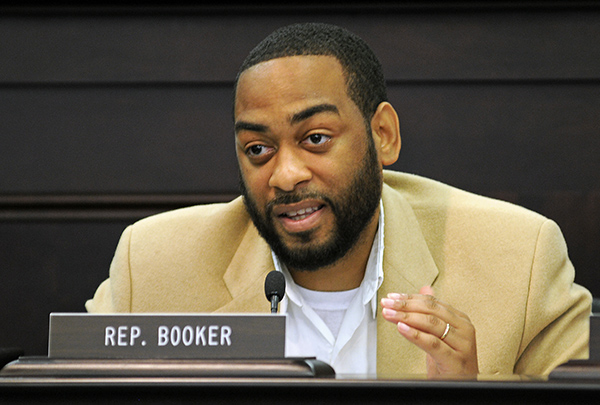 |
|
|
Rep. Charles Booker,
D-Louisville,
comments on
potential
legislation that
would allow Kentucky
courts to
temporarily limit
gun ownership by
persons deemed a
threat to themselves
or others.
(Click
here
for
a high-res photo).
|
FRANKFORT—Indiana’s
so-called “red flag law” has been on that
state’s book since 2005, but Clark County (IN)
Prosecuting Attorney Jeremy Mull says he does
not frequently use the established law in court.
“I use the law
regularly but I do not use it frequently,” Mull
told the Interim Joint Committee on Judiciary
today during a discussion on similar legislation
that may be proposed in Kentucky. “I think last
year I filed over 6,000 criminal cases in my
county, and I filed around 12 of these.”
The purpose of
Indiana’s law, says Mull, is to prevent someone
who is considered to be a safety threat from
buying or possessing firearms until their mental
state can be assessed or the issue otherwise
resolved. Three separate reviews must be met
before that can happen, said Mull: law
enforcement must find probable cause that the
person is a safety threat, a prosecutor must
file an action in court, and a judge has to find
“clear and convincing evidence” that an order is
needed.
“I am
confident that we have saved a lot of lives in
Indiana with this law and that our state is
safer because of it,” Mull told the committee.
Sitting near Mull in
the committee meeting were Sen. Paul Hornback
R-Shelbyville, and Sen. Morgan McGarvey,
D-Louisville – two Kentucky lawmakers who plan
to file bipartisan red flag legislation in the
Commonwealth. McGarvey said the legislation is
still a working draft but would likely allow law
enforcement, and possibly immediate family, to
petition the courts for an Extreme Risk
Protection Order (ERPO)—a temporary court order
to keep someone considered “an imminent and
substantial danger” to themselves or others from
buying or possessing firearms for a limited
time.
McGarvey expects the
legislation to have at least two prongs—a
petition for an ERPO and a hearing to determine
if an ERPO is necessary—and to ensure due
process.
Hornback said due
process is important to any ERPO process,
addressing concerns raised by Rep. Savannah
Maddox, R-Dry Ridge. Maddox, said taking
firearms away from someone who hasn’t committed
a crime would violate, “at a bare minimum, three
constitutional rights in the U.S. Constitution
alone.”
Hornback—who
described himself as a gun owner, hunter, and
supporter of the 2nd
Amendment—said he wants to ensure there are due
process safeguards under law but also sees a
need to improve public safety. “I think there
are ways we can work together to solve some of
the problems we have with gun violence, with
other types of violence, so that we can help
people,” he told the committee.
Several members of the
public sitting behind Hornback and McGarvey
during the meeting wore tee shirts that read
“Whitney/Strong,” the motto of the
Whitney/Strong Foundation and its founder
Whitney Austin, who appeared before the
committee. Austin founded the organization with
her husband months after she was shot 12 times
while walking into work at downtown Cincinnati’s
Fifth Third Bank building in Sept. 2018. Three
people were killed in the attack and two
injured, including Austin, before police shot
and killed the gunman.
Austin said an ERPO law
is “highly necessary” in a state like Kentucky,
which Austin said has above-average suicide
rates and an increase in mass violence.
“It is about solutions
that are bipartisan, reasonable, and effective,”
she told the committee.
Interim Joint Committee
on Judiciary Co-Chair Rep. Jason Petrie,
R-Elkton, commented later in the meeting on what
he considers to be a “faulty” vs. “legitimate”
path to limiting someone’s constitutional right
to gun ownership. He said he thinks a “mental
health component” should be part of the
discussion.
“If the issue is you
have a concern about someone, they may be
dangerous, ‘we need to take away their guns,’
that’s a faulty path,” he said. A “legitimate
pathway,” he said, would be a concern about
someone with some mental health issue being a
danger to themselves or others, and possibly not
being capable of executing their constitutional
rights.
Fellow Co-Chair Sen.
Whitney Westerfield, R-Hopkinsville, followed
Petrie’s comments by saying the issue will be
“addressed in a crucible,” adding, “That’s what
this process is for.”
As of this fall, 17
states and Washington D.C. have some type of red
flag law in statute, according to Pew Charitable
Trusts. Legislation that would have established
ERPOs under Kentucky law were filed during the
2019 Regular Session in both the House and
Senate, including Senate Bill 244 filed by
McGarvey. That bill remained in the Senate
Judiciary Committee at session’s end.
END
Nov. 19, 2019
Kentucky
changes route to comply with REAL ID
FRANKFORT – A change in how
Kentucky plans to comply with the federal REAL
ID Act will require additional legislation
during the upcoming Regular Session of the
Kentucky General Assembly.
That’s what Department of
Vehicle Regulation Commissioner Matt Henderson
told members of the Interim Joint Committee on
Transportation during their Nov. 18 meeting, the
group’s last scheduled gathering before the
opening of session on Jan. 7.
“It is
not a topic without strong opinions on both
sides, but I would like to remind everyone this
is a federal mandate,” committee Co-chair Sen.
Ernie Harris, R-Prospect, said upon hearing of
the change. “We are just trying to play catch-up
with what the feds want us to do in a limited
timeframe.”
Legislation passed in 2017 to
comply with the federal law envisioned each of
Kentucky's 120 circuit court clerks issuing the
new REAL IDs, but Harris said unforeseen
workloads stymied that plan. Circuit court
clerks have traditionally issued driver's
licenses in Kentucky.
Henderson said the new plan is
to set up 12 regional offices to issue REAL IDs
before the October 2020 deadline. That’s when
Kentucky’s traditional driver’s licenses will no
longer be accepted for commercial air travel or
to enter certain federal facilities like
military bases and the White House.
The transportation cabinet is
currently only issuing REAL IDs at its
headquarters in Franklin County. It is accepting
applications from both Franklin County residents
and neighboring Anderson County residents.
Henderson said it would soon start accepting
applications from nearby Scott County.
Henderson said the 12 regional
offices would be located in Paducah,
Madisonville, Bowling Green, Elizabethtown,
Louisville, Lexington, Florence, Somerset,
Manchester, Jackson, Prestonsburg and Morehead.
He said state officials are looking to locate
them in existing state buildings such as
transportation cabinet field offices. Henderson
said the hope is to have all 12 operating by
early next year.
Henderson said would like to
have about 28 regional offices but knew that
wasn’t feasible before the federally imposed
deadline. He added that a decision on how many
offices to open might be left to the new
administration. (Kentucky’s governor-elect will
be sworn into office on Dec. 10.)
Sen. Albert Robinson,
R-London, expressed concern that the final plan
didn’t include a regional office in Laurel
County. “I understood that was the original
intention,” Robinson said.
Sen. Stephen Meredith,
R-Leitchfield, said he preferred issuing REAL
IDs in every county. He said the regional plan
places a financial burden on rural residents who
live far away from centers of commerce.
“I still have a problem with
the fact we can’t do this in each county,”
Meredith said, “but I guess that is something we
will get into during the next legislative
session.”
Rep. Maria Sorolis,
D-Louisville, asked what the maximum distance
residents would have to travel to get a Real ID.
Henderson said the longest drive would be for
Eastern Kentucky residents. He said some
mountain residents might have over an hour-long
drive.
Rep. Chris Harris, D-Forest
Hills, asked what the new plan was costing.
Henderson estimated it would cost $16 million
annually for 28 regional offices. That prompted
Harris, who chaired the meeting, to add he was
originally told the cost would be $5 million.
Henderson said fees to get the
REAL IDs could fund the regional offices – but
that would require yet more legislation.
Sen. Jimmy Higdon, R-Lebanon,
stressed that not everyone needs a Real ID. He
said Kentucky’s traditional driver’s license
could still be used to apply for or receive
federal benefits, access health and medical
services, participate in law enforcement
investigations, operate a vehicle and vote.
“I don’t want people to panic
to think they have to have a Real ID and drive
an hour out of their way when grandma simply
doesn’t need one if she doesn’t plan to fly,”
Higdon said.
END
Nov. 19, 2019
Panel updated on
battle against fatal overdoses
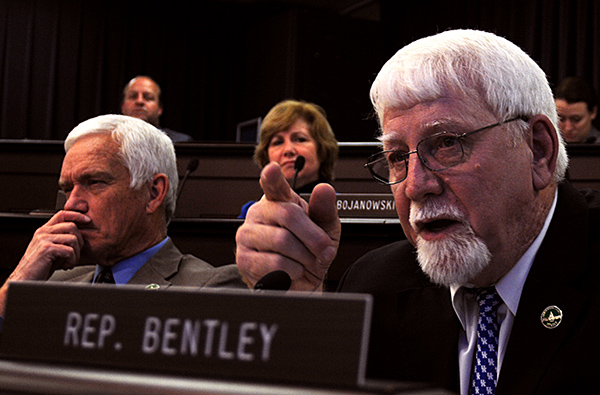 |
|
|
Rep. Danny Bentley,
R-Russell, asks
about the diversion
and prescribing of
controlled
substances in
Kentucky during
yesterday's meeting
of the Interim Joint
committee on Health,
Welfare and Family
Services.
(Click
here
for
a high-res photo).
|
FRANKFORT – Drug overdose
deaths in Kentucky decreased 15 percent last
year. That’s 233 fewer people dying.
"We were very pleased to see
233 families that did not have to go through the
pain of losing a loved one to a preventable
death," Office of Drug Control Policy Executive
Director Van Ingram said while testifying before
yesterday’s meeting of the Interim Joint
Committee on Health, Welfare and Family
Services. "We are certainly not declaring
victory. We are not celebrating, but we do feel
confident that we are moving in the right
direction."
He was among a group that
spoke about the results of numerous policy
initiatives in Kentucky to reduce the number of
drug overdose deaths. Last year’s decrease
followed years of steady increases in the death
toll, driven mostly by a rise in opioid abuse,
heroin and fentanyl.
Ingram said the 15 percent
decrease was a bright spot because the nation as
a whole saw a decrease of just under 5 percent.
He said some of the policy
initiatives include curbing the number of
controlled substances prescribed by doctors.
From 2015 to 2018, the number of opioid
analgesics dispensed in Kentucky fell by a
little over 800,000. That’s equivalent to 64
million fewer dosage units.
Dr. Doug Oyler of University
of Kentucky HealthCare testified that the
initiative had reduced opioid prescriptions by
1,300 annually just within that health care
system.
"I love hearing that some ...
of the legislative actions we have taken to
really move this conversation forward are making
a difference," said Rep. Kimberly Poore Moser,
R-Taylor Mill, co-chair of the committee, and
former director of the Northern Kentucky Office
of Drug Control Policy.
One initiative is expanding
the use of medication-assisted treatment, known
as MAT, to treat opioid use disorders. Ingram
said 1,240 doctors practicing in Kentucky have
received a federal waiver to prescribe the drug
buprenorphine, used in MAT. Ingram added,
however, that most of those doctors are treating
five or fewer patients.
Buprenorphine has also become
the No. 1 drug being diverted or given to
another person for illicit use. Ingram said that
was "tragic" but that the abuse of buprenorphine
generally doesn’t cause overdose deaths.
Rep. Robert Goforth, R-East
Bernstadt, a pharmacist by trade, asked if
Kentucky needed to pass legislation to increase
training for doctors in hopes of reducing the
diversion of the drug. Ingram said Kentucky
could require more rigorous training than the
eight-hour online course federal authorities
require before prescribing buprenorphine.
"We should look into that,"
Goforth said in response.
Ingram said arrests for
possession of heroin were down 15 percent and
arrests for trafficking heroin were down 12
percent from 2017 through March of this year. He
added that heroin deaths were down almost 54
percent during the same period.
Ingram attributed the downturn
to fentanyl from China flooding the United
States. He said the drug cartels recognized that
it was a more profitable business model to buy
chemicals from China than it is to grow opium
poppies.
"Unless the Chinese live up to
their promises and make real efforts to control
the chemical supply in that country ... fentanyl
is going to be the business model we see,"
Ingram said. "That is alarming.
He highlighted the fact that
fentanyl trafficking arrests are up 73 percent
in the state.
"There is a lot of work to be
done," Ingram said, adding that there were still
1,333 lethal overdoses last year. "That isn’t
acceptable. It’s not a number we can live with."
Ingram said the 10 counties
where people are statistically at the greatest
risk of overdosing are Madison, Clark, Kenton,
Boyd, Gallatin, Pendleton, Owen, Jefferson,
Grant and Campbell.
"As a state, we have come to
learn treatment isn’t enough," Ingram said as he
described some recent initiatives undertaken by
his office. "Transitional housing for people in
early recovery and employment support for people
in early recovery are just as important as
anything else we can do.
"People do get better, but it
doesn’t always happen on our timetable. It
happens on theirs. We want to do the things we
can to increase the odds that people stay in
recovery and continue to get better."
Rep. Danny Bentley, R-Russell,
also a pharmacist, asked Ingram about recent
court settlements against drug companies and
pharmacy chains accused of fueling the addiction
crisis.
"There is lots of blame to go
around, but there is only a small group that
profited," Ingram said.
END
November 7, 2019
State conservation cost-sharing could get a
boost
FRANKFORT—State
conservation cost share funds available for farm
soil and water conservation projects in Kentucky
could soon get a boost.
Current regulation
governing the Kentucky Soil Erosion and Water
Quality Cost Share Program limits farmers to a
75 percent cost share up to $7,500 per project,
with a higher cap of $20,000 for animal waste
projects such as manure storage structures,
Kentucky Division of Conservation Director
Paulette Akers told the Tobacco Settlement
Agreement Fund Oversight Committee yesterday.
The division intends to file a revised
regulation with the state, however, that would
set the cap at $20,000 for all conservation
practices.
The increase in the
$7,500 cap—which Akers said applies to around 53
percent of all state conservation cost-sharing
applications—would be the first in 25 years, she
said.
Projects covered by
conservation cost-sharing in addition to manure
storage structure construction are fencing,
water well protection, cropland and forest
erosion control, pasture renovation, and more.
Conservation cost share funds come from
Kentucky’s share of the 1998 national tobacco
master settlement agreement and additional state
funds, says the division.
Akers said conservation
cost-sharing is averaging the state $6 million
to $7 million per calendar year.
“We would not be able
to do this without the fabulous partnerships we
have with the conservation districts staffs, the
people on the ground who work on one on one with
the farmers and enter all of these applications
in,” said Akers.
She also credited the
Kentucky Division of Water, the federal Natural
Resources Conservation Service, and other
agencies for the regulatory change which Akers
said has received the go-ahead from the Kentucky
Soil and Water Conservation Commission, which
administers the cost share program with
assistance of local conservation districts.
Kentucky’s conservation
cost-share balance currently stands at around
$12.5 million, said Akers, although that amount
doesn’t reflect funds that have been obligated
but not spent. That includes $3 million from
fiscal year 2017, $1.8 million from fiscal year
2018, and $4.2 million in obligated funds have
yet to be spent for fiscal year 2019. That
leaves an actual balance of around $3 million,
she told the committee.
Akers said that $3
million balance may be obligated as soon as
early next year based on cost-share applications
by this year’s Dec. 15 cut-off. Approval is
based on ranking criteria and funds available,
according to the division.
“That may use that $3
million up,” she said.
Committee Co-Chair Sen.
C.B. Embry Jr., R-Morgantown, thanked Akers for
the presentation, calling it a “very thorough
presentation, very informative.”
The Division of
Conservation is part of the Department for
Natural Resources, which is part of the state
Energy and Environment Cabinet. According to the
Cabinet’s website, the division provides
assistance to the state’s 121 conservation
districts by helping “to develop, administer and
implement sound conservation programs across the
state.”
END
October 7, 2019
Kentucky’s growing
hemp industry has its challenges, lawmakers told
|
|
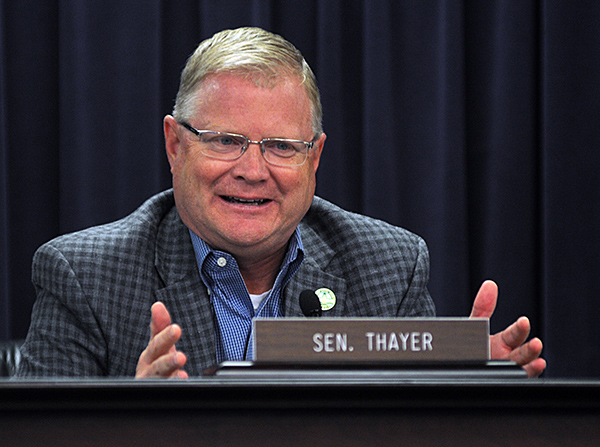 |
Senate Majority
Floor Leader Damon
Thayer,
R-Georgetown, talks
about hemp in
Kentucky at the Oct.
7 meeting of the
Interim Joint
Committee on
Agriculture.
(Click
here
for
a high-res photo).
|
FRANKFORT—Six years
ago, the Kentucky General Assembly created a
framework for production of industrial hemp. Now
the state is a hemp production leader, with
around 26,000 acres planted this year alone.
But the growth of hemp
and hemp processing in Kentucky under 2013 SB 50
and the 2014 U.S. Farm Bill has presented what
Kentucky Agriculture Commissioner Ryan Quarles
calls “growing pains,” with farmers and
processors facing some uncertainty from both
federal regulators and financial lenders.
Although the federal
government no longer classifies hemp – a type of
cannabis plant--as a controlled substance under
federal law, it still regulates the sale of
cannabis and cannabis-derived products such as
the increasingly popular CBD (or cannabidiol).
That has not changed according to the federal
Food and Drug Administration, which stated on
its website in July that only one CBD product
(the epilepsy drug Epidiolex) had been approved
by the FDA to date and that marketing of any
other CBD product for therapeutic, health or
food use is “currently illegal.”
Quarles said FDA
oversight is the top issue facing hemp growers
and processors, especially when it comes to any
“consumable end product” like CBD which is often
consumed as an edible or in drops under the
tongue.
Quarles said Kentucky
has been in talks with the FDA about hemp’s
potential as food or other additive, but that
uncertainties remain.
“We still like to
remind all of our program participants … that
this is still a crop that has risks involved,”
he told the Interim Joint Committee on
Agriculture today. “But the FDA is a very
process-oriented organization, as you know, and
so we want to make sure that they don’t regulate
this business to death, that we educate them on
the nutraceutical health care/health supplement
side of the crop as well as other areas which
are currently prohibited by law.”
Financial lending is
another challenge for the hemp industry, said
Quarles, who said a lot of banks are hesitant to
provide loans to processors and growers. That
has improved since hemp became a legal crop in
2018, but he said lenders—especially national
banking institutions—are holding back.
“We’re just trying to
figure out what issues they have,” he told
lawmakers. “A lot of these issues will have to
be resolved in Washington, D.C.”
A lack of crop
insurance options is another concern for
growers, said Quarles. A handful of the state’s
hemp growers elected for Whole Farm crop
insurance coverage this year, he said, but he
said he didn’t expect many farmers to use that
product in 2020.
Quarles said it could
take three or four years for the hemp industry
to produce the data that insurers need to
provide the type of coverage now available for
corn and soybean crops.
“They need production
data. We simply don’t have the data nationwide
to say ‘this is what an average yield is,’” he
told the committee.
Rep. Joe Graviss,
D-Versailles, said he is aware of some cash flow
and payment concerns from Kentuckians in the
hemp industry. He asked Quarles how those
concerns are being addressed, and Quarles
emphasized a need for more access to financial
lending.
“The inability of our
legal hemp companies to go into a bank and have
access to credit (is an issue,” he said. “It’s
disrupting business here in Kentucky.”
Senate Majority
Floor Leader Damon Thayer, R-Georgetown, asked
Quarles if any legislative changes regarding
hemp are needed at the state level. He mentioned
the possibility of a special legislative meeting
on hemp before the start of the 2020 session to
iron out any proposals before budget talks
consume lawmakers’ time in February and March.
“There is a lot of
bipartisan support for hemp, and we want to make
sure we are prepared to send a message to
growers and potential growers that we in
Kentucky want to stay ahead of the curve,” said
Thayer.
Nearly 1,000 Kentucky
growers had a hand in this year’s crop – a
record for hemp production since Kentucky began
licensing hemp growers and handlers under the
state’s Industrial Hemp Research Pilot Program
in 2014.
END
Oct. 3, 2019
|
|
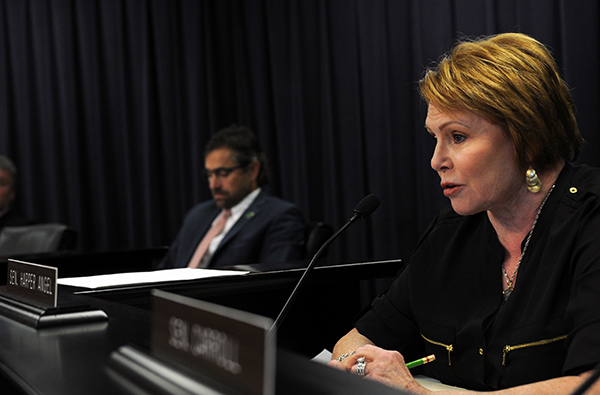 |
State Sen.
Denise Harper Angel,
D-Louisville, asks a
questions about
fixed-odds wagering
on horse races
during yesterday's
meeting of the
Interim Joint
Committee on
Licensing,
Occupations and
Administrative
Regulations. (Click
here
for
a high-res photo).
|
A new way to bet on the ponies pondered
FRANKFORT – A thoroughbred
racing think tank has asked Kentucky lawmakers
to consider allowing a new type of bet on horse
races.
Fixed-odds wagering would
allow track operators to be competitive against
the expansion of legalized sports betting in
other states, said Patrick Cummings of the
Thoroughbred Idea Foundation of Lexington. He
made the remarks during yesterday’s meeting of
the Interim Joint Committee on Licensing,
Occupations and Administrative Regulations.
This new type of wager would
allow bettors to compete against the house, or
bet taker. The house would set fixed odds on
horses that bettors could choose to lock in with
a wager. In general, sports betting on football,
basketball and other sports are made under this
model.
Cummings, a former executive
with the Hong Kong Jockey Club, said this would
be a historic shift from pari-mutuel wagering
now offered across the horse racing industry.
That’s a business model where bettors compete
against other bettors with the track removing a
percentage of the pool, known as the takeout,
before distributing the rest of the pool to
winning players. The odds change as the pool
fluctuates until the race begins.
“This
is clearly an opportunity to develop a
complementary product for racing’s existing
customers while introducing a modern form of
betting for new ones as well,” Cummings said
while explaining why pari-mutuel betting isn’t
being embraced by younger generations. “This
opportunity should be embraced with Kentucky
leading the way.”
Cummings said legislators
should consider adding a provision to allow
fixed-odds wagering on horse racing to any bill
that would legalize sports betting. Currently,
Sen. Julian M. Carroll, D-Frankfort, has
prefiled a sports betting bill.
Senate Majority Floor Leader
Damon Thayer, R-Georgetown, asked committee
Co-chair Rep. Adams Koenig, R-Erlanger, to
consider refiling a sports betting bill he
introduced last session with the addition of the
fixed-odds wagering for horses.
“I think this is an idea whose
time has come,” Thayer said of fixed-odds
wagering on horse racing. “I’m supportive of it.
And I would like to see Kentucky lead the way on
this.”
Sen. Reginald Thomas,
D-Lexington, asked what other countries had
legalized fixed-odds wagering on horse racing.
Cummings said it is legal in Australia, South
Africa, England, Ireland and likely many other
European jurisdictions.
Cummings added that many
American track operators, including Keeneland,
have business arrangements with overseas
bookmakers to offer fixed-odds wagering on
American horse races to European bettors. He
speculated that the market for fixed-odds
betting by European customers on American races
is about $1.4 billion.
In response to a question by
Rep. Buddy Wheatley, D-Covington, Cummings said
New Jersey is the only state to offer fixed-odds
wagering on horse racing. He added that legal
alternatives to fixed-odd betting in racing is
incredibly limited.
“Outside of the few days when Churchill Downs
offers their future wager via a limited
pari-mutuel pool ... American customers cannot
place a bet on the Derby until Derby or Oaks day
and they won’t know their potential return until
the betting is stopped and the race is already
underway,” Cummings said
He said the biggest threat to track operators is
offshore entities that offer fixed-odds wagering
on horse races, including the Kentucky Derby.
Cummings said one of the biggest operators
catering to American horse racing fans is based
in Costa Rica and licensed in Curacao. He said
these types of operators do not return any
portion of their profits to the thoroughbred
industry as required from legal gambling
operators.
Sen. Christian McDaniel,
R-Taylor Mill, asked where Churchill Downs and
Keeneland stood on fixed-odds wagering on horse
races.
“Churchill has not publicly
commented on the matter that I’ve been able to
assess,” Cummings said. “I’ve certainly had
conversations with Keeneland, and they certainly
seem very supportive of this concept – both from
the marketing side and certainly the business
side.”
In response to another
question from McDaniel, Cummings said Churchill
and Keeneland were not members or financial
supporters of his organization.
“Everything is privately
funded by individuals,” Cummings said of the
source of his group’s money.
Rep. Jerry T. Miller,
R-Louisville, asked whether Kentucky voters
would have to approve a constitutional amendment
to allow fixed-odds wagering on horse racing.
Koenig said he didn’t think a constitutional
amendment would be necessary but added that he
hoped to have a nationally recognized legal
expert on this type of betting testify before
the committee in December.
Carroll, a member of the
committee, asked about the taxing implications
of the proposal. Cummings said he envisioned the
take, or amount retained by the bet taker, to be
10 percent or 11 percent for brick and mortar
sports bets and 14 percent for online operators.
Thayer added that would be in line with previous
sports wagering legislation considered in
Kentucky.
Cummings said any of those
figures would be a higher take than traditional
sports bets, which are around 5 percent. He said
the higher take was necessary for horse racing
because that sport, unlike football or
basketball, is funded through wagering.
House Majority Whip Chad
McCoy, R-Bardstown, asked how the proposal would
help increase purses, or the prize money in
horse races. Cummings said the legislation would
have to be carefully crafted to protect the
interests of the industry, tracks and horsemen.
He emphasized that no percentage of wagers taken
by offshore operations benefit American purses
or horsemen.
Sen.
Denise Harper Angel, D-Louisville, expressed her
support of the proposal.
“I
think this is a great idea,” she said. “I’m the
proud senator that represents Churchill Downs,
doubly proud because my father was an owner and
trainer there for 40-plus years before moving on
to Santa Anita. We have to stay ahead of this.”
Thayer said he was happy the
proposal received a largely receptive response
from committee members.
"There are a lot of really
good questions about taxation, and horsemen and
purses,” Thayer said. “We have to be able to tax
it at a level that the customer will want to
wager ... and the operator will invest to
attract people currently making these wagers
illegally."
END
Oct. 2, 2019
Budget panel eyes
state universities’ funding model
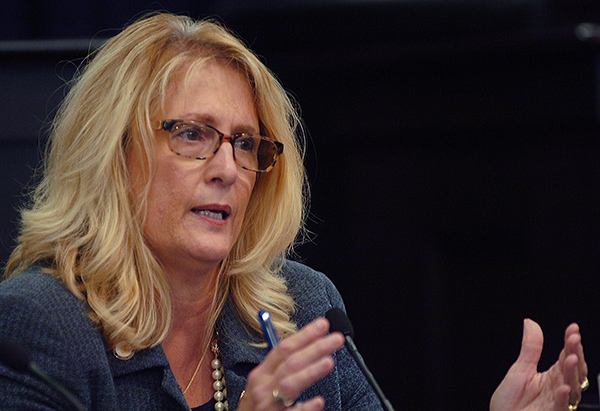 |
|
|
Sen. Robin Webb,
D-Grayson, comments
on the potential
impact of the
state’s performance
funding model for
public universities
at yesterday's
meeting of the
Interim Joint
Committee on
Appropriations and
Revenue.
(Click
here
for
a high-res photo).
|
FRANKFORT— Bachelor’s
degrees awarded at Kentucky’s public
universities increased 12 percent overall under
a performance-based funding model directed by
the 2016 General Assembly, state lawmakers were
told yesterday.
Council on
Postsecondary Education officials told members
of the Interim Joint Committee on Appropriations
and Revenue that the new funding model—based on
student success, course completion, maintenance,
and institutional and academic support—is
leading to outcomes like the 12 percent increase
in bachelor’s degree production over base-level
funding, or what CPE President Dr. Aaron
Thompson called the “sector average.”
The change occurred
over a four-year period, between academic years
2013-14 and 2017-18, said Thompson, with a
substantial increase of 27 percent of more in
the number of STEM+H (STEM degrees with a health
component) and URM degrees (underrepresented
minority) also recorded.
“If you’re at or above
sector average, you will receive some of the
funding,” said Thompson.
CPE Vice President of
Finance and Administration Dr. Bill Payne says
the new funding model is improving years of
funding disparities between universities. Six
state universities received $2,036 in state
funding per bachelor’s degree awarded in fiscal
year 2018-19, said Payne, with a seventh
(Morehead State University) close to reaching
the same performance funding level, or
“equilibrium,” he said.
There is some
concern, however, that universities could fall
off what Thompson called a “fiscal cliff,” or a
loss of more than two percent of a university’s
funding base under the model. Concern has been
specifically shown for Morehead State University
and Kentucky State University—the eighth
university in the funding model which, like
Morehead State University, now receives more
state funding per degree awarded than the other
six schools.
Payne said “some level
of new funding” from the General Assembly could
help avert potential fiscal cliffs for Morehead
State and KSU as early as 2021-2022, when
budgetary protections are phased out. Declines
in performance at any state university, he
added, could potentially be damaging if
budgetary protections aren’t in place.
“It’s not just KSU and
Morehead that could potentially face those
fiscal cliffs,” said Payne. “If a number of
institutions perform well but there was one
institution that had a decline in their
performance, that institution…could lose more
than two percent of their base funding as a
result of not having a stop loss in place.”
Pension costs and
enrollment levels at various universities also
present challenges, said Payne.
Sen. Robin Webb,
D-Grayson, asked the CPE to elaborate on the
financial challenges facing Morehead State
University, her regional university. Payne said
Morehead State is performing well and is close
to reaching equilibrium. But Thompson said the
university has had lags in enrollment and
funding, posing future challenges. That drew a
response from Webb.
“All of these
universities have their own unique challenges
and have had those since their existence,” said
Webb. “The composition of the formula now may
address some of those, may not…for that
institution.” She said protecting the identity
and mission of universities should also be
considered.
“What I hope we don’t
see is in the conforming mechanism… that they
don’t lose their identity or that we’re somehow
becoming generic performance producers,’ said
Webb.
Regarding new funding,
Interim Joint Committee on Appropriations and
Revenue Co-Chair Sen. Chris McDaniel, R-Taylor
Mill, said the next budget session will be
challenging. Medicaid expansion costs will take
at least $75 million in the next budget cycle,
he said, and more funding will be requested by
the state retirement systems. That will be
compounded by what he called “old debt” and
little, if any, state budget surplus available,
plus other costs.
“I would say most
members are not going to be keen to provide new
funding if folks don’t take control of their own
destiny,” said McDaniel.
He mentioned pensions,
and the fact that both the University of
Kentucky and University of Louisville are
utilizing retirement options through TIAA-CREF
and/or other private companies, adding that
other state universities could look at doing the
same.
“If we don’t see some
action from individual institutions to take
control of their own destinies using tools that
we’ve provided, asking for more money becomes a
very, very difficult request,” said McDaniel.
Thompson said the
universities are in the process of reducing
their Kentucky Employees Retirement System
(KERS) staff in “very respectful” ways, and the
CPE plans to have more in-depth conversations
about that.
Forty five percent of
Kentuckians currently have a postsecondary
degree or certificate, according to the CPE. The
state’s “big goal,” according to the CPE, is for
60 percent of Kentucky’s working age adults to
have a postsecondary degree or certificate by
2030.
END
Oct. 1, 2019
Measure would put the brakes on
distracted driving
FRANKFORT –A day after a
tractor-trailer driver allegedly caused a fatal
wreck while watching a video on his phone a few
miles from the Capitol, a state lawmaker said an
increase in the number of these types of
tragedies prompted him to sponsor legislation
designed to reduce distracted driving.
Rep. James Tipton,
R-Taylorsville, made the comment while
presenting the measure, known as Bill Request
166, during yesterday’s meeting of the Interim
Joint Committee on Transportation. It is
co-sponsored by Rep. Steve Sheldon, R-Bowling
Green.
BR 166, dubbed the hands-free
law, would ban drivers from using mobile phones,
tablets, laptop computers and other personal
communication devices. The law would carve out
exceptions for voice-activated programs such as
GPS navigation and hands-free calling. BR 166
would also prohibit drivers from watching,
recording or broadcasting videos.
“Hands-free laws give law
enforcement and the public a clear
interpretation of the law,” said Jennifer Smith
of Stopdistractions.org, who testified in
support of BR 166. “If the phone is in your
hand, then you are in violation. No more grey
areas or loopholes. This law makes enforcement
easy and possible.”
Kentucky’s current law
prohibits drivers from texting while in motion.
Smith said 20 states currently
have hands-free laws. In Tennessee, Smith said a
poll found 91 percent of residents supported
hands-free legislation when it was passed last
year. In Georgia, Smith said that the law was
credited with decreasing traffic fatalities by
3.4 percent in the first year after its passage.
That was the largest decrease Georgia had seen
in a decade.
While drivers were talking on
their phones less, an Insurance Institute for
Highway Safety study shared with the committee
found drivers were interacting with their phone
more. Drivers were observed manipulating their
phones 57 percent more than they were in 2014,
according to the study. That includes texting,
browsing and even playing games.
“There is also a new group of
drivers behind the wheel,” Smith said. “They are
called cellphone addicts. These cellphone
addicts are on the phone 28 percent of the time
they are driving, actively ignoring the road.”
Louisville Metro Police Lt.
Arnold Rivera, commander of the department’s
traffic unit, testified that he supported
measures to make Kentucky’s roadways safer for
motorists and law enforcement.
“There isn’t a day, or shift,
that goes by where I don’t see drivers texting
when they shouldn’t be,” he said.
Carl Breeding of the American
Property and Casualty Insurers Association said
BR 166 would also save Kentuckians on their auto
insurance premiums. He said over several decades
auto accident rates had been slowly but steadily
declining, offsetting slightly increased
accident severity
“That has helped to keep car
insurance rates relatively stable,” he said.
“But starting in 2013, there was a sharp
increase in accidents with the roads becoming
increasingly dangerous – we believe in large
part because of distracted driving.”
Rep. Maria Sorolis,
D-Louisville, asked if listening to audiobooks
would be prohibited under BR 166.
“There is no provision against
listening,” Tipton said. “The main gist of this
law is not to have a device in your hand.”
After hearing the testimony,
committee Co-chair Rep. Ken Upchurch,
R-Monticello, said distracted driving was
“something that we need to address.”
He then asked what the fines
would be for violating the proposed law. Tipton
said the fine would be $100 for the first
offense and $200 for any subsequent offense. He
also noted the BR 166 would allow first-time
offenders to attend state traffic school.
“This is not meant to be a
money raiser for communities or the state,”
Tipton said, “but you do have to have enough
enforcement to make people aware of the issue.”
END
September 18, 2019
General Assembly’s 2020 session to begin
Jan. 7
FRANKFORT – The
schedule for the 2020 Regular Session of the
Kentucky General Assembly was approved today by
legislative leaders.
The session is
scheduled to convene on Jan. 7 and adjourn April
15. It is expected to last 60 legislative days –
the maximum allowed by the state constitution in
even-numbered years.
Lawmakers will not
convene on Jan. 20 in observance of Martin
Luther King, Jr. Day or on Feb. 17 in observance
of Presidents’ Day.
March 2 will be the
final day that House bills can be introduced and
March 3 will be the final day for the
introduction of Senate bills. Bills that have
been introduced by these deadlines will be able
to continue moving through the legislative
process until the session adjourns.
The veto recess – the
period of time in which lawmakers return to
their home districts to await possible
gubernatorial vetoes of legislation – will run
from April 2-13. Lawmakers will return to the
Capitol on April 14 and 15 for the final two
days of the session.
--END--
Sept.
13, 2019
Lawmakers look at opioid abuse’s impact on
workforce
FRANKFORT –Overcoming Kentucky’s opioid epidemic
is a key to addressing the state’s low rate of
workforce participation, lawmakers were told
during yesterday’s meeting of the General
Assembly’s Economic Development and Workforce
Investment Committee.
“I think years ago we would have looked at this
(opioid) problem mostly as a public health
crises in need of a public health solution,”
said
Kate Shanks, Vice
President of Policy Development for the Kentucky
Chamber of Commerce.
“Today we really understand that one of the
biggest issues facing the business community is
workforce participation, finding the workers
needed for the jobs of today and in the future.
We know one of the reasons for that is addiction
and incarceration which is oftentimes associated
with addiction.”
Shanks said Kentucky’s business community has
organized efforts to provide resources for
employers dealing with workforce participation
challenges while also asking which ones are
willing to be “second-chance employers” that
work with treatment centers to provide
opportunities for those coming out of recovery.
“One of the first things you do when you come
out of treatment and you are in recovery is you
look for a job,” Shanks said. “We’re working
with our business community to identify those
employers that are willing and able to hire
those individuals.”
A report released in
June by the Opioid Response Program, a
partnership between private and public entities,
states that Kentucky’s workforce participation
rate is ranked 47th
in the nation.
“We hear constantly from our members that their
biggest struggle is finding workers,” Shanks
said. “This is not a new problem. We’ve been
hearing it for years. We have one of the
lowest-ranked participation rates in the nation.
“We have seen
tremendous economic growth. We have set records
on exports, on investments, on new jobs in the
commonwealth. (But) we will not realize our true
economic potential if we are not tackling the
workforce participation problem in Kentucky.”
Workers who abuse opioids miss an average of 29
days of work annually, said Jennifer Hancock,
President and CEO of Volunteers of America
Mid-States. By 2020, mental and substance abuse
disorders are expected to surpass all physical
diseases as a major cause of disability
worldwide, she added.
Sen. Reginald Thomas, D-Lexington, asked Shanks
for feedback on two of his priorities for
dealing with the state’s low rate of workforce
participation: increasing the wages of Kentucky
workers and investing more in education,
particularly higher education.
“We’ve got 250,000 jobs that go unmet in this
state because people don’t have the skills to
meet those jobs,” Thomas said. “If we got them
education and training, they could meet those
jobs and have a decent living and not be subject
to the grips of the opioid epidemic.”
Shanks agreed that “we do need to emphasize
education investment in the commonwealth.” On
the topic of wage increases, she said “we think
wage growth (through economic growth) is
important in the commonwealth. We do have
concerns with mandated increases in the minimum
wage above the federal (level.)”
Rep. Chris Freeland, R-Benton, asked whether
businesses are offered incentives to participate
in programs that promote “second chance”
employment for workers in recovery.
“I don’t think there are specific incentives in
the sense of traditional tax incentives that we
sometimes think of,” Shanks said. “I think the
incentive is the willingness and the desire of
business leaders to help with this problem and
also to have a workforce. And I’ve heard so many
of them anecdotally say these are some of the
best workers they have because (second chance
workers) are so appreciative of being here.”
--END-
Nov. 13, 2019
Panel studies
future of lawmakers’ pensions
FRANKFORT – A
proposed bill to phase out the Legislators’
Retirement Plan was given its first public
hearing this week.
“This, if it is ultimately passed, will be the
beginning of the end of the legislative
retirement plan,” said Rep. James Tipton,
R-Taylorsville, while presenting the proposed
measure to yesterday’s meeting of the Interim
Joint Committee on State Government. “That is my
goal.”
The proposed legislation would not affect
members of the County Employees Retirement
System, State Police Retirement System,
Teachers’ Retirement System, Judicial Retirement
Plan or other members of the Kentucky Employee
Retirement System, commonly referred to as KERS.
“It would only impact current and future
legislators,” Tipton emphasized.
Currently, legislators have a choice of
participating in the Legislators’ Retirement
Plan, known by the acronym LRP, or the KERS
non-hazardous plan. Tipton's proposal would
“effectively close” the LRP to any legislator
taking office after July of next year. It would
also allow future legislators to opt-out of the
KERS non-hazardous plan.
Legislators who took office after 2013 would be
transferred to the KERS non-hazardous plan in
December of next year unless they opted out of
the retirement system entirely.
Tipton said a downside to the proposed
legislation is the KERS non-hazardous plan has a
higher employer contribution rate, but an upside
is that such a change would benefit the KERS
non-hazardous by adding members to the plan.
“The KERS non-hazardous is currently funded at
12.9 percent,” Tipton said in reference to its
underfunding. “It needs every dollar it can
get.”
Legislators who took office before 2014 would
not be forcibly removed from LRP, Tipton said.
Those legacy participants would, however, have
an option to transfer to the KERS non-hazardous
plan or stop participating in the retirement
system.
The proposed legislation would also prohibit the
General Assembly from funding the LRP until it
has a funding level that is equivalent or less
than KERS.
“Why should we be funding our system when we
have a system out there funded at 12.9 percent?”
Tipton said.
Rep. Jerry T. Miller, R-Louisville, said the
last provision of the proposed legislation to
freeze the LRP funding has “been close to his
heart for a while.” Miller, who chaired the
meeting, added that he endorsed that provision
“wholeheartedly.”
Majority Floor Leader Sen. Damon Thayer,
R-Georgetown, said he supported another
provision that would “repeal the spiking
initiative that allows former legislators to
spike their pension by going to the executive or
judicial branch.”
Thayer said he appreciated the comprehensive
approach Tipton took in drafting the proposed
legislation but that it doesn’t address the
underlying problem facing Kentucky’s public
pensions.
“If we pass a bill like this, I think the public
needs to understand that it will make a lot of
people feel better, but it will not make a
material change in the unfunded liability for
our pensions,” he said.
Rep. Derrick Graham, D-Frankfort, and Rep. Joe
Graviss, D-Versailles, expressed concern the
proposed legislation could jeopardize the
inviolable contract. That refers to language
within state law that guarantees some pension
recipients and public employees get the benefits
promised when they were hired.
Sen. Dan. “Malano” Seum, R-Fairdale, said he was
concerned that reducing legislators’ benefits
would discourage “blue-collar” Kentuckians from
running for a seat in the General Assembly. He
said someone who isn’t rich might not have the
financial means to put in the time required of
legislators. He added that eliminating the LRP
could exasperate the financial strain for some.
“That is one of the questions that have come up
about recruiting well-qualified candidates to
run for the general assembly,” Tipton said in
response. “Everyone knows this is not a
part-time job. I’ve gone home and put out hay at
night after session in the dark because my cows
were hungry.”
Tipton emphasized that future legislators would
still have the option to participate in the KERS
non-hazardous plan.
END
Sept. 13, 2019
Bail reform may be on 2020 General Assembly
agenda
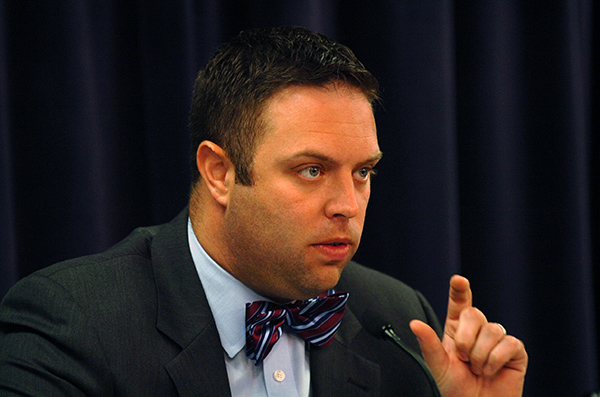 |
|
|
Interim
Joint Committee on
Local Government
Co-Chair Rep.
Michael Meredith,
R-Oakland, asks
officials about
issues currently
impacting county
jails.
(Click
here
for
a high-res photo).
|
FRANKFORT—Bail reform
has captured the attention of some high-ranking
members of the General Assembly who are calling
for potential action on the issue during the
2020 annual legislative session.
Senate Majority Floor
Leader Damon Thayer, R-Georgetown, told the
Interim Joint Committee on Local Government
yesterday that the General Assembly needs to
have a “serious discussion” about reforming the
state’s system of holding those accused of
crimes in jail pending payment of financial
bail.
“I believe we can save
a lot of money. I believe also we have to look
at people’s rights –innocent before proven
guilty—and we need to take a serious look at it
and potentially act on it in 2020,” said Thayer.
His comment came after
remarks made by Senate Minority Floor Leader
Morgan McGarvey, D-Louisville, that many
low-risk pretrial defendants are being held in
county jails because they cannot make bail.
Twenty percent of people arraigned for a crime
in Kentucky stay in jail because they can’t
afford bail by some estimates, McGarvey told the
committee.
A defendant in Mercer
County was held in jail for 18 days on a public
intoxication charge because he couldn’t make
bail, McGarvey said.
“The state
spent more money to keep him in jail than the
fine he was ultimately charged for pleading
guilty. So we need to talk about some of these
kinds of stories,” he said.
The discussion followed
testimony by state officials, representatives
from the Kentucky Jailers Association, and
testimony from Campbell County Judge/Executive
Steve Pendery on issues affecting county jails.
The testimony comes amid increased attention to
jail and prison incarceration by state
lawmakers, state Executive Branch officials, and
the media.
Most of Campbell
County’s net spending “by far” goes to its jail,
said Pendery. He said the county’s jail costs
comprise a third of his county’s $45 million
annual budget, with around $6 million in net
jail spending. Overall, he said the county
spends more on its jail than any other
department. The costs also outdo the county’s
pension obligation for now, said Pendery.
Local Government
Committee Co-Chair Rep. Michael Meredith,
R-Oakland, said the General Assembly has either
considered or passed some kind of criminal
justice reform nearly every year since he was
first elected to the House in 2010. He commented
on counties’ rising jail and other costs.
“If you look at county
government today anywhere across the state, I
think what you’re going to find is that the
pension cost and the jail cost are the vast
majority of the budget that you all have, not
the other services that you provide to your
community,” Meredith said.
Pendery agreed.
“Absolutely right. And the average citizen ought
to be pretty upset about that, when we’re
spending more on those two categories than we
spend on police (or) public transit, or the
entire gamut of public services.”
Oldham County Jailer
and KJA Vice President Mike Simpson suggested
that education of the general public on issues
facing county jails and their inmates—around
half of which are state inmates housed by jails
on a state per diem of $31.34 a day—could be in
order. Issues like drug addiction, which
afflicts a large percentage of jail inmates,
also affects a large number of Kentuckians, he
said.
“They should care,
because they are directly affected by this
unbelievable epidemic that we are facing,” he
told the committee.
Two bills proposing
monetary bail reform were filed during the 2019
Regular Session. They remained in committee at
session’s end.
END
Sept. 9, 2019
Lawmakers hear positive news for dairy farmers
|
|
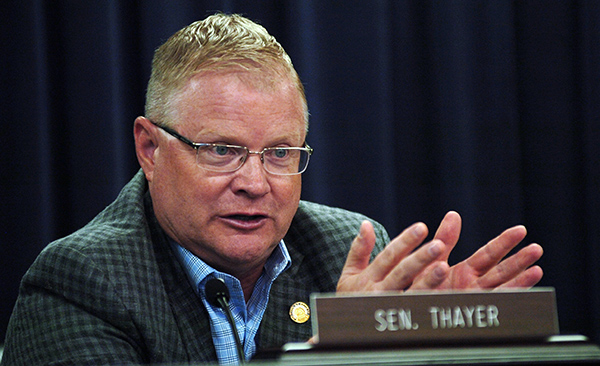 |
Senate
Majority Floor
Leader Damon Thayer,
R-Georgetown, speaks
about opportunities
for growth in
Kentucky’s dairy
industry.
(Click
here
for
a high-res photo).
|
FRANKFORT— Market
changes were at play when Kentucky lost 66
percent of its dairy farmers between 2005 and
2018 at the same time the state’s milk
production increased by 43 percent, dairy
industry experts say.
Today, one of those
experts said market changes will likely be what
helps to revive the state’s dairy industry.
Kentucky Dairy
Development Council Executive Director and
lifelong dairy farmer H.H. Barlow told the
Industry Joint Committee on Agriculture that a
sluggish milk supply nationally combined with
growth in out-of-state dairy processing could
mean new in-state opportunities for Kentucky
dairies.
A massive new cheese
plant coming on line in Michigan next year will
take much of the out-of-state milk that’s been
coming into Kentucky, Barlow predicts, giving
Kentucky dairies a better chance to sell and
process their milk at home.
“I think there’s going
to be a real opportunity for the milk market in
Kentucky to open up for Kentucky products,” said
Barlow. “I think we can honestly say that you’ll
be buying local milk as we go down the road, and
that’s very important.”
Kentucky dairy
farmers will also have opportunities to focus on
developing more value-added products, including
cheese, cheese powders (used in snack foods and
other products), protein drinks, and other
products, said Barlow. Cheese, he said, is
today’s
dairy “star”
while bottled, or “fluid,” milk only accounts
for 40 percent of today’s dairy consumption.
Development of
products that combine milk and bourbon was also
suggested by Barlow, with
Senate
Majority Floor Leader Damon Thayer,
R-Georgetown, responding that bourbon cream—a
liqueur consisting mostly of cream and Kentucky
bourbon—is now marketed by a handful of Kentucky
companies. Barlow said he doesn’t know where the
companies source their cream but he would like
to find out.
Thayer said he believes
there is growth potential for the bourbon cream
product.
“There are only a
couple of bourbon makers out there that have the
(product), and it would seem to me that there is
tremendous room in that market,” he said. “And
it would also seem to make sense that they would
want to source it locally near where the bourbon
is distilled. Obviously that would cut down on
transportation costs.”
Regarding dairy
pricing, Rep. Wilson Stone, D-Scottsville, asked
Barlow if there is a way to ensure that farmers
selling milk for cheese received a “cheese
price” instead of being paid according to fluid
milk pricing. Barlow said the issue is
“extremely complicated.”
Barlow said the
southern U.S. has historically and largely been
under federal order for pricing for fluid milk
processing while the rest of the nation has been
under federal order pricing for “product”
processing, or pricing for the proteins used to
make cheese and other dairy-based products.
“We are interested in
federal order hearings to try and change that
pricing system to bring back more value to the
protein side,” Barlow said. “We’re trying to
address it.”
Senate President Pro
Tem David P. Givens, R-Greensburg, a farmer and
farm supplier who represents Barlow in the
Kentucky Senate, said one challenge facing KDDC
and other agriculture groups is a growing
disconnect between consumers and the farm.
“When we get to the
space where we have a whole generation of
separation from the farm … we’re moving toward
where agriculture is not known; it’s simply not
a reality in the minds of a lot of folks once we
get to that place,” said Givens. He asked Barlow
what he sees as KDDC’s role, if any, in bridging
that type of separation.
Barlow said educating
the public about farming and agriculture is a
challenge that KDDC and other like-minded groups
must accept.
“We’ve got to be more
noisy,” he said. “We’ve got to tell our story.”
END
Sept. 4,
2019
Lawmakers asked to look ahead at early childhood
funding
|
|
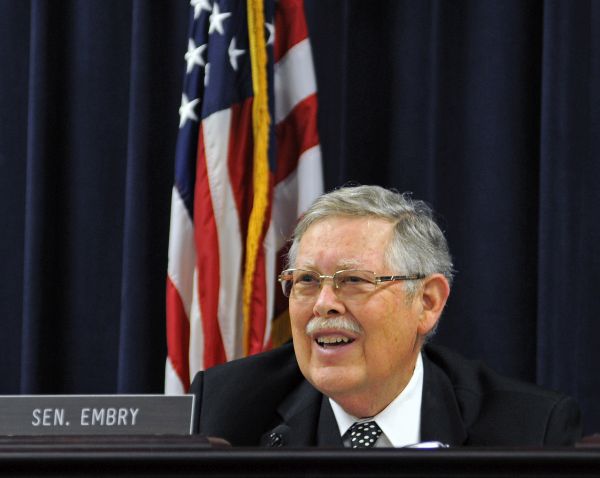 |
Tobacco
Settlement Agreement
Fund Oversight
Committee Co-Chair
Sen. C.B. Embry Jr.,
R-Morgantown, asks a
question about early
childhood investment
in Kentucky.
(Click
here
for
a high-res photo).
|
FRANKFORT—Over $29
million of Kentucky’s share of a national
tobacco settlement went toward early childhood
programs last fiscal year, state lawmakers were
told today. But early childhood experts shared
concerns that funding could lag in the future.
Prichard Committee for
Academic Excellence Executive Director Brigitte
Blom Ramsey says current economic estimates
project “steep” declines in tobacco settlement
dollars in future years, with Kentucky’s share
of the settlement dropping from $111.3 million
this fiscal year to $98.1 million in Fiscal Year
2024 largely due to changes in the tobacco
industry.
“Our concern is that
those are naturally a dwindling source of
revenue for the state.
As smoking
decreases and the sale of tobacco products
decrease, those dollars will also decrease,”
Ramsey said. She encouraged the Tobacco
Settlement Agreement Fund Oversight Committee
and the Kentucky General Assembly to look at
ways to continue investment in early childhood
programs in future years.
“Not just through
tobacco settlement but also to fill the gap as
tobacco settlement declines, and to increase
investment across the board,” she told
lawmakers.
Ramsey expressed
concern with data from American Community Survey
that shows Kentucky fell to 41st
in preschool enrollment of three- and
four-year-olds between 2008 and 2018. The state
ranked 24th
in 2008, per the survey.
She said increased
investment across the board can help the state
“raise that preschool enrollment number back to
the 20s” and encourage better education and
workforce outcomes later in life.
And tobacco settlement
dollars are the only state funds used as a
required match for the federal Child Care
Development Block Grant that funds a majority of
Kentucky Division of Child Care programs,
division Director Dr. Sarah Vanover told the
committee. Programs include child care facility
monitoring and issuing quality ratings for
centers statewide.
The required state
match for the block grant last year was $8.98
million, Vanover said.
“The tobacco settlement
dollars are our entire match,” she told the
committee. “We use those to leverage a huge
amount of annual allocations” ranging from child
care subsidies for over 47,000 children last
fiscal year to monitoring of more than 2,200
child care facilities, she added.
Tobacco Settlement
Agreement Fund Oversight Committee Co-Chair Sen.
C.B. Embry Jr., R-Morgantown, asked Vanover what
percentage of child care facilities monitored by
the Division of Child Care serve low-income
children. She said a “vast majority” -- 2,067
licensed, certified centers -- qualify to serve
children in the subsidy program, but
participation varies.
“We currently cover
up to the 40th
percentile of centers through the child care
subsidy program,” she said. “So at 40 percent of
the centers in Kentucky, we can cover up the
maximum – the entire amount of tuition. Sixty
percent of the centers would have some overage;
maybe it’s just $15 and week, maybe it’s $20 a
week (the parents would have to pay).”
The 2000 Kentucky
General Assembly recognized the importance of
early childhood learning when it created KIDS
NOW (Kentucky Invests in Developing Success NOW)
and dedicated 25 percent of the state’s tobacco
settlement dollars to the initiative, said
Ramsey. Key priorities in that legislation –
including supports for high quality child care
and voluntary statewide home visits for
first-time parents – among other investments are
still important today, she said.
“There’s still much to
be done if Kentucky is truly going to be
committed to ensuring that each and every one of
our youngsters benefit from a high-quality
learning environment that positions them for
success in kindergarten, throughout their years
of schooling, and into the workforce,” said
Ramsey.
END
Aug. 21,
2019
Legislative
panel studies access and affordability to
insulin
|
|
 |
Sen.
Brandon Smith,
R-Hazard, asks if
manufacturer coupons
for insulin are
available to
diabetics during
August's
meeting of the
Interim Joint
Committee on Banking
and Insurance.
(Click
here
for
a high-res photo).
|
FRANKFORT – Ashamed, Angie
Summers suffered in silence as she self-rationed
her insulin. She couldn’t afford the amount
prescribed to control her Type 2 diabetes –
despite having employer-provided health
insurance.
First, a condition called
neuropathy caused stinging, burning and stabbing
pains in Summers’ feet. That led to a
complication called Charcot, where the bones and
joints of her right foot started breaking.
Ultimately, she had to have her right leg
amputated just below the knee.
Now she has gastroparesis,
where her stomach cannot empty itself of food in
a normal fashion.
“I will not be silent anymore
because other people need to know that they
don’t have to be silent either,” Summers said
while testifying before today’s meeting of the
Interim Joint Committee on Banking and
Insurance. “Diabetes, whether Type 1 or Type 2,
should not be a death sentence.”
Gary Dougherty of the American
Diabetes Association (ADA) testified that
Summers isn’t alone in her struggle.
“Using less than the
prescribed amount of insulin can result in
uncontrolled glucose levels which can lead to
damage to one’s eyes, kidneys and heart,” he
said. “Ultimately, without enough insulin,
diabetic ketoacidosis can occur. If untreated,
it can lead to diabetic coma – or even death.
In Kentucky 567,000 residents,
or just over 15 percent of the state’s adult
population, have diabetes, Dougherty said. Of
those, an estimated 108,000 have diabetes but
don’t know it. Another 1.16 million, or 35
percent of the adult population, have
prediabetes. He added that every year an
estimated 130,000 Kentuckians are diagnosed with
diabetes.
People with diabetes have
medical expenses approximately 2.3 times higher
than those who do not have diabetes, Dougherty
said. In Kentucky, the total direct medical
expense for diagnosed diabetes was estimated at
3.6 billion in 2017. Another 1.6 billion was
spent on indirect costs from lost productivity
due to diabetes.
Dougherty said the problem had
gotten so acute that states started taking
action in place of Congress. He said the average
price of insulin nearly tripled between 2002 and
2013.
During the General Assembly’s
last regular session, Rep. Danny Bentley,
R-Russell, introduced House Bill 502 to address
the rising price of insulin. Dougherty said the
ADA supported provisions of the bill concerning
price transparency from drug manufacturers and
third-party administrators of prescription drug
programs, commonly referred to as PBMs. The ADA,
however, recommended additional provisions be
added to include other key players in the supply
chain including health insurers and pharmacies.
In May, Colorado became the
first state to cap copays for insulin at $100
per month, Dougherty said. Colorado’s law also
directed the state’s attorney general to
investigate insulin pricing.
In June, Bentley prefiled
legislation, known as Bill Request 105, that is
similar to the Colorado law. Dougherty said it
would cap the insulin copay at $100 per month
but not instruct Kentucky’s attorney general to
investigate insulin pricing.
Dougherty said the ADA was
aware of similarly proposed legislation in 17
states including Illinois, Maryland, Michigan,
New York and Wisconsin.
Stewart Perry of the National
Diabetes Volunteer Leadership Council testified
that he would like Kentucky to do more than pass
transparency laws.
“If you pass a bill for
transparency and all it does is tell you who you
think might be hosing you, it makes no sense,”
he said. “If you pass a bill that is going to
make meaningful changes to the supply chain, it
does.
“If we are going to pass
transparency legislation, let’s figure out how
it is going to lower consumer costs.”
Sen. Christian McDaniel,
R-Taylor Mill, expressed concern the Colorado
law shifted the cost burden to that state’s
taxpayers without addressing rising prices of
insulin. Dougherty responded that as Colorado’s
law is implemented, advocates like him could
study the results to draft better legislation in
other states like Kentucky.
“It’s not a perfect solution,”
Dougherty said of the Colorado law. “It is a
response to the issue, and I think it is
probably an evolving response.”
Sen. Brandon Smith, R-Hazard,
asked if manufacturer’s coupons were available
for insulin. Dougherty said the problem was the
discounts don't count towards people’s
deductible, copay or coinsurance.
Sen. Reginald Thomas,
D-Lexington, said he was considering legislation
that would allow people to count the costs of
services they receive at community health
centers to go toward their health care
deductible.
No one representing drug
manufacturers, PBMs or health insurers testified
before the committee.
Summers finished her testimony
with this statement to committee members:
“More than 100 million people
are living with the effects of diabetes. You
know someone who has diabetes. If you are smart
... you are praying they can afford their
insulin because if they can’t they are not going
to ask for help. They don’t want to be a burden
because it is not one month. It is every month.
It is not one time. It is the rest of their
lives.”
END
August 21, 2019
Public pensions will benefit from FY 2019 state
surplus, panel told
|
|
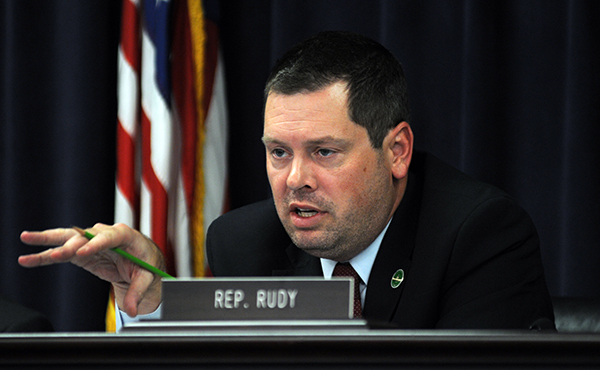 |
Interim Joint
Committee on
Appropriations and
Revenue Co-Chair
Rep. Steven Rudy,
R-Paducah, comments
on testimony by
state budget
officials.
(Click
here
for
a high-res photo).
|
FRANKFORT—Kentucky’s $130.1 million General Fund
surplus from last fiscal year will go toward the
state’s ailing public pension systems, state
budget officials told lawmakers yesterday.
Deputy State Budget
Director Kevin Cardwell told the Interim Joint
Committee on Appropriations and Revenue that $70
million of the surplus has been appropriated to
bolster the medical insurance fund under the
Teachers’ Retirement System in Fiscal Year (FY)
2020. The remaining $60.1 million, he said, has
been appropriated in FY 2020 to help pay down
the unfunded liability of the Kentucky Employees
Retirement System nonhazardous pension
fund—currently the state’s most underfunded
public pension plan.
The appropriations were
made by the 2018 Kentucky General Assembly with
the passage of 2018 House Bill 200, which
contains the 2018-2020 state Executive Branch
budget bill.
The $130.1 million
comes from $194.5 million in General Fund
revenues received in excess of estimated
revenues for FY 2019, according to Cardwell, who
said the surplus and revenue excess “are never
the same.” Other dedicated revenues and/or
necessary expenses were taken from the revenue
excess before a surplus was declared.
Governor’s Office of
Economic Analysis Deputy Executive Director Greg
Harkenrider told the committee that a more
robust-than-expected economy, tax changes, and a
“very strong fourth quarter of FY 19” all
receive some credit for the $194.5 million in
excess revenue. He also credited a revenue
excess of $119.8 million in FY 2018 for helping
reach that over $194 million mark.
“A good part of it is
the $119.8 million in FY 18,” said Harkenrider.
”That lowered the growth needed to hit the FY
2019 estimate.”
Preliminary planning
for FY 2020 and the next four fiscal years shows
what Harkenrider called “kind of tepid growth”
in the state’s General Fund. The independent
Consensus Forecasting Group, or CFG—which issues
official revenue estimates to help the state
finish the biennial budget process—is
anticipating much less robust future General
Fund growth than the 5.1 percent growth realized
in FY 2019, said Harkenrider.
Although the CFG’s
official revenue estimates will come in
December, Harkenrider said the group’s planning
estimates from Aug. 9 show growth of only 1.5
percent for FY 2020 and 2.2 percent for FY 2021,
with relatively flat growth through FY 2024.
That’s in comparison to
what State Budget Director John E. Chilton calls
an economy that has “been doing pretty well” the
past two years.
“This information that
we’ve got from the Consensus Forecasting Group
indicates that the growth is going to moderate
over the next few years,” said Chilton, added
that the CFG’s view is “consistent” with what
other states are expected to face.
“The growth will be
somewhere around the 2 percent that we’ve
discussed,” he told lawmakers.
Also discussed were
certain revenue sources and other funds,
including the state Road Fund for transportation
needs and the state Budget Reserve Trust Fund or
“rainy day fund,” which shores up the state
budget. Cardwell told lawmakers that the rainy
day fund balance was $129.1 million at the end
of FY 2019, and could be as large as $306
million this fiscal year depending on certain
factors.
Rep. Jason Nemes,
R-Louisville, asked Chilton how projected growth
in Kentucky’s rainy day fund for FY 2020
compares with other states. The State Budget
Director said Kentucky’s budget reserves are not
expected to meet the level that most states try
to reach or to maintain.
“The target for many is
5.5 percent (of a state’s General Fund). That
would be around $750 million in Kentucky,” said
Chilton. “Some are higher, actually, and I think
that the states around us are probably a little
bit better off that we are in that regard.”
END
July 24,
2019
Public pension
relief passed in special session
FRANKFORT—Five options
for over 100 quasi-governmental agencies in
Kentucky to get a handle on their rising pension
costs have been passed by the Kentucky General
Assembly in a five-day special session.
The options found in
House Bill 1 would allow the state’s
approximately 118 quasi-governmental
agencies—including local health departments,
regional state-supported universities and
community colleges, domestic violence shelters
and others –to keep their employees in the
Kentucky Employees Retirement Systems (KERS)
nonhazardous plan at increased costs, or move
all or a portion of their employees to an
alternative retirement program. Agencies that
leave KERS would have to pay their unfunded
liabilities, which are earned but yet-unfunded
benefits, in either a lump sum or in
installments over 30 years.
The bill was approved
on a 27-11 vote in the Senate today after
passing the House by a vote of 52-46 on Monday.
It is expected to be signed into law by Gov.
Matt Bevin in the State Capitol Rotunda at 2
p.m. this afternoon.
HB 1 sponsor Rep. James
Tipton, R-Taylorsville, said during Monday’s
House floor debate on HB 1 that Kentucky’s
quasi-governmental agencies provide essential
services that are at financial risk without
passage of the legislation. He said the KERS
nonhazardous plan currently has only 12.9
percent of the funds it needs to pay future
benefits.
“And, while
legally these quasi entities have a legal
obligation to pay … we understand the
difficulties they have and the problems that
might arise without passage of legislation that
might provide them some relief,” Tipton told the
House.
Sen. Christian
McDaniel, R-Taylor Mill, who is chair of the
Senate Appropriations & Revenue Committee, also
spoke in support of the bill.
“House Bill 1 addresses
the issues confronting some of the agencies that
provide critical services on behalf of the
commonwealth in every community in our state, be
it regional universities, public health
departments, rape crisis centers, mental health
agencies. They all provide services that are the
foundation or safety net for so many in our
society.”
“If we want to continue
to have a great university system, if we want to
continue to have social service safety nets ...
these are the actions we must take at this
particular time in history,” McDaniel said.
The cost of
implementing HB 1 is projected to potentially be
$58.5 million in fiscal year 2021 and $110.5
million in fiscal year 2022, according to a
fiscal note attached to HB 1. Included in the
cost is the rate freeze, the employer cost to
leave the KERS plan, and continued state General
Fund appropriations of around $50.2 million per
year.
HB 1 would work by
extending the one-year freeze on employer
retirement contribution rates for
quasi-governmental agencies in the KERS
non-hazardous plan into fiscal year 2019-2020
while giving agencies the choice to remain in
the KERS plan or to voluntarily leave the plan
as of that date. Agencies would have between
April 1, 2020 and May 1, 2020 to file a
resolution stating their intention to stop
participating in plan.
Agencies that choose to
leave the KERS nonhazardous plan would be
required to set up a new defined-contribution,
401(k)-type retirement plan for their employees
and pay their unfunded liabilities to KERS.
Agencies that remain in KERS would have to pay
the full actuarial cost of that decision as
determined by system actuaries in accordance
with HB 1. Agencies could also allow current
defined-benefit employees hired before 2014 to
remain in KERS by paying the full actuarial
cost.
Employees now in the
KERS nonhazardous defined-benefit plan who are
moved to a new plan would retain their earned
benefits, but would not be eligible for a
defined-benefit plan under HB 1.
Tipton credited a 2015
law allowing certain quasi-governmental
employers in KERS and CERS to be voluntarily or
involuntarily removed from the state pension
system as the basis for HB 1. That legislation,
2015 HB 62 sponsored by then-State Rep. Brent
Yonts, D-Greenville, requires employers to pay
their unfunded liabilities to the system by lump
sum or installment.
Unlike the 2015 law, HB
1 would not impact CERS and includes some other
differences.
House State Government
Committee Chair Jerry T. Miller, R-Louisville,
told the House before it voted on the bill that
HB 1 “gives options to avoid layoffs, to avoid
bankruptcies.” He challenged an assertion made
by some opponents to HB 1 that the bill violates
what is known as the “inviolable contract”—
language in state law that many say guarantees
public pension benefits earned.
Miller said officials
with the Kentucky Retirement Systems did not see
HB 62 as a violation of the inviolable contract
at the time of that bill’s passage in 2015.
“What’s the
difference between 2015 and now? Ask yourselves
that,” Miller told the House. “We have to take
action… It’s time to take action to solve
things.”
House Minority Caucus
Chair Derrick Graham, D-Frankfort, who voted
against HB 1, said 2015 HB 62 was a response to
a federal bankruptcy ruling in the case of Seven
Counties Services, a Louisville-based community
mental health center that was allowed to
withdraw from the state pension system after the
agency filed bankruptcy.
Floor amendments
proposed to the bill in both the House and
Senate were defeated before the final votes on
the bill were taken in both chambers.
Rep. Joe Graviss,
D-Versailles, who filed HB 2 as an alternative
bill this special session, said his
bill—defeated by a vote of the House State
Government Committee last Saturday—was more
actuarially sound. He also challenged a
nonseverability clause in HB 1 requiring that
the legislation be voided if any of provision in
the bill is found unconstitutional or
unenforceable. He called the clause “throwing
the baby out with the bath water.”
Also proposed but voted
down in committee was HB 3, sponsored by Rep.
Angie Hatton, D-Whitesburg. Hatton’s proposal
had the singular goal of enacting a retroactive
one-year freeze on employer contribution rates
for quasi-governmental agencies and regional
state universities and colleges to serve as what
she called “insurance” in case other legislation
considered this special session hits a
roadblock.
Both Graviss and Hatton
were among those in the House voting against HB
1. Among those voting against the bill in the
Senate was Minority Floor Leader Sen. Morgan
McGarvey, D-Louisville.
“We didn’t want to come
in here and just gavel out. In fact, we wanted
to come in here and take the time to pass a bill
that wouldn’t generate the type of debate we saw
today and instead have more unanimous, broad
support because we do care about our workers. We
do care about our institutions. We care about
their jobs and the stability of the entire
system,” McGarvey said on the Senate floor.
The week’s special
session was not unexpected. The governor
indicated that he would call a special session
on quasi-governmental pension reform when he
vetoed 2019 HB 358, legislation passed in the
final hours of the 2019 Regular Session to
address the quasi-governmental pension crunch.
HB 1 includes an
emergency clause, requiring that it take effect
immediately after it is signed into law by the
governor.
--END--
July 20,
2019
Legislators hear how state landed airfreight
hub
HEBRON –
Cincinnati/Northern Kentucky International
Airport officials briefed a group of state
legislators yesterday on road improvements
needed to support a $1.5 billion freight hub
Amazon is building at the airfield.
“While the predominance
of package movement will be plane to plane,
there is also a need to expand road
infrastructure,” airport CEO Candace McGraw said
during the meeting of the Interim Joint
Committee on Transportation.
In response to a
question from committee co-chair Sen. Ernie
Harris, R-Prospect, McGraw named a series of
roads surrounding the airport that need
improving. She added that the 3
million-square-foot package sorting facility is
projected to create 2,000 new jobs.
McGraw said Amazon
officials told her they selected the airport for
the e-commerce giant's first air hub because it
had a great airfield infrastructure that was
well maintained, highway infrastructure leading
to it, a trained aviation workforce and
officials who moved at the speed of business.
“I say that to
emphasize that investing in infrastructure now
... has a huge impact in the future,” McGraw
said. “If we didn’t have those things, we would
not have been able to close this deal.”
This is not the first
package hub at the airport. McGraw said the
airport is also a global super hub for DHL.
"We are their primary
location in the Americas," she said, adding that
DHL employs 4,200 people and operates 96 daily
flights at the airport. It the international
shipping conglomerate’s second-largest hub,
eclipsed only by the company’s operations in
Leipzig, Germany.
Until construction is
completed on the Amazon’s hub, the e-commerce
company is working out of DHL’s hub. DHL sorts
its packages at night while Amazon sorts its
packages during the day. The first phase of the
Amazon facility is expected to be completed in
the third quarter of 2021. Construction will
continue through 2030 before the entire 450-acre
Amazon hub will be fully operational.
A second smaller cargo
facility is being built to handle FedEx
packages. That shipping company has two aircraft
based out of the Northern Kentucky airport.
All the
package-handling growth has made the Northern
Kentucky airport the eighth-largest cargo
facility in North America and fastest-growing in
the United States. McGraw said the airport was
“on the cusp” of becoming the seventh largest.
The airport handled more than 1.2 million tons
of cargo last year.
McGraw said this has
spurred the aircraft maintenance and engineering
company FEAM Aero to build a $19 million,
103,000-square-foot maintenance hangar at the
airport. When completed, that facility will
employ 100 workers with annual salaries starting
at about $65,000.
“We do not operate on
local tax dollars,” McGraw said. “We are
actually a tax generator for the commonwealth.”
She said the airport
gets its income from, among other things,
airplane-landing fees, parking revenue and
developing and leasing industrial buildings on
its campus.
The airport supported
more than $21 million in income tax revenues for
Kentucky and more than $4 million for Ohio,
according to a 2016 study by The Economic
Centers at the University of Cincinnati and
Northern Kentucky University. Of the 14,000
people employed on the airport’s campus, McGraw
said 52 percent are Kentucky residents, 38
percent are Ohio residents and 10 percent are
Indiana residents.
Sen. Gerald A. Neal,
D-Louisville, asked whether security protocols
for working on the airport campus hampered
hiring. McGraw said it was challenging to find
employees who could pass the required 10-year
background check. She said prior drug
convictions eliminate a large number of
otherwise qualified candidates.
McGraw said the airport
was working with Kentucky schools to develop
supply chain management curriculums to foster
interest in the field and ease the labor
shortage in the future.
--END--
July 12,
2019
Anti-doxing
proposal gets another look
|
|
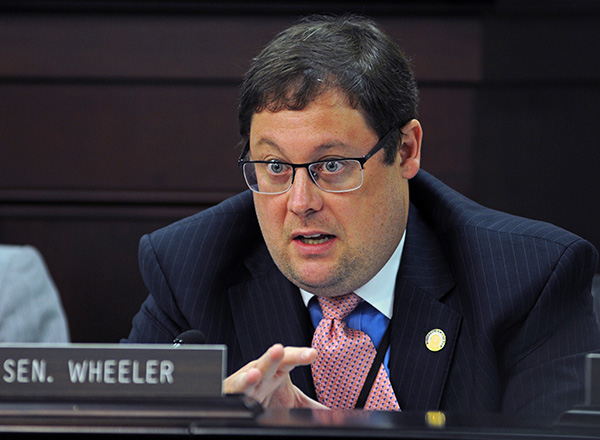 |
Sen. Phillip
Wheeler,
R-Pikeville,
comments on an anti-doxing
proposal presented
by Sen. Wil
Schroder, R-Wilder.
(Click
here
for a high-res
photo).
|
FRANKFORT—The father of
a Covington Catholic High School student who was
identified and threatened online after an tense
encounter with protesters in Washington D.C.
early this year is encouraging state lawmakers
to take another look at legislation that would
criminalize such threats.
Ted Sandmann asked
members of the Interim Joint Committee on
Judiciary to support a proposal by Sen. Wil
Schroder, R-Wilder, that would prohibit anyone
from using the Internet to release personal
identifying information of a minor with intent
to intimidate, abuse, threaten, harass or
frighten the child – a practice known as “doxing.”
“I believe legislation
to criminalize the worst tendencies of the mob
is vital to restoring public discourse,”
Sandmann said.
Sandmann’s son,
Nicholas Sandmann, was the subject of repeated
online harassment and threats after an online
video surfaced of the teen standing face-to-face
with a Native American man named Nathan Phillips
at the steps of the Lincoln Memorial on Jan. 18.
The encounter occurred as Phillips, who had
reportedly participated in the Indigenous
Peoples March that day, walked among Nicholas
and his Covington Catholic classmates while the
teens gathered at the Memorial to catch their
buses after attending the annual March for Life
rally.
In the online video,
Nicholas was wearing a “Make America Great
Again” cap that his father said he had purchased
that day. Phillips was beating a drum. The two
stood face to face for several minutes, Sandmann
said.
Numerous subsequent
online attacks against Nicholas following
release of the video have led to the filing of
defamation lawsuits against
The Washington Post
and other media companies by the family,
Sandmann told the committee. Schroder’s
proposal, he said, will “create legislation to
protect minors from these types of attacks.”
Schroder attempted to
pass the anti-doxing proposal during the 2019
Regular Session. The proposal, contained in
Senate Bill 240, passed the Senate 26-10 but
stalled in the House near session’s end. That
proposal would have made doxing of minors a
misdemeanor, although increased penalties would
be allowed in cases involving physical injury,
death, or financial loss.
“This is the interim
process, so we are certainly open to
suggestions, changes, open to hearing concerns,
and hopefully talking those out,” Schroder told
the committee.
Schroder said the
purpose of the bill is for serious threats. He
said three basic elements would have to be
evident for prosecution under the proposal: the
release of personal identifying information,
intent to cause some degree of harm, and
“reasonable fear” of injury.
“Those are the kind of
things we’re getting at and again, there has to
be a reasonable – if you are putting yourself in
their shoes – there has to be that element that
it’s a realistic, reasonable fear,” said
Schroder.
House Minority Whip
Rep. Joni L. Jenkins, D-Shively, who asked if
the proposal would apply to bullying among
students, said the intent of the legislation
needs to be clarified.
“I’m not against
this at all, but I think we need to be very
careful that we don’t open up something that we
don’t want to open up.
But I do
support the idea of this legislation,” she said.
Sen. Phillip Wheeler,
R-Pikeville, expressed support for the proposal.
Wheeler said he is sympathetic to what Nicholas
Sandmann has experienced since the January
incident.
“Although freedom of
expression and the freedom of the press are
something we hold dear, there also needs to be
some responsibility,” said Wheeler. “I think
this bill seems to do that type of thing. I
think it is well-drafted and honed for its
purpose.” Wheeler added that he would like to
see similar protections for adults.
“I think at some point
expanding it is appropriate, because this
happens to adults just as it happens to
juveniles,” said Interim Joint Committee on
Judiciary Co-Chair Sen. Whitney Westerfield,
R-Hopkinsville.
“This won’t be last
time we discuss this bill,” Westerfield said.
--END--
July 10, 2019
Higher
contribution rates loom for KRS, lawmakers told
|
|
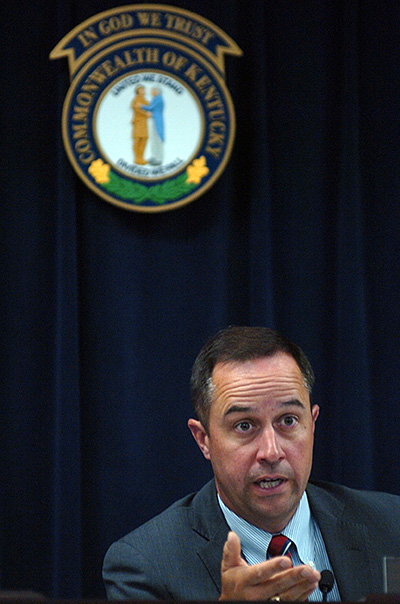 |
Sen. Christian
McDaniel, R-Taylor
Mill, commenting on
actuarial
assumptions shared
by the Kentucky
Retirement Systems.
McDaniel is the
committee chair.
(Click
here
for a high-res
photo).
|
FRANKFORT— Employers in
the Kentucky Retirement Systems are projected to
contribute between 2.8 percent to 13 percent
more of covered payroll for retirement under new
actuarial assumptions shared with state
lawmakers yesterday.
The increases—driven
mostly by a two-year bump in life expectancy
among KRS retirees and less turnover among some
KRS plan members – would to lead to millions of
dollars in additional retirement contributions
for the KRS plans, KRS Executive Director David
Eager told members on the Interim Joint
Committee on Appropriations and Revenue.
Employer contributions
to the County Employees Retirement System (CERS)
Non-Hazardous plan are projected to rise by a
total of $86 million under the new assumptions,
with employer contributions to the Kentucky
Employees Retirement System Non-Hazardous plan
and CERS Hazardous plan on track for total
increases of $59 million each, Eager told
lawmakers.
An expected rise in
retiree life expectancy alone is “going to be a
higher cost” for several years to come, Eager
told lawmakers. He said the KRS mortality
assumption changed, in part, because KRS members
tend to live longer than the average retiree
nationally.
“So, we’re saying
rather than someone living 21 years after
retirement, they’re going to live 23. That’s a
big funding cost to cover that extra two years,”
said Eager.
As for turnover, Eager
said some systems have had higher turnover and
others – specifically the State Police
Retirement System and CERS Hazardous – have had
“significantly” lower turnover.
“We’re going to be
having to pay more money out for benefits
because people are staying longer (in those
systems),” he said.
Rep. Angie Hatton,
D-Whitesburg, commented on the mortality
assumptions. She questioned the fiscal toll that
a two-year increase in assumed life expectancy
would have on local health departments and
others.
“Isn’t it irresponsible
to do that at the same time as we also make a
huge jump in assumption rates?” Hatton said,
adding that the changes could overwhelm local
agencies. Eager said the adjustment is
necessary.
“I’m very empathetic,”
he said. “But the solution … is not to cut
pensions from what they should be.”
Also questioning the
increase in assumed life expectancy among KRS
members was Appropriations and Revenue Committee
Co-Chair Sen. Christian McDaniel, R-Taylor Mill.
McDaniel said GRS Retirement Consulting, the
firm that recommended the actuarial assumptions
adopted recently by the KRS Board, itself said
that assumptions underlying an increase in life
expectancy “reflect some degree of
subjectivity.”
“It’s my opinion that
we are beginning to hit a tipping point with the
ability of the Commonwealth’s budget to continue
to contribute when, each year, we’re given new
sets of assumptions,” said McDaniel.
Life expectancy at age
65 is trending upward, commented Eager. The job
of fiduciaries for KRS, he said, is to make the
“best estimate of what needs to be funded in the
future” with the help of the actuary.
“If the actuary says
that the funding should be prescribed at this
level, that’s what we need to ask for,” Eager
said.
Some positive news,
Eager said, is that KRS can lower its
contribution rate to 3.05 percent (the current
rates for members in the KRS Tier 3 cash balance
plan) if employers continue to pay their full
actuarially required contribution, or ARC, to
the system. Reaching that low rate could happen
as soon as 2043, he said.
“We think that’s
wonderful,” Eager said. “Was Tier 3 a good idea?
Will it have a positive impact? Yes, it will
have a positive impact.”
The actuarial
assumptions adopted by the KRS Board were the
result of a GRS study completed in June 2018,
according to KRS.
--END--
July 3, 2019
Kentucky beef cattle priorities shared
with state lawmakers
FRANKFORT—Kentucky, by
most accounts, is the king of beef cattle
production east of the Mississippi River.
The Commonwealth has
around a million head of beef cows, making it
the largest beef cow producer in the eastern
U.S. and the eighth-largest beef cow producer in
the country, according to Kentucky Cattlemen’s
Association Executive Vice President Dave
Maples. What it doesn’t have, he says, are large
feedlots necessary to fatten, or finish, beef
cattle for market.
That requires many
farmers in Kentucky and the region to send their
cattle over 1,000 miles to Kansas or other
states for finishing and processing, Maples told
the state legislative Tobacco Settlement
Agreement Fund Oversight Committee today.
Maples called the
situation “a barrier to Kentucky producers.”
“Why can’t we do it
here? I have been told we cannot do it in
Kentucky,” he said. Too much mud and a lack of
grain are at least two reasons Maples said he’s
been given as to why feedlots and processing
won’t work in the state, although he said large
poultry houses and hog barns have been
successful.
Transporting cattle
thousands of miles out of state for finishing
and processing also affects consumers – many of
whom are now interested in tracing the origin of
their food, said Maples.
“So what can we do?
We’ve mapped out where the packing plants are.
You look in our area; we don’t have processing,”
he said. One solution may be to build a regional
beef processing plant, Maples told the
committee. So far, he said, Tennessee and Ohio
have both shown interest in the idea.
The association’s
governing board has approved a long-range plan
that sets out what Maples said are four core
strategies to improve opportunities for
Kentucky’s beef industry.
“So we’re in a place
where we can be a leader,” he said.
Rep. Brandon Reed,
R-Hodgenville, asked Maples what the Kentucky
General Assembly can do to help Kentucky cattle
farmers remove transportation barriers to
markets. Maples said Kentucky’s interstate
roadways and railroads are working well, but
that lawmakers might want to look at creating
“farm-to-market roads” to beef up access between
rural areas and market locations.
Representatives from
the Kentucky Beef Network, or KBN--a division of
the Kentucky Cattlemen’s Association-- also
spoke about their programs, many which have
benefited from the state’s share of millions of
dollars in funds received from a master tobacco
settlement with large tobacco companies in the
late 1990s. The purpose of the Tobacco
Settlement Agreement Fund Oversight Committee is
to oversee those funds.
KBN Chairman Cary King
told the committee that he is excited for
Kentucky beef cattle producers as the demand for
Kentucky beef by major retailers, specifically
Kroger, is growing here at home.
“I think we’re at the
point now with the grain that we have, we’ve got
the byproduct from the bourbon industry, that we
can build some of these barns (here) and finish
cattle inside,” said King.
“I think we can keep
those cattle here, learn how to feed them here
economically, and then go through Kroger and
sell them to the population that’s so close to
us. I think we’re right at the point of making a
big difference,’ he said.
--END--
June 18,
2019
New state laws take effect June 27
FRANKFORT – Most new
laws approved during the Kentucky General
Assembly's 2019 session will go into effect on
Thursday, June 27.
That means law-abiding
adults will be able to carry a concealed firearm
without a permit, employers will be required to
make certain reasonable accommodations for
pregnant employees and electric scooters will be
regulated by state law.
The Kentucky
Constitution specifies that new laws take effect
90 days after the adjournment of the legislature
unless they have special effective dates, are
general appropriation measures, or include
emergency clauses that make them effective
immediately upon becoming law. Final adjournment
of the 2019 session was on March 28, making June
27 the effective date for most bills.
During this year’s
30-day session, 786 bills and 502 resolutions
were introduced, including 263 Senate bills and
523 House bills. In all, 68 Senate bills and 130
House bills became law. The governor also
received six joint and concurrent resolutions.
Some of the laws taking effect on June 27
include measures on the following topics:
Caller ID.
House Bill 84 will prohibit telephone
solicitations that misrepresent the name or
telephone number in caller identification
services, increase fines for second offenses and
allow for civil lawsuits against violators.
Concealed carry.
Senate Bill 150 will allow concealed firearms to
be carried without a concealed carry permit. The
measure will allow Kentuckians age 21 and older
who are legally eligible to possess a firearm to
carry a concealed weapon without a license in
the same location as people with valid
state-issued licenses. Permitless carry will not
be allowed where prohibited by federal law or
otherwise prohibited.
Felony expungement.
Senate Bill 57 will expand the number of
Kentuckians eligible to have low-level felonies
expunged from their criminal records. It will do
this by expanding discretionary expungement to
all Class D felonies with some exceptions for
crimes such as stealing in office, abusing
children and sexual abuse. It includes a
five-year waiting period to apply for
expungement, a $250 application fee and
provisions for prosecutors to object and judges
to reject the applications.
Free speech.
House Bill 254, dubbed the campus free speech
bill, will require the state’s public
universities to affirm they favor a free
marketplace of ideas where speech is not
suppressed because it’s deemed “offensive,
unwise, disagreeable, conservative, liberal,
traditional or radical.” SB 254 will also expand
areas commonly known as “free speech zones” on
many campuses to any accessible, open, outdoor
venue.
Government contracts.
House Bill 135 will prohibit public agencies
from requiring that their contractors on public
works projects have agreements with labor
organizations.
Kinship care.
House Bill 2, dubbed the kinship care bill, will
create a caregiver assistance program for
relatives and “fictive kin” – usually close
family friends – of abused, neglected or
dependent children. The measure will do this by
offering different options to the caregivers
based on the level of care they provide. HB 2 is
designed to address growth in the out-of-home
placement of Kentucky children amid the state’s
current opioid crisis.
Lobbying.
Senate Bill 6 will require disclosure of
executive agency lobbyist compensation. The
measure will also prohibit compensation
contingent on awarding of a government contract.
It will provide oversight, in part, by requiring
executive branch lobbyists to register and list
their clients. That’s already required of
legislative lobbyists.
Midwives.
Senate Bill 84 will recognize, certify and
regulate home-birth midwives in Kentucky. The
measure would create a council to advise the
state Board of Nursing on the creation of
regulations regarding qualifications, standards
for training, competency, any necessary
statutory changes and all other matters relating
to certified professional midwives.
Pregnancy.
Senate Bill 18, the Kentucky Pregnant Workers
Act, clarifies employers’ responsibilities when
it comes to making reasonable accommodations for
pregnant employees. It will make it unlawful for
an employer to fail to accommodate a pregnant
employee and will require employers to provide
notice to employees regarding these rights.
Scooters.
House Bill 258 will set operating standards for
electric scooters and will allow the machines to
legally operate much like bicycles on public
streets. It also limits e-scooter speeds to no
more than 20 mph.
Sex crimes.
Senate Bill 67 will create the offense of sexual
crimes against an animal.
Strangulation.
Senate Bill 70 will make non-fatal strangulation
its own felony crime under Kentucky's criminal
code.
Student loan debt.
House Bill 118, the Keep Americans Working Act
of 2019, will prohibit someone from having an
occupational license suspended or revoked
because of delinquency on a student loan or
work-conditional scholarship. The measure is
meant to help keep people with student loan debt
out of poverty and in the workforce.
Tobacco.
House Bill 11 would ban the use of tobacco,
e-cigarettes and vaping devices on public school
campuses, in school vehicles and at school
activities beginning with the 2020-21 school
year. School districts would have up to three
years to opt out of the ban should they choose.
The individual districts not opting out will
also be able to set the penalties for violating
the ban.
--END--
June 7, 2019
Child support
guidelines under Judiciary panel’s review
|
|
 |
Sen. Robin Webb,
D-Grayson, speaks on
issues affecting
child support and
guardians ad litem.
(Click
here
for a high-res
photo).
|
FRANKFORT—Judges have
to suspend “disbelief” when awarding child
support based on the 32-year-old income data
behind Kentucky’s child support guidelines, a
family court judge told state lawmakers today.
The 1987 data –
provided by the United States Department of
Agriculture to help Kentucky and other states
enact federally-required child support
guidelines—gauged what it took to raise children
at different income levels over three decades
ago in an “intact” family, or a nuclear family
in which both parents live in the home, Fayette
Family Court Judge Lucinda Masterton told the
Interim Joint Committee on Judiciary. Many
families today are single-parent families.
“Of course, (a nuclear
family) is not what we’re dealing with anyway,
so there’s a certain suspension of disbelief
that you have to have with the guidelines to
begin with,” she said.
There have been
numerous attempts to adjust the child support
guidelines amounts and update other provisions
over the past several years, with federal
funding on the line under the 1988 Family
Support Act, a 31-year old federal law that
Masterton said requires states to pass
guidelines that are presumed to award “correct”
child support amounts. States that failed to
follow the law, she said, could potentially lose
money.
“For 2017, if we had
been called to task on this, we would have had a
minimum of $9 million at stake,” she said. “If
they really didn’t like what we were doing, $180
million we could lose -- a big number.”
Lawmakers most recently
attempted to pass revised guidelines in 2018 and
2019. Certain changes were became law, but
proposed adjustments to the child support
guideline amounts in the 2019 legislation were
removed because of legislative concerns that
Masterton said she understood.
She did urge lawmakers
to act soon to adjust the guidelines so that
judges are acting consistently and not deviating
from the guidelines that are in place.
Interim Joint Committee
on Judiciary Co-Chair Rep. Jason Petrie,
R-Elkton, said the urgency to pass new
guidelines has been building. He said he wants
the child support calculation method and other
issues affecting the guidelines addressed as
soon as the 2020 regular legislative session.
“It’s got to be
corrected, so I will echo, it must be dealt
with,” said Petrie. “I want this dealt with.”
New draft guidelines to
consider should be available as early as this
fall, according to Kentucky Cabinet for Health
and Family Services Department for Income
Support Commissioner W. Bryan Hubbard, who told
the committee that his department is working
with the Center for Policy Research to update
the guidelines.
Among other
requirements, Hubbard said the Center will
present up to three onsite presentations on
guideline recommendations and supportive data.
“This includes availability to answer technical
and substantive questions for legislative
hearings,” he said.
The recommended
guidelines should be ready by this Sept., said
Hubbard, with a final report from the Child
Support Guidelines Commission ready by the end
of October.
Sen. Robin Webb,
D-Grayson, asked that the committee hold more
discussion on the issue.
“There are a lot of
moving parts in child support, there is a lot
going on,” she said. “There are contracts being
consolidated, budgets being cut. And I want to
know more about those.” Petrie said more
meetings are to come, both on child support and
the issue of guardians ad litem which was
discussed earlier in the meeting.
“These two topics are
things that need to be moved along,” he said,
adding he’d like for other members of the
committee to help “take the lead” in fostering
additional discussion. “If you’d make the
contact that’d be great.”
--END--
June 7,
2019
State property tax
calendar a challenge, officials say
|
|
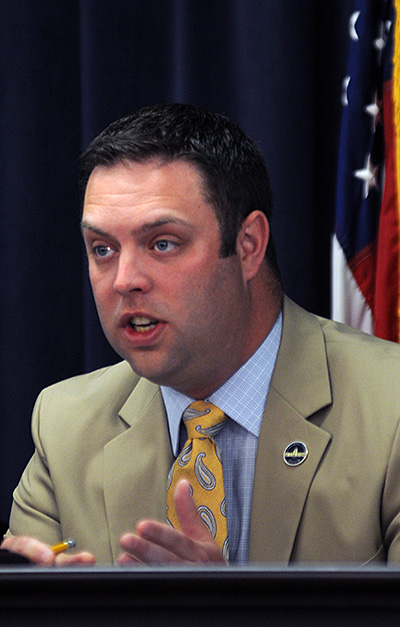 |
Interim Joint
Committee on Local
Government Co-Chair
Rep. Michael
Meredith, R-Oakland,
asks local officials
about challenges
presented by
Kentucky’s property
tax calendar.
(Click
here
for a high-res
photo).
|
FRANKFORT—State law
sets an end-of-year deadline for Kentucky
property owners to pay their tax bills without
penalty. But local governments say they must
meet several deadlines before the first tax bill
is ever mailed.
Changes to any of those
deadlines, found on what is called the Kentucky
“property tax calendar,” can disrupt the tax
assessment and collection process, officials
told the Interim Joint Committee on Local
Government yesterday. One of those officials was
Kentucky Association of Counties (KACo)
President and Caldwell County Magistrate Elbert
Bennett, who told lawmakers that many local
government duties related to property taxation
overlap to meet the calendar’s statutory
deadlines.
“Any single change in
the property tax calendar has a ripple effect,”
he said.
Agreeing with that
assessment was Mack Bushart, a former Marshall
County property valuation administrator (PVA)
and current executive director of the Kentucky
PVA Association. PVAs are responsible for
assessing real estate and personal property in
the county and preparing the property tax rolls,
with an annual assessment date of Jan. 1. The
current tax calendar, he said, can make that
work more challenging.
It has “more moving
pieces than a Swiss watch. And if they don’t
really gee and haw just right, again, it’s got
real consequences at the end of the year,”
Bushart added.
PVA assessments are
ultimately open to an appeals process and
ultimately sent to the state, which calculates
and certifies the property tax rates by June 30.
Once the
numbers are certified, the calendar gives most
counties 45 days to set the property tax rates
that will be on tax bills delivered to sheriffs
by each Sept. 15 for mailing.
Forty five days may
seem like enough time for a fiscal court to set
the tax rate, LaRue County Judge/Executive Tommy
Turner told the committee, but “sometimes it’s
pushing it,” he said.
Something as simple as
a short delay in getting property tax rates
advertised in the local newspaper can cause
problems, said Turner. If a county wants more
property tax revenue than it received in the
previous year up to a certain amount, the
proposal must be advertised in the paper or by
mail. Further complications can arise if a
county wants to raise revenues more than four
percent over revenues from the previous year,
said Turner, because that higher rate is—by
law—subject to a possible recall election.
“That’s when it
becomes really, really cumbersome and can cause
issues,” Turner said, telling lawmakers the
appeals period for a recall election could add
another 45 or so days to the schedule.
Some argue
that’s good reason for counties to not raise
revenue above four percent, Turner said. He
challenged that thinking.
“You could have people
say, ‘Well, you’re going to have to live within
your means. You can’t consider something higher
than a four percent.’ Well, that’s fine as long
as I can send Anthem Blue Cross and Blue Shield
a letter and say ‘look, you can’t raise your
rates more than this amount,’” because the
county’s bills still have to be paid, Turner
said.
Legislation that
affects the calendar for a few local government
and quasi-government entities was passed last
session under House Bill 49, sponsored by Rep.
Stan Lee, R-Lexington. Signed into law earlier
this year, HB 49 extends the deadline to
petition for a recall election on property taxes
levied in Lexington and Louisville to 50 days
after a levy is passed.
The deadline to
petition for a recall under the new law will
remain 45 days in other Kentucky cities,
counties and local taxing districts.
Department of Revenue
Division of Local Support Assistant Director
Melissa Klink, who also appeared before the
panel, was asked by Interim Joint Committee on
Local Government Co-Chair Rep. Michael Meredith,
R-Oakland, if her Department could expedite
state certification of county data without
changing the actual calendar.
Klink said that would
be “very difficult.”
“The Jan. 1
(assessment) date is by statute, so to change
that would require obviously a legislation
change,” she said.
Also affected by the
property tax issue are Kentucky’s public school
districts which rely on property tax as a
primary source of state funding under the SEEK
(Support Education Excellence in Kentucky)
formula. Kentucky School Boards Association
Director of Governmental Relations Eric Kennedy
said full assessed value across the state is
needed “for the overall funding to be fair.”
Property tax, Kennedy
added, is the only tax required under Kentucky’s
constitution.
Meredith told all local
government officials and their representatives
in attendance that he encourages them to come
together on the issue and find a solution that
lawmakers could entertain in legislative
session.
“I think the problem
has been well presented,” he said. “I think the
details of how that all works together have been
well presented and I appreciate that,” said
Meredith. “But I would encourage and empower you
all to try to help us come up with a solution
that we can bring forward to address the issue
in the coming year.”
--END--
June 4, 2019
Postsecondary funding model eyed by budget
committee
|
|
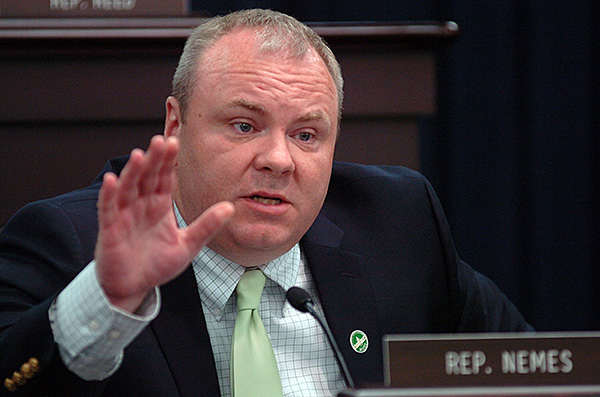 |
Rep. Jason
Nemes, R-Louisville,
questions U of L
President Neeli
Bendapudi on
Kentucky's
postsecondary
education goals at
today's meeting of
the Interim Joint
Committee on
Appropriations and
Revenue.
(Click
here
for a high-res
photo).
|
FRANKFORT—A performance-based higher education
funding model passed into law two years ago is
working for Kentucky’s two research
universities, state lawmakers were told today.
University of Kentucky President Eli Capilouto
and University of Louisville President Neeli
Bendapudi told the Interim Joint Committee on
Appropriations and Revenue that they favor the
formula, which allocates a portion of state
funding based on a university’s performance on
11 key metrics. UK recently outperformed the
average in 10 of those metrics while U of L
outperformed the average in four of the metrics,
according to the universities’ leaders.
The performance-based funding model was created
in 2017 with the passage of Senate Bill 153,
sponsored by Senate President Pro Tempore David
P. Givens, R-Greensburg. It is gradually
replacing what Givens called the “shares
allocation” model that based funding on each
postsecondary institution’s share of the state’s
postsecondary budget.
The model is being phased in at the state’s
universities and community colleges over a
three-year period beginning with fiscal year
2018-2019, according to the Kentucky Council on
Postsecondary Education (CPE).
Givens, who serves
on the Interim Joint Committee on Appropriations
and Revenue, thanked Capilouto, Bendapudi and
fellow lawmakers for their support of the
performance formula, now in its second year.
The goal,
ultimately, is to push the state’s postsecondary
institutions closer to the national average in
degree attainment, he said.
“If we can get to that place – almost at the
national average for postsecondary degree
attainment – we can change the economy in
Kentucky in great, vast ways, so thank you,”
Givens told his colleagues on the committee.
Rep. James Tipton, R-Taylorsville, questioned
Capilouto on whether he thinks UK and U of L as
the state's research universities should be
categorized differently under the new funding
model. Some argue they should, Tipton said.
“Some people seem to think it would be better if
our research universities were in a separate
category from our regional universities in how
performance-based (funding) works. I’d like to
hear your comments on that,” he said.
Capilouto said his support for the model is
based on the “commonality” of undergraduate
education.
“There is a
commonality in this performance-funding
approach, and it is the one thing that every
university does,” said Capilouto.
“I think it
is an advantageous approach.”
Bendapudi agreed with Capilouto. Additionally,
she asked lawmakers to consider increasing
funding under the formula in the 2020 state
budget session.
“I do request more allocation, if possible,” she
told the committee. “Incentive funding works
well when it’s new dollars. Otherwise, if it’s
moving dollars, then obviously we get into
you’re growing at the expense of something
else.”
Testimony on research at the two universities
was also shared with the committee. Research
funding increased 26 percent in fiscal year 2019
alone at UK, one of four universities nationally
to receive an $87 million grant to help reduce
opioid deaths.
Dr. Sharon Walsh, the head of the UK grant
project called the HEALing Communities Study,
said the project goal is to reduce opioid deaths
in 16 Kentucky counties by 40 percent in three
years, with the project beginning this fall.
U of L is also making strides in its research,
said Bendapudi. Research expenditures at that
institution totaled over $176 million in 2018,
she told lawmakers.
--END--
May 15, 2019
Lawmakers name Jay D. Hartz as next LRC Director
FRANKFORT --
Legislative leaders today named Jay D. Hartz as
the next Director of the Legislative Research
Commission.
Hartz, the Deputy Chief
of Staff in the Senate President’s Office, is a
familiar figure to many in the State Capitol,
where he’s known for his extensive knowledge on
legislative operations and policymaking. He’s
also known for his good humor and the colorful
bowties he frequently favors.
When Hartz assumes the
duties of LRC Director on June 1, he will bring
nearly 25 years of experience in policy
development, legislative procedure, and people
management to the position.
As LRC Director, Hartz
will be responsible for the performance of
nonpartisan staff employed by the General
Assembly and for ensuring that high quality,
professional services are provided to the
legislature.
“I’m humbled by the
responsibilities I will assume as Director of
the Legislative Research Commission, and I look
forward to building on the strengths inherent in
LRC’s nonpartisan staff structure,” Hartz said.
House Speaker David
Osborne said Hartz’s background and experience
give him a unique skill set to successfully lead
a legislative staff.
“Throughout his career,
Jay Hartz has shown great integrity and earned
the respect of legislators in both chambers and
both parties, as well as staff members
throughout the agency,” Osborne said. “He is a
consummate professional and possesses both the
understanding of the legislative process and the
institutional knowledge of the Kentucky General
Assembly that we were looking for in a new LRC
Director.”
Prior to serving in his
current position of Deputy Chief of Staff, Hartz
served as the Director of Legislative Operations
in the Senate President’s Office and served two
terms as the Chief Clerk of the Senate, the
Chief Administrative Officer for the chamber.
Hartz is Chair of the
Southern Legislative Conference’s STARS
Committee, a member of the Council for State
Government’s Suggested State Legislation
Committee and serves on the Board of Directors
at the Ashbrook Center for Public Affairs.
A graduate of the
Honors Program at Ashland University where he
was an Ashbrook Scholar and earned the James
Madison Award, Hartz went on to receive a
master’s at Villanova University where he held
an Earhart Fellowship.
Hartz resides in
Simpsonville with his wife (Kim) and son (Alex),
as well as Morgan horses and more spoiled cats
than he cares to admit.
--END--
May 1, 2019
Lawmakers receive
youth vaping update
|
|
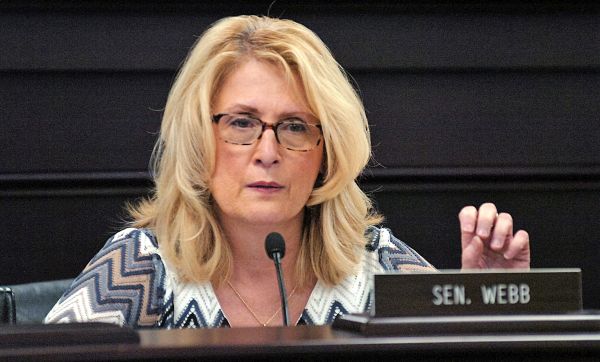 |
Sen. Robin
Webb, D-Grayson,
asks officials with
the Kentucky Tobacco
Prevention and
Cessation Program
for more data on
vaping among
Kentucky’s youth.
(Click
here
for a high-res
photo).
|
FRANKFORT—Seventy five
Kentucky school districts ban tobacco use but
far fewer ban vaping, which delivers nicotine
and other substances through an electronic
vaporizer. That could change under a new state
law set to take effect next month.
Kentucky Tobacco Prevention
and Cessation Program manager Kerri Verden told
the Tobacco Settlement Agreement Fund Oversight
Committee that 2019 House Bill 11 could have an
impact on 22 tobacco-free districts that don’t
include vaping in their tobacco-free policies,
plus others.
The law, set to take effect on
June 27, will ban the use of tobacco and vaping
devices on public school campuses statewide
beginning next fall in school districts that
don’t opt out of the ban.
“Districts may have been
waiting to see what would happen with that
legislation before they chose to act or not,”
said Verden.
Verden said the use of
e-cigarette and vaping devices in Kentucky high
schools skyrocketed 200 percent between 2016 and
2018. Pod-based vaping devices that are commonly
used today are “very, very addictive,” she said,
with some tests indicating one pod contains the
amount of nicotine found in two packs of
traditional cigarettes.
“This product is so addictive
and prevalent, we’re at the point where when we
go to the schools we’re not talking about
prevention as much as we are cessation, even at
the middle school age,” she said.
While the most recent Centers
for Disease Control (CDC) data from 2017
indicates that cigarette smoking among Kentucky
high school students is at the “lowest it’s ever
been,” said Verden—with around 1 in 7 Kentucky
youth today smoking cigarettes—increased vaping
likely means smoking rates are also on the rise,
she said.
“We suspect the (smoking) rate
has increased substantially, largely due to the
introduction of very popular pod-based
electronic cigarette systems,” which came on the
market in 2015, she said. Verden told lawmakers
that the use of vaping devices was declared an
epidemic by the U.S. Surgeon General late last
year.
She then played a video of
U.S. Surgeon General Dr. Jerome Adams speaking
about the harm that nicotine and other compounds
in e-cigarettes and vaping can do to the
adolescent brain. In his comments, Adams said
that one-third of youth who have used
e-cigarettes and vaping devices have used them
to vaporize and inhale marijuana. That led to
comments from lawmakers on the committee,
including Sen. Robin Webb, D-Grayson.
Webb asked Verden if THC—a
hallucinogenic compound found in marijuana—has
been found in e-cigarettes and vaping devices
used by youth. Verden said it has, adding that
she will relay that study data to the committee.
Webb said that information would be of interest
to her.
“That’d be the most disturbing
to me as a policy maker,” said Webb. “I’d like
to focus a little more on the illegal substances
at this point, and I’d like to see the data on
that. I think that is our immediate issue from a
potential health side.”
Verden said youth can be
“really creative” in using vaping devices with
marijuana, and other drugs. “You don’t know what
substances are in there, and it’s not even just
marijuana – you can put any illicit substance in
there, really, in any form.”
Also expressing concern with
the use of vaping devices for use with illicit
substances was Tobacco Settlement Agreement Fund
Oversight Committee Co-Chair Rep. Myron Dossett,
R-Pembroke. He asked Verden for data on what
types of illicit drugs are being found in vaping
devices and how access to those drugs is
obtained.
“It really frightens me
knowing that we have a younger generation that
looks at these electronic devices as something …
cool to have in your possession. Something like
this could devastate a child,” Dossett said.
END
April 23, 2019
New KRS actuarial assumptions shared with
pension board
|
|
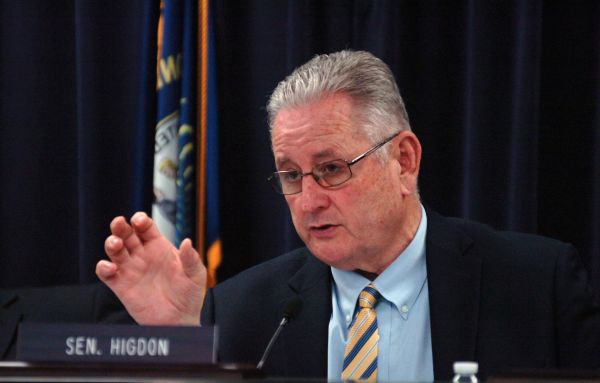 |
Sen. Jimmy
Higdon, R-Lebanon,
speaks on new
actuarial
assumptions adopted
recently by the
Kentucky Retirement
Systems Board during
Monday's Public
Pension Oversight
Board meeting (Click
here for
a high-res photo).
|
FRANKFORT—Retirees in the
Kentucky Retirement Systems’ pension plans are
expected to live longer which, along with less
turnover among some active employees, will
ultimately impact system costs, a state
oversight committee heard yesterday.
The new assumptions are part
of the 2013-2018 KRS actuarial “experience
study” shared with the Public Pension Oversight
Board by Kentucky Retirement Systems Executive
Director David Eager and Danny White, a
consultant with the actuarial firm GRS which
conducted the study. The study is required every
five years by statute, with data from the recent
study used to determine KRS contributions over
the next three years.
White said longer life
expectancy among retirees age 65 and older is a
national trend due to various factors, including
pharmacy benefits and other care.
“Once you get to retirement,
that’s when your life expectancy is expected to
improve” according to the latest assumption,
said White.
Public Pension Oversight Board
co-chair Sen. Jimmy Higdon, R-Lebanon, asked
White to explain what occurred in the past five
years that led GRS to reach a new assumption for
retiree life expectancy. White said the
assumption is driven by both data and trends.
The prior assumption, made around 2013, factored
in a margin of growth for life expectancy based
on different variables, White explained.
Higdon said he thinks some
past assumptions about KRS may have helped to
escalate the systems’ unfunded liability, which
now totals at least $13.5 billion for the
Kentucky Employees Retirement System
non-hazardous plan alone.
“Those assumptions – payroll
assumptions, return on investment assumptions—a
lot of those assumptions were, I guess,
artificially low in my opinion,” said Higdon.
White said that would require
some review, saying “you have to look at all the
facts and circumstances at the time to say,
whether or not, is that appropriate.”
Increased life expectancy
won’t singularly impact cost to the retirement
systems, White told the board. That cost, he
said, is based on investment, employee turnover,
and mortality, among other factors.
The new assumption for
turnover – which occurs when an employee no
longer contributes to KRS, or becomes an
“inactive” member of KRS – of hazardous-duty
employees in the County Employees Retirement
System (CERS), specifically, shared by White
indicates that turnover depends most often on an
employee’s years of service and age.
“You can have high turnover
early in the position but essentially, as they
get five or six years in, more than likely
they’re going to stay. They’re not going to
leave the system,” said White.
That
said, a decrease in turnover does necessarily
translate to retirement from KRS. A significant
number of CERS hazardous active employees “will
not make it to retirement,” White said, although
the new assumption expects less turnover in that
system than in prior years, he said.
“That’s a cost increase,” said
White. “It’s more expensive to provide
retirement benefits than, let’s say, a
termination benefit.”
Another recommendation made by GRS assumes a
higher rate of salary change for some KRS
members, along with an increased rate of
disability for KERS and CERS members.
The
current KRS experience study can be found here:
https://apps.legislature.ky.gov/CommitteeDocuments/287/11932/4%2022%202019%202019%20KRS%20ExpStudy.pdf.
The previous KRS experience study from
2008-2013, and a 2014 presentation of the study,
can be found on the KRS website at:
https://kyret.ky.gov/About/Board-of-Trustees/Pages/Experience-Studies.aspx
END
March
28, 2019
Kentucky General Assembly adjourns 2019 session
School safety bill
among the high-profile measures approved
|
|
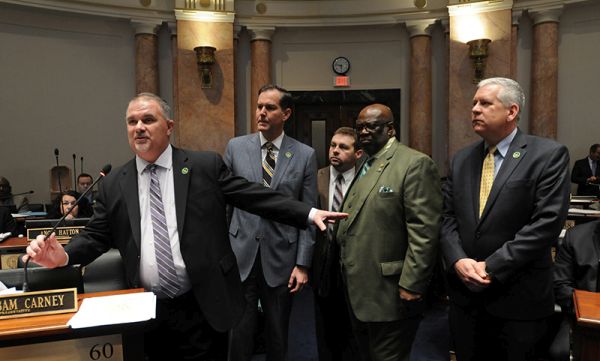 |
Majority
Floor Leader John
Bam Carney,
R-Campbellsville,
(from left)
acknowledging Sen.
Max Wise,
R-Campbellsville,
Rep. Brandon Reed,
R-Hodgenville, Rep.
George Brown Jr,
D-Lexington, and
Rep. John Blanton,
R-Salyersville,
after the passage of
Senate Bill 1, the
School Safety and
Resiliency Act, on
Feb. 27 in the
House. (Click
here
for a
high-res photo.)
|
FRANKFORT – The final
week of the 153rd regular session of the
Kentucky General Assembly saw the ceremonial
signing of a sweeping measure to enhance school
safety that is widely considered many lawmakers’
highest-priority bill of the year.
The School Safety and
Resiliency Act, or Senate Bill 1, was among more
than 200 bills that had passed by the time the
30-workingday session ended this evening.
SB 1 was the product of
a specially formed committee that traveled the
state last year to discuss school safety and
collect feedback. The measure will create a
state security marshal to conduct onsite visits
to ensure schools were compliant with all
provisions of the omnibus bill. The goal of SB 1
is to improve student safety by boosting safety
and prevention training, promoting the
assignment of a school resource officer to every
school, increasing awareness of suicide
prevention efforts, encouraging collaboration
with law enforcement and hiring more counselors
in school districts. Legislative leaders said
funding the provisions of the bill are expected
to be a priority when lawmakers put together the
state’s two-year budget next year.
Most new laws – those
that come from legislation that doesn’t contain
emergency clauses or special effective dates –
will go into effect in late June.
A partial list of bills
that the General Assembly approved this session
includes measures on the following topics:
Abortion.
House Bill 5 will make it a felony to
perform an abortion due to a decision based
on the unborn child’s gender, race, color,
national origin or disability. Senate Bill
9, known as the fetal heartbeat bill, will
prohibit abortion in Kentucky once a
heartbeat is detected in an unborn child. (A
federal judge in Louisville has issued
temporary restraining orders blocking
enforcement of SB 9 and HB 5 after lawsuits
were filed challenging the measures.) Senate
Bill 50 will require health providers to
report prescriptions written for RU-486 or
any drug intended to end pregnancy to the
state. House Bill 148 will outlaw abortion
in Kentucky in most cases should the
landmark
Roe v. Wade
ruling be reversed
Budget.
House Bill 268 authorizes $25 million in
bonds for economic development and $50
million in bonds for state parks to be spent
on emergency repairs on everything from
leaky roofs to backed-up sewers. It would
also provide $290,000 for Kentucky State
University to match federal money available
to land-grant universities.
Concealed
carry.
Senate Bill 150 will make Kentucky the 16th
state to allow concealed firearms to be
carried without a concealed carry permit.
The measure will allow Kentuckians age 21
and older who are legally eligible to
possess a firearm to carry a concealed
weapon without a license in the same
location as people with valid state-issued
licenses. Permitless carry will not be
allowed where prohibited by federal law or
otherwise prohibited.
Drunken
driving.
Senate Bill 85 will expand the use of
ignition interlock devices (IID),
Breathalyzer-type devices connected to the
ignition systems of vehicles of people
convicted of driving under the influence
(DUI). The measure will do this by allowing
and incentivizing IIDs for all people
charged with a DUI and shift administration
of the program from the courts to the
Transportation Cabinet. SB 85 will also move
Kentucky toward a more compliance-based
model, in which offenders would have to
complete a 120-day period of sober driving
before exiting the court-mandated program.
Elections.
House Bill 114 will require candidates for
state offices and most local offices to
officially declare their candidacies via
“statement-of-candidacy” forms no later than
the last Tuesday in January preceding the
general election. The current deadline is
April 1. Amendments to the measure will also
remove the Secretary of State as a voting
member of the State Board of Elections and
will make it a misdemeanor if an election
official willfully misuses the state’s voter
registration roster. Senate Bill 4 will
require mandatory electronic filing of all
candidates’ campaign finance reports by the
May 2020 primaries.
Felony
expungement.
Senate Bill 57 will expand the number of
Kentuckians eligible to have low-level
felonies expunged from their criminal
records. It will do this by expanding
discretionary expungement to all Class D
felonies with some exceptions for crimes
such as stealing in office, abusing children
and sex abuse. It includes a five-year
waiting period to apply for expungement, a
$250 application fee and provisions for
prosecutors to object and judges to reject
the applications.
Foster
children.
House Bill 158, dubbed the “foster child
bill of rights,” grants 16 rights for
children in out-of-home placement in
Kentucky, including rights to “adequate
food, clothing and shelter,” “a safe,
secure, and stable family,” and “freedom
from physical, sexual, or emotional injury
or exploitation.” The legislation will also
reduce the time for a parent or guardian to
consent to voluntarily placing a child for
adoption from 20 days to 72 hours. Senate
Bill 31 will ensure children in out-of-home
care have visitation rights with their
siblings. The measure will do this by
requiring the Cabinet for Health and Family
Services, in the case of siblings removed
from their home and not jointly placed, to
provide for frequent visitation or other
ongoing interaction between the siblings.
Free speech.
House Bill 254, dubbed the campus free
speech bill, will require the state’s public
universities to affirm they favor a free
marketplace of ideas where speech is not
suppressed because it’s deemed “offensive,
unwise, disagreeable, conservative, liberal,
traditional or radical.” SB 254 will also
expand areas commonly known as “free speech
zones” on many campuses to any accessible,
open, outdoor venue.
Government contracts.
House Bill 135 will prohibit public agencies
from requiring that their contractors on
public works projects have agreements with
labor organizations.
Hemp.
House Bill 197 will expand the legal
definition of hemp to include the seeds of
industrial hemp, derivatives, extracts,
cannabinoids and isomers, among other
components. That is the same definition
found in the new U.S. Farm Bill, signed into
law late last year, which removed hemp from
the federal Controlled Substances Act.
Kinship care.
House Bill 2, dubbed the kinship care bill,
will create a caregiver assistance program
for relatives and “fictive kin” – usually
close family friends – of abused, neglected
or dependent children. The measure will do
this by offering different options to the
caregivers based on the level of care they
provide. HB 2 is designed to address a
growth in out-of-home placement of Kentucky
children amid the state’s current opioid
crisis.
Lobbying.
Senate Bill 6 will require disclosure of
executive agency lobbyist compensation. The
measure will also prohibit compensation
contingent on awarding of a government
contract. It will provide oversight, in
part, by requiring executive branch
lobbyists to register and list their
clients. That’s already required of
legislative lobbyists.
Midwives.
Senate Bill 84 will recognize, certify and
regulate home-birth midwives in Kentucky.
The measure would create a council to advise
the state Board of Nursing on the creation
of regulations regarding qualifications,
standards for training, competency, any
necessary statutory changes and all other
matters relating to certified professional
midwives.
Pensions. House Bill 358
will give regional state universities,
community colleges and “quasi-governmental”
agencies like health departments and mental
health boards a chance to leave the Kentucky
Employees Retirement System (KERS) as of
June 30, 2020, by paying their unfunded
liability to the system in a lump sum or
installments. Postsecondary institutions and
quasi agencies that decide to stay in KERS
will have to pay the full retirement
contribution rate to the system starting in
July 2020.
Solar
energy.
Senate Bill 100, dubbed the net metering
bill, will change how much owners of solar
power systems are reimbursed for electricity
they add to the power grid. Under the bill,
the Public Service Commission will set the
compensation rate. The measure will
grandfather in those participating in the
current net metering structure for 25 years.
In addition, those who install solar panels
within the next year will be covered by the
grandfather clause.
Strangulation.
Senate Bill 70 will make non-fatal
strangulation its own felony crime under
Kentucky's criminal code.
Student
loan debt.
House Bill 118, named the Keep Americans
Working Act of 2019, will prohibit someone
from having an occupational license
suspended or revoked because of delinquency
on a student loan or work-conditional
scholarship. The measure is meant to help
keep people with student loan debt out of
poverty and in the workforce.
Taxes.
House Bill 354 will provide tax relief to
banks and nonprofits in addition to
strengthening Kentucky’s ability to collect
sales tax on online purchases. The measure
will transition the taxation of
Kentucky-chartered banks from a franchise
tax to state corporate income tax in an
attempt to curb the takeover of community
banks by banks from states with lower tax
rates. Another section of HB 354 will
provide relief to nonprofits by exempting
those groups from collecting and remitting
sales tax on admissions to charity events in
addition to making it clear in statute that
sales from one-time fundraising events are
not subject to the sales tax. Thirdly, HB
354 will increase tax revenue by requiring
online marketplace providers to collect and
remit sales tax for sales made using their
platform.
Tobacco.
HB 11 would ban the use of tobacco,
e-cigarettes and vaping devices on public
school campuses, in school vehicles and at
school activities beginning with the 2020-21
school year. School districts would have up
to three years to opt out of the ban should
they choose. The individual districts not
opting out will also be able to set the
penalties for violating the ban.
END
M
arch
15, 2019
This Week at
the State Capitol
FRANKFORT -- Taxes,
felony expungement, and election laws were among
the high-profile issues under the spotlight this
week as the General Assembly’s 2019 session
neared its final day.
This week was the
busiest of the year at the State Capitol as
lawmakers worked into the evening to put the
final touches on bills that they wanted to get
across the finish line by the end of the night
on March 14, their final working day before the
start of a veto recess. The recess runs to March
28, when lawmakers will return to the Capitol
for the session’s final day.
Bills that took steps
closer to becoming law between March 12 and
March 14 include measures on the following
topics:
Felony
expungement.
Legislation to expand the number of
Kentuckians eligible to have low-level
felonies expunged from their criminal
records was delivered to the governor’s
office after a 36-1 final vote in the
Senate. Senate Bill 57 would expand
discretionary expungement to all Class D
felonies, except those that involve a breach
of public trust, sex offenses, crimes
against children and violent crimes that may
cause serious bodily injury or even death.
The bill also outlines how the state would
handle expungement requests for crimes
committed before 1975 when Kentucky changed
its penal code.
Abortion.
Senate Bill 9, known as the “fetal
heartbeat bill,” is ready to be delivered to
the governor following a 71-19 House vote.
The legislation would prohibit abortion once
an unborn child’s heartbeat is detectable.
Another measure, known
as the “Human Life Protection Act” was delivered
to the governor’s office following its 32-5
approval in the Senate. House Bill 148 would
outlaw abortion in Kentucky in most cases if the
landmark U.S. Supreme Court ruling in Roe v.
Wade is reversed. The bill would allow
exceptions to save the life of a mother.
Student
vaping.
A Senate panel gave its approval to a
bill that would ban the use of tobacco and
e-cigarettes by students, school personnel,
and visitors at Kentucky’s schools. The
legislation, House Bill 11, would give local
boards of education three years to opt out
of the ban if they choose. The measure now
goes to the full Senate to see if that
chamber wants to consider the legislation on
March 28, the final day of the legislative
session.
Taxes.
House
Bill 354 would change a number of tax laws
and includes measures to provide relief to
Kentucky banks and nonprofit organizations.
The measure started off as a proposal to
clarify that nonprofits and charitable
organizations do not owe taxes on charitable
admissions sales. Along the way, it was
amended to include banking tax reforms meant
to help the state’s smaller community banks
by removing the banks’ franchise tax and
instead require payment of the state
corporate income tax. The legislation would
also exempt income earned by National Guard
members while in training, lower the
property tax on heavy equipment rental,
allow taxation of remote sales by online
retailers, and exclude poultry from a sales
tax on veterinary services. The measure has
been delivered to the governor’s office
following the Senate’s and House’s agreement
to a final version of the legislation
proposed by a free conference committee.
Crime.
A bill has been delivered to the
governor that would increase penalties
against strangulation by making it a felony.
Senate Bill 70 received final approval in
the Senate on a 35-1 vote. If the measure
becomes law, Kentucky would join 47 other
states with such laws.
Midwives.
Legislation is on the way to the
governor after the Senate accepted
amendments to a proposal to create
recognize, certify and regulate home-birth
midwives. Senate Bill 84 would create a
council to advise the state Board of Nursing
on the creation of regulations regarding
qualifications, standards for training,
competency, any necessary statutory changes
and all other matters relating to certified
professional midwives.
Elections.
House Bill 114, approved by the House on
a 56-39 vote, would require candidates for
state offices and most local offices to
officially declare their candidacies via
“statement-of-candidacy” forms no later than
the last Tuesday in January preceding the
general election. The current deadline is
April 1. With amendments that were added to
the bill, the measure would also remove the
Secretary of State as a voting member of the
State Board of Elections and would make it a
misdemeanor if an election official
willfully misuses the state’s voter
registration roster. Since the bill contains
an emergency clause, it would take effect
immediately upon being signed into law.
Citizens can share
feedback with state lawmakers on the issues
confronting Kentucky by calling the General
Assembly’s toll-free message line at
1-800-372-7181
END
March
15, 2019
‘Fetal
heartbeat bill’ receives final passage
FRANKFORT— A measure
known as the “fetal heartbeat bill” that would
prohibit abortion in Kentucky if a heartbeat is
detected in an unborn child is on its way to
becoming law.
Senate Bill 9,
sponsored by Sen. Matt Castlen, R-Owensboro,
would require abortion providers to determine
whether a fetal heartbeat can be detected before
an abortion procedure and would prohibit the
procedure if a heartbeat is found. Exceptions
for medical emergencies could be made per the
bill.
The bill is expected to
be sent to the governor soon, having received
final passage in the House yesterday by a vote
of 71-19. An emergency clause in the bill would
require it to take effect immediately should it
become law.
Rep. Chris Fugate, R-Chavies,
sponsored SB 9 on the House floor. Before moving
for the bill’s passage, Fugate shared a personal
story about his second child who died in the
womb.
He said he remembers
“after an examination by the doctor, him telling
us that there was no heartbeat. And I remember
the heartbreak that we went through on that
second child.”
Now the father of two
children, Fugate said he often thinks of their
first steps and first words. “As I thought about
this bill the last few weeks, really in all
actuality, the very first time my kids spoke to
me were at the doctor’s office when I heard the
heartbeat.”
Voting against
the bill was Rep. McKenzie Cantrell,
D-Louisville, who said similar bills have
been found unconstitutional in the state of
Iowa and other jurisdictions.
“I voted no today
because no court has ever found this type of
legislation to be constitutional. And I am here
today as a legislator who stood right here a few
months ago and rose my right hand to uphold the
constitution,” Cantrell said.
SB 9 passed the Senate
by a 31-6 vote on Feb. 14. That vote followed
Castlen’s request for his fellow Senators in the
chamber to place two fingers on their wrists.
“What do you feel?” he
said. “You feel your pulse. That’s a sign your
heart is beating. It is undeniable that a
heartbeat stirs life.”
END
March 15,
2019
Campus free speech
bill heading to governor
|
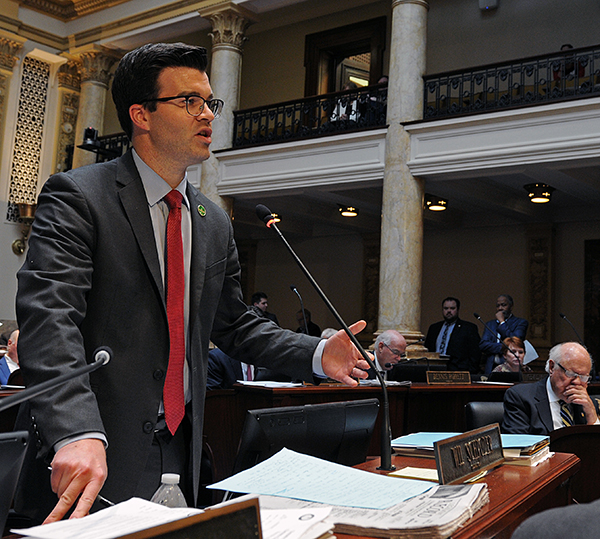 |
Sen.
Wil
Schroder,
R-Wilder,
presents
House
Bill
254, a
measure
he
sponsored
concerning
campus
free
speech
bill.
(Click
here
for
a
high-res
photo.)
|
FRANKFORT – Legislation,
dubbed the campus free speech bill, received
final passage by a 30-7 vote yesterday in the
Kentucky Senate.
The measure, known as House
Bill 254, would require the state’s public
universities to affirm they favor a free
marketplace of ideas where speech is not
suppressed because it’s deemed “offensive,
unwise, disagreeable, conservative, liberal,
traditional or radical.” It would also expand
areas commonly known as “free speech zones” on
many campuses to any accessible, open, outdoor
venue.
“I think everyone in this body
would agree that universities are meant to be
the place of discussion and debate,” said Sen.
Wil Schroder, R-Wilder, who carried the bill in
the Senate. “Yet, unfortunately, many of our
universities have policies in place to prohibit
the marketplace of ideas.”
The bill is sponsored by Rep.
Savannah Maddox, R-Dry Ridge, and Rep. Regina
Huff, R-Williamsburg.
Schroder said HB 254 was
similar to last year’s Senate Bill 237, which
passed the Senate but did not become law.
“I believe free speech,
openness and transparency are things we
desperately need in this government,” said
Senate Minority Floor Leader Morgan McGarvey,
D-Louisville. “Having been on two college
campuses of public universities, I can say that
I’ve experienced firsthand the need for free
speech.”
However, McGarvey said he
couldn’t support HB 254 out of concern it would
actually curtail free speech. He said it would
do that by limiting those who could counter
protest.
Schroder cited a Foundation
for Individual Rights in Education report that
found seven out of Kentucky’s eight public
universities currently have at least one policy
in place that is unconstitutional when it comes
to the First Amendment. For example, at least
one university requires students to remain in a
“free-speech zone” while they share their views
on religion and politics, he said.
END
March 15,
2019
Expungement bill
receives final passage
|
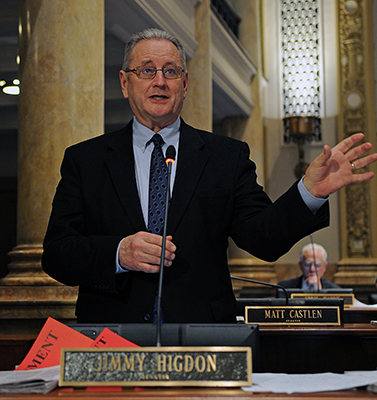 |
Sen.
Jimmy
Higdon,
R-Lebanon,
presents
Senate
Bill 57,
a
measure
he
sponsored
relating
to
expungements.
(Click
here
for
a
high-res
photo.)
|
FRANKFORT – Legislation to
expand the number of Kentuckians eligible to
have low-level felonies expunged from their
criminal records received final passage by a
36-1 vote yesterday in the state Senate.
The measure, known as Senate
Bill 57, would expand discretionary expungement
to all Class D felonies, except those that
involve a breach of public trust, sex offenses,
crimes against children and violent crimes that
may cause serious bodily injury or even death.
Another provision of SB 57 outlines how the
state would handle expungement requests for
crimes committed before 1975 when Kentucky
changed its penal code.
Final passage came after the
Senate concurred with amendments the House made
to SB 57. Sen. Jimmy Higdon, R-Lebanon, said
those changes included reducing the waiting
period to apply for expungement to five years.
The original version of the bill contained a
10-year waiting period. Under the new language,
any expungement would not become official until
the applicant paid the processing fee, but that
fee was cut in half to $250.
Sen. Gerald A. Neal,
D-Louisville, said SB 57 would provide a second
chance for people in society by removing
barriers for re-entry into the workforce.
“I think this is a common
sense, positive step forward,” he said. “I want
to commend (Higdon) for his hard work and
foresight.”
Senate Majority Floor Leader
Damon Thayer, R-Georgetown, explained his “yes”
vote.
“This has been a movement from
(Higdon) for as long as I’ve known him,” Thayer
said. “He is a strong believer in second chances
and I know it’s a big part of his Catholic faith
because I share that faith with him. But I also
believe it is a tribute to his patriotism and
what it means to be an American and give people
a second chance so they can go back to work,
provide for their families and have dignity.”
SB 57 now goes to the
governor.
END
March 15, 2019
Work Ready
Scholarship bill wins final passage
FRANKFORT—A bill that would
make the state’s Work Ready Kentucky Scholarship
program part of state law received final passage
yesterday in the Kentucky House by a vote of
85-0.
Senate Bill 98, sponsored by
Senate Majority Whip Mike Wilson, R-Bowling
Green, would codify the Work Ready Kentucky
Scholarship program that has provided assistance
for work certifications, associate’s degree work
and, more recently, high school students taking
coursework designed to benefit the state’s top
workforce sectors.
The scholarship program is
currently administered by executive order of the
governor.
SB 98 floor sponsor Rep. James
Tipton, R-Taylorsville, said the expansion of
the scholarship program to high school students
allows them to take two courses each year of
high school with state assistance.
A carryover in funding for the
program from the previous budget cycle will
cover program costs, Tipton told the House.
“We are not allocating any new
money with the passing of this legislation. The
funds are already there,” he said.
SB 98 now goes to the governor
for his signature.
END
March 14,
2019
Bill to prevent
vaping in schools approved by Senate panel
FRANKFORT -- A proposal
to prohibit the use of tobacco and vaping
products on school grounds was approved by the
Senate Health and Welfare Committee today.
House Bill 11 would ban
the use of tobacco and e-cigarrette products by
students, school personnel, and visitors in
schools and school vehicles. School boards would
be required to adopt policies on the ban by the
2020-2021 school year. Under an amendment made
to the bill when it passed the House earlier
this week, a local board of education
could opt schools out of the ban if they took
steps to do so within three years, if the bill
becomes law.
“The law will create a
healthier environment in Kentucky for students,”
said Rep. Kim Moser, R-Independence. “It creates
an environment where tobacco use is not the
norm.”
Moser said that the
bill will address the increasing use of vaping
products by students.
“In the last year we
have had about a 78 percent increase in high
schooler use of vaping products and a 48 percent
(increase) in middle schoolers,” said Moser.
Sen. Max Wise,
R-Campbellsville requested information about the
enforcement of the ban. “Who are we
actually talking about there, the school
employees who would enforce the policies?” he
asked.
“The schools boards
will make that determination. They really can
implement this through messaging and signage,”
said Moser.
Bonnie Hackbarth, vice
president for external affairs for the
Foundation for a Healthy Kentucky, said “an
educational approach is very effective” when
implementing policies banning tobacco use at
school.
“What we’ve found as
we’ve spoken to school districts across the
state is that it really has become
self-enforcing,” Hackbarth said. “Forty-two
percent of school districts now have …
tobacco-free schools policies. When they put
signs up for football games, a lot of times it’s
self-enforcing.”
House Bill 11 now goes
to the full Senate for consideration.
“This is a step in the
right direction,” said Sen. Ralph Alvarado,
R-Winchester. “…With the epidemic we have with
vaping in our schools, a whole new generation of
addicts are unfortunately coming out of our
schools. … It’s time to start taking some
action.”
END
March 14, 2019
Tax reform
bill heading to governor’s desk
FRANKFORT— Kentucky’s small
banks, nonprofits and some other entities would
get tax relief under a House bill that is now on
its way to the governor for his signature.
Agreement on House Bill
354—which passed by a final vote of 87-8 last
night in the Kentucky House—was reached by
members of the House and Senate in recent days.
The legislation as amended passed the Senate by
a vote of 34-3 earlier in the day.
Major
provisions of the bill would eliminate the sales
tax on nonprofit admission sales and allow
taxation of remote sales by online retailers per
last year’s U.S. Supreme Court decision in
South
Dakota v. Wayfair,
Inc.
But it was a repeal of the
state’s bank franchise tax that generated much
of the floor debate on the bill, sponsored by
House Appropriations and Revenue Chairman Steven
Rudy, R-Paducah. That provision would require
all banks in the state to instead pay corporate
income tax beginning in 2021.
Rudy said Kentucky’s small
community banks have suffered under the state’s
bank franchise tax, which was passed years
before the federal Dodd-Frank Act requiring
banks to increase their capital. Because the
franchise tax is based on a bank’s capital,
supporters of HB 354 say small banks have been
left financially-strapped.
Rudy said out-of-state banks
have taken advantage of that by buying out small
banks and shipping their capital out of
Kentucky.
Under the changes in HB 354,
he said, “hopefully the exodus of banks in this
state will stop and we will revitalize our
financial institutions.”
“Our tax climate and our
industry is constantly changing and it will
constantly evolve and we will constantly have to
be revisiting the tax code in the years to
come,” he added.
Sen. Christian McDaniel,
R-Taylor Mill, said HB 354 was part of an
ongoing process to modernize Kentucky tax code.
“Taxes
will always be something that none of us like,
but services will always be something that all
of us demand,” said McDaniel, who is chairman of
the Senate Appropriations & Revenue Committee.
“We strive to create a tax code that is fair,
that is equitable, that is good for our
citizens, and that attracts and retains
high-quality employers who provide good jobs and
pay people well to help them to succeed to the
maximum of their God-given potential.”
Minority Caucus Chair Derrick
Graham, D-Frankfort, voted for the bill but said
he hopes the General Assembly will act on
legislation that increases revenue for education
and other state needs in future sessions.
“We cannot continue to compete
with the other states…if our education system is
breaking down because we’re not adequately
funding our education system,” said Graham.
House Speaker David Osborne,
R-Prospect, informed all members that there is a
need to act on the bank franchise tax repeal in
the current session. He said 37 Kentucky-based
banks have left the state in the past five years
because “they are being taxed $56 million more
than any other corporate interest in the state
of Kentucky.
“And if takes leadership to stand up for
those people who make those jobs, then I’m
here to do it, and I would hope that every
single person in here would,” Osborne told
the House.
HB 354 would also include a lower property
tax rate for heavy equipment rentals,
exclude fees paid to enter fishing
tournaments from the state tax definition of
admissions, address extended warranties
involving small rural telecommunication
companies, and exclude poultry from the
sales tax on veterinary services.
Additionally, it would add a tax exemption
for National Guard training income, among
other tax changes.
Earlier in the day the House approved
pension income tax changes in House Bill 58
by a vote of 94-0. The bill, sponsored by
Rep. Regina Huff, R-Williamsburg, would
retroactively increase the amount of pension
income excluded from state taxation from
$31,110 to $41,110 to address tax changes
made in 2018. HB 58 would require the state
to automatically issue refunds for state
income tax collected on pensions above the
threshold of $31,110 beginning with the 2018
tax year.
HB 58 now goes to the Senate for
consideration. An emergency clause in the
bill would require the tax change in HB 58
to take effect immediately should it become
law.
END
March
13, 2019
Pension relief
bill for higher ed and others moves
FRANKFORT –
Kentucky’s regional universities and
quasi-governmental agencies could get relief
from skyrocketing pension costs under
legislation that passed the state Senate today
by a 25-12 vote.
“It would be an
understatement to say that our (Kentucky
Employees Retirement System) non-hazardous
pension system is in a time of crisis,” said
Sen. Christian McDaniel, R-Taylor Mill. “It
would further be an understatement to say that
the effects of the resulting contribution rates
are dramatically impacting the ability of both
our universities and our social services to
deliver the services that our citizens so
desperately demand,” said Sen. Christian
McDaniel, R-Taylor Mill.
The measure, known as
House Bill 358, would make changes to the
retirement plans for regional universities and
quasi-governmental agencies in order to give
them a financially viable mechanism to continue
to operate while still paying for as much of the
unfunded liability inside the pension as
possible for their employees.
“There is no solution
to (underfunded pensions) that doesn’t cost the
general fund a significant amount of money,”
said McDaniel, who is chairman of the Senate
Appropriations & Revenue Committee. “But at the
same time, there is no solution to this that
doesn’t demand that we find a way to help these
social services stay in business and help our
universities reduce their burden so they can
more affordably deliver a high-quality education
to the young people of the commonwealth.”
The first section of
the bill addresses the universities, McDaniel
said. It would allow, but not require, the
state’s regional universities to stop
participating in the KERS by July of next year.
University employees hired before 2014 could
stay in KERS or join a defined contribution
plan. All employees hired after 2014 would be
required to join the defined contribution plan,
similar to a 401(k) retirement plan.
The second section of
the bill addresses the quasi-governmental
agencies who participate in KERS. These agencies
could also stop participating but their
employees’ pensions would be frozen. They could
start participating in a defined contribution
plan that would also be offered to all new
hires.
For groups who stopped
participating in KERS, HB 358 contained
formulas, in the form of loans through the
retirement system, for the universities and
quasi-governmental agencies to pay for their
share of the unfunded liability.
Sen. Whitney
Westerfield, R-Crofton, said he was voting for
the bill because it would freeze the KERS
employer contribution rates for the universities
and quasi-governmental agencies for one more
year. Those institutions have complained the
pension costs were threatening their fiscal
health.
“It gives those folks
one further year of a reprieve on their rate
before they have to start deciding what staff to
cut or what services to cut,” he said. “I want
to thank (McDaniel) and members of his committee
for working on the bill. It is not an easy
problem to solve – clearly.”
HB 358 now goes back to
the House for its consideration of amendments
made in the Senate.
END
March 13, 2019
Midwife bill
advances through House
|
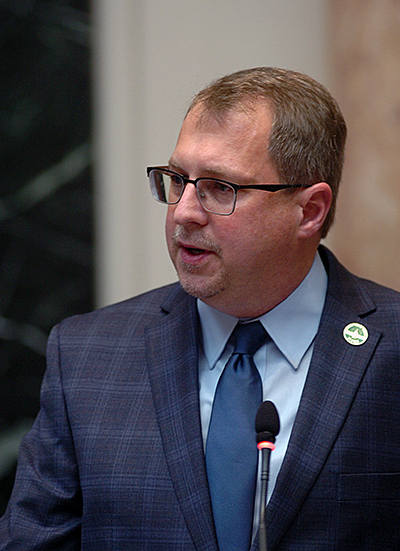 |
Rep.
Russell
Webber
discusses
Senate
Bill 84,
which
was
approved
by the
House on
a 96-1
vote.
(Click
here
for
a
high-res
photo.)
|
FRANKFORT — Kentucky
stopped issuing permits to home-birth midwives
back in 1975. Now a bill that would create a new
regulatory path for these practitioners is a
step closer to becoming law.
Senate Bill 84,
sponsored by Sen. Tom Buford, R-Nicholasville
and Senate Majority Caucus Chair Julie Raque
Adams, R-Louisville, was amended and passed by
the House on a vote of 96-1 today. Rep.
Russell Webber, R-Shepherdsville, said SB 84
would require the creation of a regulatory
framework for certified professional midwives,
or CPMs, while requiring collaboration between
CPMs and other health providers.
The result, Webber
said, would be a “full course” of prenatal and
postpartum care for the more than 700 women who
already choose home birth in Kentucky each year.
“This is not a bill
about whether or not to allow home births. Those
are going to happen. This is a bill about making
sure families who choose home birth have access
to safe and competent care providers,” Webber
told the House.
SB 84 as amended by the
House would require the advisory council created
by the bill to issue its recommendations for
regulatory guidelines for CPMs to the state
Board of Nursing within a year after the law
takes effect, should SB 84 become law. Those
guidelines would cover—among other
provisions—allowed use of medications, ordering
of medical tests, and policies for transfer to
hospitals when necessary.
“So CPMs play an
important role in childbirth in this state,”
said Webber. “They can signal yellow flags
before they become red flags in the health of a
mother or a baby.
The bill, as amended by
the House, would also clarify that physicians or
other licensed health care providers would not
be liable in legal actions taken against a CPM.
Webber said SB 84 would
make Kentucky the 34th state to legally
recognize licensed CPMs.
Buford explained the
importance of the legislation when he moved for
the initial passage of SB 84 in the Senate on
Feb. 21. The bill passed the Senate by a vote of
32-4 that day.
“This is a personal
choice made by these families for various
reasons,” Buford said. “We must ensure the
families who choose this option have access to
quality care through … the licensing of
midwives.”
Rep. Mary Lou Marzian,
D-Louisville, who is a registered nurse, said
she supports the bill. She said perhaps a future
General Assembly can consider adding CPMs as
health care providers for insurance and Medicaid
billing purposes.
SB 84 now returns to
the Senate for consideration of the bill in its
amended form.
END
March 13, 2019
Election contest bill advances to Senate
|
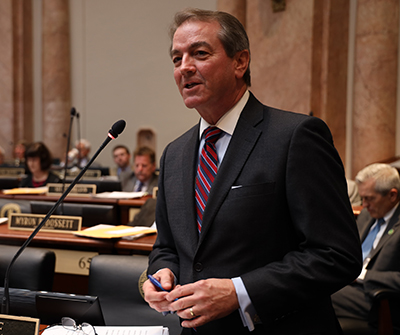 |
House Speaker David
Osborne, R-Prospect, speaks on House
Bill 522 relating to elections.
(Click
here
for a high-res photo.)
|
FRANKFORT—A bill that would give the General
Assembly future guidance in contested state legislative,
statewide and congressional elections has cleared the
Kentucky House.
House Bill
522, sponsored by House Speaker David Osborne,
R-Prospect, and House Minority Floor Leader Rocky
Adkins, D-Sandy Hook, would require an automatic vote
recount when a candidate for the General Assembly,
Congress or statewide constitutional office—including
the office of Governor—loses by 0.5 percent or less of
the vote.
The recount
would be held no later than the second Tuesday following
the election if the State Board of Elections determines,
based on the certified vote, that a recount is needed.
The cost of the recount would be paid by the state from
the General Fund surplus account or state’s budget
reserve trust fund, with any additional recount paid for
by the petitioner.
“In essence,
what House Bill 522 will do is it will trigger an
automatic recount for any election, for General Assembly
as well as statewide offices and, in some rare
occasions, for congressional offices if the vote is
decided by less than one half of one percent of the
total vote,” Osborne told his House colleagues
yesterday. “It also will provide for a process by which
(in such circumstances) a candidate can request and can
petition a court, as other races do, for that recount.”
An election
could still be contested, said Osborne, “if there are
other issues that are involved in the election contest
such as residency, such as ballot access,
eligibility—those things would still be subject to an
election contest which, again, by the constitution would
be handled by (the Kentucky House of Representatives).”
The bill was
filed in response to a state House election contest that
challenged the result of the 2018 general election for
Kentucky’s 13th House District. Rep. Jim Glenn,
D-Owensboro, narrowly won the election according to
initial results, which were subsequently contested by
his opponent, former State Rep. D.J. Johnson,
R-Owensboro. A recount indicated the election ended in a
tie.
Johnson withdrew the contest in early February, and
Glenn—who was seated as the State Representative for the
13th District on the first day of the session—retained
the seat.
“Hopefully this will give us guidance and give us
some automatic response in case of very, very close
elections,” Osborne said of HB 522.
Adkins was
randomly selected, along with eight other House members,
to serve on the House election contest board tasked with
handling the contested 13th House election earlier this
session. That experience, he told his colleagues, left
him and other lawmakers looking for a “bipartisan way”
to improve the statutory process for contested
elections.
“We thought it
was better to clarify and tighten up the statute to
where it did give the exact direction, recourse, avenue
that needed to be taken – to never put us, hopefully, in
the position that we were in when we first came into
session,” said Adkins.
HB 522 passed
the House by a vote of 94-0 yesterday. It now goes to
the Senate for consideration.
END
March
12, 2019
Vaping bill passes
House, moves to Senate
|
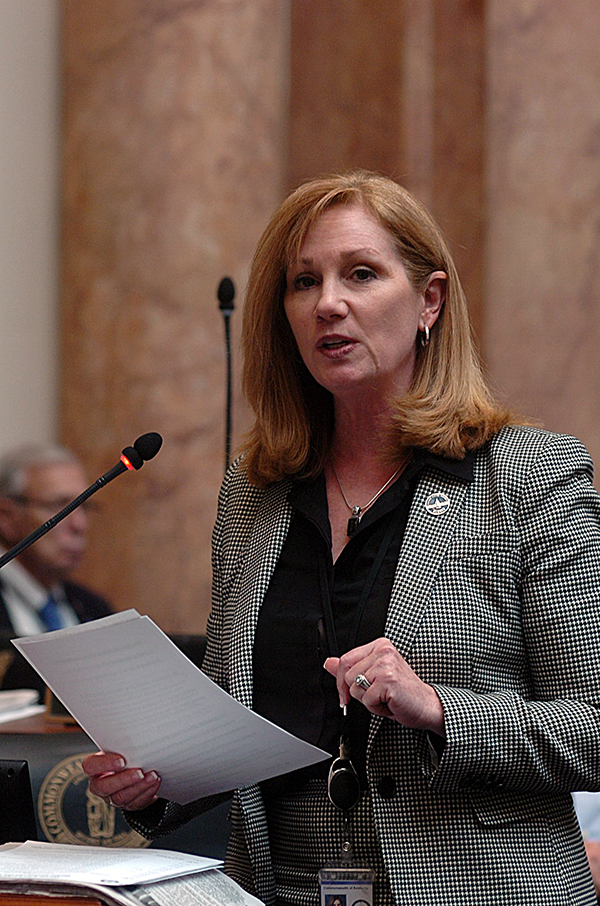 |
Rep.
Kimberly Poore
Moser, R-Taylor
Mill, speaks on
House Bill 11
relating to
student health.
(Click
here
for
a high-res
photo.)
|
FRANKFORT—The use of tobacco, e-cigarettes
and vaping devices would be banned at public schools—unless
school districts opt out of the ban—under a bill that has
passed the Kentucky House.
School districts would have up to three
years after the bill takes effect, should it become law, to
opt out of the ban under House Bill 11, sponsored by Rep.
Kimberly Poore Moser, R-Taylor Mill. The bill cleared the
House today on an 85-11 vote.
For school districts that don’t opt out of
the legislation, HB 11 would specifically prohibit students
from using e-cigarettes, vaping products or any tobacco
product on public school campuses, in school vehicles, or at
school activities starting with the 2020-21 school year.
School employees, volunteers or visitors would also be
prohibited from using those products on school property, or
on school trips while in the presence of students.
HB 11’s purpose “is to eliminate tobacco
use during school hours and at after-school events in order
to create an environment where tobacco use is not the norm.
This would include the use of e-cigarettes and vaping,” said
Moser.
Those who violate restrictions on the use
of tobacco, e-cigarette or vaping products on school grounds
as proposed by HB 11 would face up to $5 in fines—the same
amount of fines allowable by current law for those who smoke
tobacco illegally on school property.
HB 11 will not prohibit possession of
tobacco, e-cigarette or vaping products on school property,
according to Moser.
Moser told her colleagues that the U.S.
Surgeon General and National Institute on Drug Abuse “has
called the use of electronic cigarettes ‘the biggest health
crisis in the nation affecting youth.’” One in five U.S.
high school students and one in 20 U.S. middle schoolers are
using e-cigarettes according to the federal Centers for
Disease Control and Prevention, she said.
Supporting the bill was Rep. Cluster
Howard, D-Jackson. Howard said his home region of Eastern
Kentucky has a high rate of tobacco use, heart-related
disease and opioid abuse.
“All of us know
that tobacco use and alcohol are gateway drugs,” Howard
said. “Anything we can do to address that will help us.”
HB 11 now goes to the Senate for its
consideration.
END
March 11, 2019
Senate panel advances a
child bicycle helmet bill
|
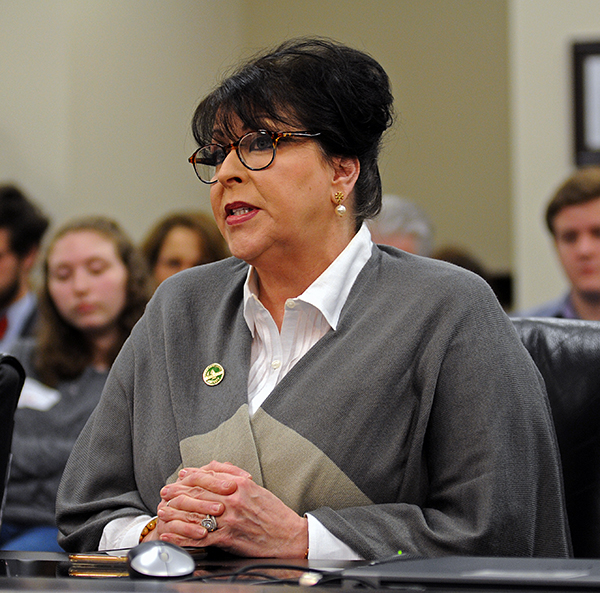 |
Rep.
Regina Huff,
R-Williamsburg,
speaks on House Bill
280, a measure she
sponsors to require
children under 12 to
wear helmets when
riding bikes.
(Click
here
for
a high-res photo.)
|
FRANKFORT – On April 20, 2010, TJ
Floyd was riding his bicycle when he crashed into the back
of his older brother’s bike, flipped over his handlebars and
hit his head on the concrete.
He wasn’t wearing a helmet and
suffered an acute subdural hematoma.
“Frankly, they brought the chaplain
in because he was in the stages of dying,” said his mother,
Heather Floyd, while testifying in support of a proposed
bicycle helmet law before today’s Senate Health and Welfare
Committee.
The legislation, known as House
Bill 280, would require the use of bicycle helmets for
operators and passengers under the age of 12. Violators,
their parents or guardians would be given a courtesy
warning, under language in the bill.
Rep. Regina Huff, R-Williamsburg,
said she introduced the legislation because, “I saw a
traumatic brain injury take one of the strongest people I
know ... and render him helpless, so we want to ensure we
are protecting the brains of our children.”
Huff said it was also the right
thing to do economically because just one brain injury can
cost $5 million to $7 million over one’s lifetime.
Sitting alongside Heather Floyd and
Huff was TJ, who is now 16.
"His independent future was taken
from him, and he's probably never going to live on his own
again,” Heather Floyd said. “No matter how good he's doing
there are just certain limitations and certain things that
you can't overcome because you can't fix it.
“My blessing in this is he's happy
and he laughs."
She added that HB 280 would be a
teaching tool to prevent another Kentucky kid from
experiencing this kind of traumatic brain injury.
HB 280 advanced out of committee
and now goes to the full Senate for further consideration.
END
March 8,
2019
This Week at the State
Capitol
March 4-7, 2019
FRANKFORT – While issues of the day
command much of the focus during sessions of the Kentucky
General Assembly, lawmakers also find opportunities to plan
ahead for issues expected to arise in the coming years.
That was the case this week as
lawmakers furthered preparations for Kentucky’s
participation in the 2020 U.S. Census. A resolution that
passed the House chamber urges local communities across
Kentucky to establish Complete Count Committees to localize
Census efforts with the goal of ensuring maximum response
for the federal government’s population count.
The U.S. Constitution mandates that
a census of the nation’s population be conducted every ten
years. Getting a good response to Census counts are
important to states because more than 130 federal programs
use Census data to distribute funds. Research shows that
more than $15 billion in annual federal spending for
Kentucky is guided by Census data.
Census results can help determine
which schools receive funds for improvements, where new
roads are built, and how people are represented in
government. Strong participation in the census among a
state’s citizens can help ensure that a state receives a
fair share of federal funds.
House Concurrent Resolution 137
urges local communities to establish Complete Count
Committees and to engage in publicity, outreach, and
educational efforts to help overcome cultural, economic,
technological, and linguistic barriers to participation in
the Census. The resolution was approved by the House and
will next go to the Senate for consideration.
With only a handful of days left in
this year’s legislative session, which is scheduled to end
on March 28, the pace of activity around the Capitol
continues to increase. Measures that took steps forward
March 4-7 include bills on the following issues:
Foster children.
A “foster child bill of rights” is on the way to the
governor’s office after being approved by both the House
and Senate. House Bill 158 outlines 16 rights for
children in out-of-home placement in Kentucky, including
rights to “adequate food, clothing and shelter,” “a
safe, secure, and stable family,” and “freedom from
physical, sexual, or emotional injury or exploitation.”
The legislation also would reduce the time for a parent
or guardian to consent to voluntarily placing a child
for adoption from 20 days to 72 hours.
Medical marijuana.
Legislation that would legalize medical marijuana
was approved by the House Judiciary Committee and now
awaits consideration by the full House. House Bill 136
would allow Kentuckians to be prescribed medical
marijuana that is licensed to be grown, processed and
dispensed in the state. Only patients with specific
conditions outlined could be prescribed medical
marijuana, and then only by their regular physician.
Thirty three other states have already legalized medical
marijuana.
Student vaping.
Legislation designed to curb e-cigarette use, or “vaping,”
in public schools passed the Senate by a 33-3 vote.
Senate Bill 218 would establish an anonymous reporting
system for students to report vaping, require that
parents be notified if their child was caught vaping and
direct students to free vaping cessation programs. It
would also encourage school boards to provide awareness
programs to teachers and students on the dangers of
vaping. The U.S. Surgeon General warns that nicotine
exposure during adolescence could harm brain development
and affect learning, memory and attention. Senate Bill
218 passed the Senate and now goes to the House.
Online harassment.
Legislation that would criminalize a type of
online harassment passed the Senate 26-10 and was sent
to the House.
Senate Bill 240,
dubbed the “anti-doxing measure,” would make it a crime
for a person to use online communications to release
identifying information of a minor with the intent to
intimidate, abuse, threaten, harass or frighten. The
information would include first and last names, birth
dates, Social Security numbers, home addresses, school
locations, email addresses or telephone numbers. Such
actions would be a misdemeanor but could be enhanced to
a felony if physical harm, monetary loss or death
resulted in the online communications.
Military and veterans.
Kentucky would designate a special flag to honor
fallen U.S. military service members and veterans under
a bill that was approved by the House on a 99-0 vote and
sent to the Senate. House Bill 406 would name the “Honor
and Remember” flag as an official state emblem honoring
U.S. service men and women who died in the line of duty
or as a result of serving. At least a dozen states have
passed similar legislation.
Citizens who want to offer feedback
on the issues under consideration can share their thoughts
with Kentucky lawmakers by calling the General Assembly’s
toll-free message line at 1-800-372-7181
END
March 7,
2019
Senate takes aim at ‘doxing’ of minors with
bill
|
|
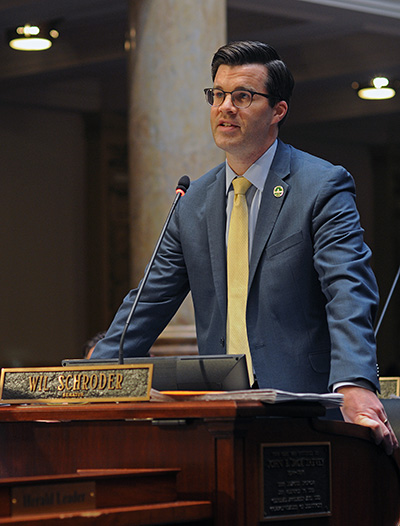 |
Sen. Wil Schroder, R-Wilder,
explains Senate Bill 240, dubbed
the “anti-doxing bill,” today on
the Senate floor.
(Click
here
for a high-res photo.)
|
FRANKFORT – Legislation to criminalize a
type of online harassment passed the state Senate today by a
26-10 vote.
Senate Bill 240, dubbed the “anti-doxing
measure,” would make it a crime for a person to use online
communications to release identifying information of a minor
with the intent to intimidate, abuse, threaten, harass or
frighten. The information would include first and last
names, birth dates, Social Security numbers, home addresses,
school locations, email addresses or telephone numbers.
Such actions would be a misdemeanor but
could be enhanced to a felony if physical harm, monetary
loss or death resulted in the online communications.
“We obviously can’t undo the harm that was
done to Covington Catholic student Nick Sandmann and his
family, but hopefully with the passage of Senate Bill 240,
we can discourage this event from happening to others,” said
sponsor Sen. Wil Schroder, R-Wilder. He was referencing the
online harassment of Sandman that followed the posting of a
video of him with a Native American protester in Washington
D.C.
Minority Floor Leader Morgan McGarvey,
D-Louisville, said he couldn’t support SB 240 out of concern
it would add unconstitutional restrictions on free speech
and would be too broadly applied
“Doxing is a problem,” Morgan said. “Cyberbullying
is a major problem, but here we are responding with
legislation that casts way too wide of a net that will
ensnare people ... even minors.”
Sen. Christian McDaniel, R-Taylor Mill,
said he supported SB 240, in part, because no one offered
alternative legislation to address the problem.
“We cannot sit back and continue to ignore
the threats of a modern world,” he said, “and the ability
from someone completely around the globe, across the nation
or maybe just down the street to encourage another human
being to harm our children.”
Despite some reservations, Sen. Robin L.
Webb, D-Grayson, said she supported SB 240. She said it
would help protect children who are pursuing a cultural
activity such as hunting, fishing or showing farm animals
from online harassment from radical animal rights activists.
Sen. Tom Buford, R-Nicholasville, said SB
240 could set an example that doxing of youth will not be
tolerated, no matter who is doing it.
“Perhaps the bill goes too far, but I’m
sick and tired of the trash that comes from some students at
these schools that identify children out there that causes
them to be bullied in the days of their remaining school
life,” he said. “Yeah, maybe it is too much, but I’m willing
to go that far. Let’s stop it. We can stop it here.”
SB 240 now goes to the House for its
consideration.
-- END --
March 7, 2019
Medical marijuana bill advances to full House
|
|
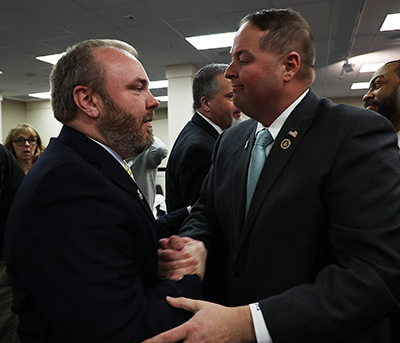 |
Rep. Jason Nemes,
R-Louisville, (at left) and Rep. John Sims
Jr., D-Flemingsburg, stop to talk after
testifying on House Bill 136, a bill that
would legalize medical marijuana in
Kentucky.(Click
here
for a high-res photo.)
|
FRANKFORT—A bill that would legalize medical marijuana under
Kentucky law is on its way to the full House for a vote after
clearing the House Judiciary Committee last night.
House Bill 136, sponsored by Rep. Diane St. Onge, R-Fort Wright
and Rep. Jason Nemes, R-Louisville, would allow Kentuckians to be
prescribed medical, or medicinal, marijuana that is licensed to be
grown, processed and dispensed in the state. Only patients with
specific conditions outlined in the bill could be prescribed medical
marijuana, and then only by their regular physician.
Conditions that could be treated by medical marijuana under HB
136 include epilepsy, multiple sclerosis and Crohn’s disease, to
name a few.
Thirty three other states including Ohio have already legalized
medical marijuana, said St. Onge. She called HB 136 the “tightest”
medical marijuana legislation in the country.
The bill would not allow medical marijuana to be smoked, would
not allow marijuana plants to be grown in patients’ homes, and would
limit the THC (the main hallucinogenic compound in marijuana)
content of processed medical marijuana to 70 percent. Excise tax
revenue generated by the bill would be put in a trust fund to help
cover medical marijuana prescription costs for indigent Kentuckians.
St. Onge said HB 136 isn’t about revenue--it is about compassion
for nearly 60,000 Kentuckians living with chronic pain and other
health issues.
“We feel that we are not serving the Commonwealth and her
citizens well by ignoring this large population of people who cannot
find any comfort,” said St. Onge.
Nemes pointed out safety provisions in the bill designed to
protect patients who could be prescribed medical marijuana should
the bill become law.
“We hear a lot today about how marijuana is so much more potent
than it used to be, and that’s true,” said Nemes. “Well, the good
thing about this bill is, the people who need marijuana to help
themselves, that product they’ll be buying at the dispensary will
have been tested to make sure that it’s safe.”
Questions about how an employer could respond to an employee’s
medical marijuana use should HB 136 become law were answered by St.
Onge, who said employers would not be precluded from having a
zero-tolerance drug policy in their workplace.
“The company can say we have a zero-tolerance program in effect,
and you are put on notice of that,” she told the committee, adding
that the bill is strictly for medical marijuana and not recreational
marijuana.
Speaking against the bill was Louisville-area pain specialist
Dr. James Patrick Murphy, MD. He said more study is needed on
medical marijuana before it is prescribed to patients.
“We’re just not ready yet for it to be a medicine to be
prescribed. It’s simply not a medicine to prescribe,” he told the
committee. St. Onge disagreed.
“There are mistakes that are made with the FDA. They are not
God, they are not foolproof,” she said. “They are important, we want
them to study but in the meantime these … people who are using
(medical marijuana) and garnering some measure of their life back,
some amount of relief, these people need to be listened to also.”
Rep. Angie Hatton, D-Whitesburg, said she supports the
legislation. Hatton said opioid deaths have decreased by as much as
25 percent in state that have legalized medical marijuana.
“It could be such an important tool to help those who are
suffering,” said Hatton. “It’s not physically addictive, it’s been
around for 5000 years, it’s legal in 33 states, still I’m aware of
no deaths that have been reported. In Kentucky, we have four deaths
per day from opioid overdose.”
The bill ultimately passed the committee with overwhelming
support. Sixteen committee members voted in favor of passing the
bill out of committee. Only one member opposed the bill, and one
member --House Judiciary Committee Chair Rep. Jason Petrie, R-Elkton
-- passed on the vote.
Petrie said he has “lingering questions” about how the
legislation would be impacted by federal and financial rules. But,
Petrie said, he appreciates the work that the sponsors have done on
the bill.
“I still have concerns and I think those concerns need to be
addressed. But I’m not moving the target on you,” he said. “I think
the bill is much better.”
END
March 6, 2019
Foster child bill of rights bill
receives final passage
FRANKFORT—Kentucky’s foster child bill of rights’ bill
will soon be delivered to the governor after receiving final passage by
a vote of 94-1 today in the Kentucky House.
The list of 16 statutory rights for children in
out-of-home placement in Kentucky is a key component of House Bill 158,
sponsored by House Speaker Pro Tempore David Meade, R-Stanford, who told
his House colleagues last month that the list complements a foster
parent bill of rights already in statute.
Included on HB 158’s list of rights for foster children are the
rights to “adequate food, clothing and shelter,” “a safe, secure, and
stable family,” and “freedom from physical, sexual, or emotional injury
or exploitation,” among several others.
HB 158 would also require background checks on child
residential home staff as required under a 2018 federal law, and clarify
rules for searches of the state’s “putative father” registry—a state
registry created by the 2018 General Assembly for men who want parental
rights to a child they claim to have fathered.
Additionally, HB 158 would reduce the time for a
mother, father or other legally consenting individual to voluntarily
place a child for adoption. Meade said a person’s voluntary consent to
place a child for adoption is final after 20 days under current state
law. HB 158 would reduce that period to 72 hours.
The 72-hour period is standard in several states, said
Meade.
“I talked to someone the other day who’s adopting a
child out of state, and they asked the attorney of the child-placing
agency ‘Why do you not come to Kentucky to adopt children?’ And he said
‘Because your revocation period is far too long and parents do not want
to adopt from there,’” Meade told the House. “That is why many of our
parents are adopting from out of state.”
“We’re coming in line to help get some of our children
adopted,” he added.
Rep. Wilson Stone, D-Scottsville, who voted in favor
of the bill, spoke on the revocation period change.
“Certainly you want mothers to make a sound decision
when they make a decision,” said Stone. “Hopefully this will help them
do that quickly.
The Senate approved HB 158 on a 36-0 vote earlier in
the day today.
END
March 6, 2019
Foster child bill receives Senate approval
|
|
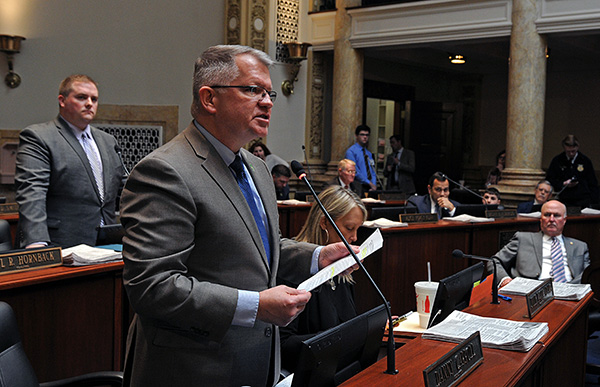 |
Sen. Danny Carroll, R-Paducah,
presents an amendment concerning House Bill 158, dubbed
the foster child “bill of rights.”
(Click
here here for a high-res photo.)
|
FRANKFORT – The foster child “bill of rights”
moved a step closer to becoming law today after being amended and passed
by the Kentucky Senate.
The Senate voted 36-0 to pass the measure,
known as House Bill 158, sponsored by House Speaker Pro Tempore David
Meade, R-Stanford, and approved by a 99-0 vote in the House on Feb. 20.
Sen. Whitney Westerfield, R-Crofton, who
presented HB 158 for a vote in the Senate, said it would create a
statutory “bill of rights” for Kentucky children in foster care and
other out-of-home care placements. He added that HB 158 would also bring
Kentucky in compliance with the federal Family First Prevention Services
Act of 2018. That act seeks to curtail the use of group care for
children and instead places a new emphasis on family foster homes.
Westerfield said a Senate amendment addressed
timeframes concerning consent to a child’s adoption and searches of
Kentucky’s “putative father” registry – a state registry created under
House Bill 1 of 2018 for men who want parental rights to a child they
claim to have fathered.
A third change would remove child-placement
agencies, or private agencies, from a background check provision.
Westerfield said there were concerns it would cause a backlog of
requests for fingerprint checks.
HB 158 now returns to the House to see if
its members agree with the Senate changes to the measure
.
-- END --
March 5,
2019
Bill to address “vaping” in school moves to House
|
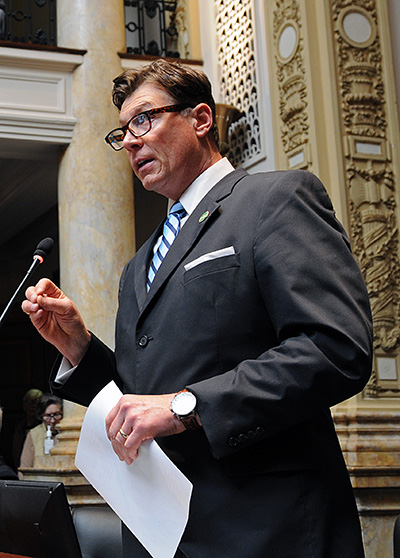 |
Sen. Brandon Smith,
R-Hazard, presents Senate
Bill 218, an act relating to
the prevention of smoking
and vaping by students.
(Click
here
for a
high-res photo.)
|
FRANKFORT – A bill designed to curb e-cigarette
use, or “vaping,” in public schools passed the state Senate today by a
33-3 vote.
Senate Bill 218, dubbed the “vaping
bill,” would establish an anonymous reporting system for students to
report vaping, require that parents be notified if their child was
caught vaping and direct students to free vaping cessation programs.
Another provision would encourage school boards to provide awareness
programs to teachers and students on the dangers of vaping
.
Sponsor Sen. Brandon Smith, R-Hazard, said the
bill was a collaboration between him and a group of Johnson County
Middle School students. Eight students from the school testified on
behalf of SB 218 last month before the Senate Health and Welfare
Committee.
“I think it speaks volumes that these young
people in eastern Kentucky really want to be involved in shaping what’s
going on in their school,” Smith said. “For any of you following the
national news, this has become a big issue of late.”
The Food and Drug Administration has been
advocating for a plan that would sharply restrict the sale of flavored
e-cigarettes. Federal regulators want to curb a surge in underage vaping,
which they claim will lead to a whole new generation addicted to
nicotine.
“First, I want to compliment the students from
Johnson County Middle School,” said Sen. Stephen Meredith,
R-Leitchfield, who chaired the committee which took the students
testimony. “They did a phenomenal job with their presentation. They were
articulate. They had done their homework. They did great research.”
Meredith said he enthusiastically supported SB
218 but was concerned it didn’t go far enough. He advocated for raising
the age someone can purchase tobacco or vaping products to 21.
In addition to curbing vaping in schools,
Meredith said it would protect tobacco farmers. He said it would do this
by helping persuade the FDA that national regulations, which could be
more economically damaging to farmers, were not needed.
Majority Floor Leader Damon Thayer,
R-Georgetown, stood in support of SB 218 and to address issues raised by
Meredith.
“These issues swirling around here today are
not going to go away,” Thayer said. “We need to consider making sure we
are doing everything we can to provide the information so people like
me, who are 51 years old, don’t end up with both parents dead too early
in life because of the effects of this carcinogenic product or
products.”
Sen. Ralph Alvarado, R-Winchester, also voted
for SB 218 and spoke on tobacco use in Kentucky. He said Kentucky’s
youth smoking rate is the worst in the country and higher than the
national adult smoking rate.
“We wonder how we got to this situation where
vaping has become such a huge epidemic in our schools,” said Alvarado,
who is also a medical doctor. “I think a lot of our kids thought it was
harmless at first. It was supposed to be a smoking cessation product.
That is how it was initially developed.”
SB 218 now goes to the House for its
consideration.
-- END --
March 5, 2019
E-scooter bill moves to governor’s
desk
FRANKFORT—Electric scooters like those
now available for rent in Louisville would be regulated by
Kentucky law under a bill that will soon be delivered to the
governor for his signature.
House Bill 258, sponsored by Rep. Ken
Upchurch, R-Monticello, would both define and set operating
standards for “electric low-speed scooters”—or
e-scooters—like the Bird-brand scooters that have been
available for rent via a phone app in Louisville since last
year. Similar rentals are available in more than 100 cities
worldwide.
The House voted 95-1 today to approve
HB 258 after agreeing to what Upchurch called “changes that
are technical in nature” made by the Senate. Those changes
would allow two- or three-wheel and seated scooters while
refining the definition of “motor scooter” at the Kentucky
Transportation Cabinet’s request, Upchurch said.
HB 258 would allow e-scooters to
legally operate much like bicycles on public streets and
bicycle paths while limiting speeds to 20 mph and set a
minimum e-scooter rider age of 16.
Proponents of the bill who spoke on HB
258 before the House Transportation Committee on Feb. 12
said the measure would not prevent local governments from
further regulating e-scooters.
HB 258 passed the Senate 36-0 last
week.
END
March
5, 2019
Voter bill advances in
House
|
|
|
|
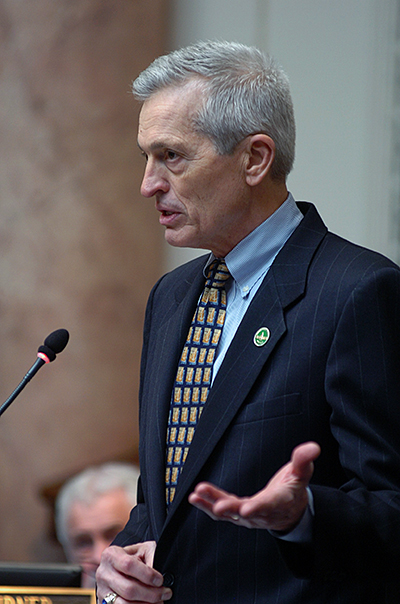
Rep. Jerry T. Miller, R-Louisville, speaks on
voter legislation in House Bill 325.
(Click
here
for a high-res photo.)
|
FRANKFORT—Kentucky voters who switch their
party affiliation in the months immediately before a primary election
could not vote in that election under a bill that has cleared the
Kentucky House.
House Bill 325, sponsored by Rep. Jerry T.
Miller, R-Louisville, would prohibit those who switch parties on or
after Dec. 31 immediately preceding a primary election from voting in
the upcoming primary. New voters who register to vote after Dec. 31 must
stay registered with the same party until the following primary in order
to vote in that election.
Miller said HB 325 prevents what he called
“late party switchers.”
“If a registered voter who is on the rolls (in
late December) later decides to change their registration thinking they
can vote in the primary, they de-register, re-register and it’s
currently considered a new voter,” said Miller. “And they can vote in a
different primary than (the one) in which they were registered on Dec.
31. This bill prevents that.”
HB 325 would also allow county clerks to send a
mail-in absentee ballot application to an eligible voter by e-mail.
Current law gives eligible voters seven days before an election to get
their mail-in absentee ballot applications to their county clerk, and
that language would be retained in HB 325.
“It does not change existing law in terms of
seven-day lead time,” said Miller.
Miller said HB 325 incorporates elements of two
bills—HB 273 and HB 274—that were passed by the 2018 General Assembly
but vetoed by the governor after the 2018 Regular Session had concluded.
Because the session had ended, lawmakers could not vote to override the
vetoes.
Speaking in support of HB 325 was House
Minority Caucus Chair Derrick Graham, D-Frankfort. He said the changes
in the bill were part of committee discussions with Kentucky’s county
clerks.
“I appreciate you working (on this) because I
think we need to open the process or at least try to expand the process
to guarantee that every individual who wants to vote is able to vote,”
said Graham.
HB 325 passed the House by a vote of 92-4. It
now goes to the Senate for consideration.
END
March 5, 2019
House advances bill to
recognize ‘Honor and Remember’ flag
|
|
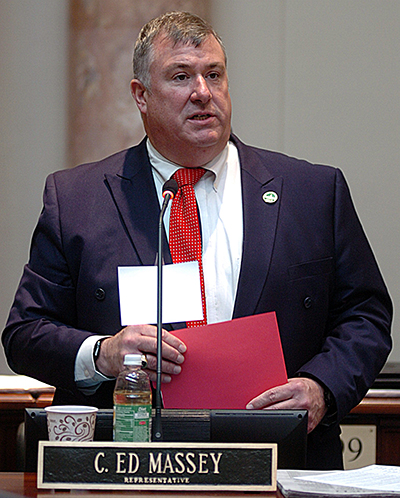 |
Rep. C. Ed Massey, R-Hebron, calls
for a vote on House Bill 406.
(Click here
for a high-res photo.)
|
FRANKFORT—Kentucky would designate a special flag to
honor fallen U.S. military service members and veterans
under a bill that has advanced in the Kentucky General
Assembly.
Should House Bill
406 become law, it would name the “Honor and Remember” flag
as the state’s official emblem in honor and remembrance of
U.S. service men and women who died “in the line of
duty”—including those killed while serving or as a result of
serving, which the Honor and Remember flag official web site
says includes death as a result of PTSD, exposure to Agent
Orange, and other causes.
The bill,
sponsored by Rep. C. Ed Massey, R-Hebron, and Rep. Kevin
Bratcher, R-Louisville, passed the House 99-0 yesterday and
is now before the Senate.
‘In honor of all
of those men and women who have sacrificed their lives for
our nation, for our state, and in honor of those who are
still sacrificing their lives on the basis of approximately
22 and more a day, I move for passage,” of HB 406, Massey
told his House colleagues.
At least a dozen
states have passed legislation similar to HB 406 to date.
Several House members who stood and spoke in favor
of HB 406 said they were supporting the bill in honor of a
fallen U.S. military service member. One of those
legislators was Rep. Melinda Gibbons Prunty, R-Belton, who
told the House that she was casting her vote in in honor of
Army Spec. Eric Bivins of Muhlenberg County.
Bivins took his
own life in 2017 after struggling with PTSD triggered by his
experiences during Operation Iraqi Freedom, said Prunty.
“I promised to
bring this forward … and I gladly cosponsor HB 406,” Prunty
told her colleagues.
The movement to
create the Honor and Remember flag was initiated by George
Lutz after his son, Army Pfc. George A. Lutz II of Virginia,
was killed in action in Fallujah, Iraq in 2005. The Honor
and Remember web site calls the flag a “universally
recognized symbol” of remembrance.
END
March
4, 2019
Senate amends taxation bill, returns it
to House
FRANKFORT – Legislation that would
address issues that surfaced after last year’s tax overhaul
passed the Senate today by a 33-0 vote.
House Bill 354, as amended by the
Senate, “addresses taxation issues that have been
confounding nonprofits around the commonwealth, frankly, for
many many decades,” said Sen. Christian McDaniel, R-Taylor
Mill. “For the first time, we make clear in statute that
sales from onetime fundraising events are not subject to the
sales tax of the commonwealth.”
The Senate Appropriations & Revenue
Committee chairman said the measure would also exempt
taxation on the sales of tickets to charity events hosted by
nonprofits.
Other provisions of HB 354 would
clarify there be no tax on veterinary services for poultry,
require online retailers to collect sales taxes for
third-party sellers using the platforms and would allow
gambling losses to be deducted from winnings on state income
tax returns.
HB 354 also included language that
would exempt the smallest of businesses, such as a teenager
who cuts his neighbor’s grass, from being required to
collect sales taxes on their services.
While HB 354 will now be returned to
the House for a concurrence vote, Senate President Robert
Stivers II, R-Manchester, said HB 354 would likely end up in
a conference committee. That’s a joint committee of Senators
and Representatives directed to reach agreement on
legislation on which the two houses are unable to agree.
END
March 4,
2019
Lawmakers revise
General Assembly’s 2019 Session Calendar
FRANKFORT – The Kentucky General
Assembly will begin its veto recess on March 15, one day
later than originally scheduled, under changes Senate and
House leaders have made to the 2019 Regular Session
Calendar.
The 2019 session is now scheduled for
final adjournment on March 28, one day earlier than
previously scheduled.
The revised 2019 Regular Session Calendar can be
viewed online at:
https://legislature.ky.gov/Documents/19RS_Calendar.pdf.
END
March
1, 2019
This Week at the
State Capitol
Feb. 25-March 1
FRANKFORT -- The Kentucky General
Assembly’s 2019 session passed a major milestone this week as
bills passed by both the Senate and House began arriving on the
governor’s desk to be signed into law.
The first bill of the year delivered to
Gov. Matt Bevin’s office was Senate Bill 4, a measure that would
require candidates for public office in Kentucky to
electronically file their campaign finance reports starting in
2020. Current law requires only candidates for statewide office
to electronically file campaign finance reports. Candidates who
raise less than $3,000 during a reporting period would be exempt
from the e-filing requirement.
By week’s end, several more bills were
delivered to the governor, including a comprehensive school
safety bill that is widely considered to be many lawmakers’
highest-priority bill of the year.
The school safety bill, Senate Bill 1,
is the product of a specially-formed committee that travelled
the state last year to discuss school safety and collect
feedback. The measure calls for improving student safety on a
variety of fronts by establishing a state school safety marshal,
conducting risk assessments, boosting safety and prevention
training, requiring superintendents to appoint a school safety
coordinator, promoting the assignment of a school resource
officer to each school, increasing awareness of suicide
prevention efforts, encouraging collaboration with law
enforcement, and, as funds become available, hiring more
counselors in school districts.
The proposal also calls upon the state
to make an anonymous reporting tool available to each school
district.
Other measures that advanced between
Feb. 25 and March 1 included bills on the following topics:
Felony
expungement. Senate Bill 57, which was approved by the
Senate on a 35-2 vote, would increase the number of
Kentuckians eligible to have low-level felonies expunged
from their criminal records. The measure would expand
discretionary expungement to all Class D felonies, except
those that involve a breach of public trust, sex offenses,
crimes against children and violent crimes that may cause
serious bodily injury or death. The bill has been delivered
to the House for consideration.
Youth vaping.
Senate Bill 218, which received a Senate committee’s
approval and now awaits the full chamber’s consideration, is
intended to curb the alarming number of children and teens
susceptible to nicotine addiction through the use of
e-cigarettes, or vaping products like Juuls. The legislation
would establish an anonymous hotline for students to report
vaping, require that parents be notified if a child was
caught vaping and encourage youth who vape to enroll in
local health department smoking and vaping cessation
programs. It would also encourage school districts to
establish awareness campaigns about health concerns
surrounding vaping. The U.S. Surgeon General warns that
nicotine exposure during adolescence could harm brain
development and affect learning, memory and attention.
Abortion.
Performing an abortion due to a decision based on the
unborn child’s gender, race, color, national origin or
disability would be a felony offense under a bill that
passed the Kentucky House. House Bill 5 passed the House on
a vote of 67-25. It now goes to the Senate for
consideration.
Concealed carry.
Kentucky would become the 16th state to allow
concealed firearms to be carried with without a concealed
carry permit under a bill that received House approval on a
60-37 vote. Senate Bill 150 would allow Kentuckians age 21
and older who are legally eligible possess a firearm for
permitless carry anywhere that those with a concealed carry
license are allowed to possess a firearm. Permitless carry
would not be allowed where prohibited by federal law or
otherwise prohibited. The bill, which was approved by the
Senate last month, next goes to the governor’s desk.
Student loan
debt. The Keep Americans Working Act of 2019 was
approved by the Senate this week, which means the bill now
has both chambers’ approval and is ready to be delivered to
the governor’s desk. House Bill 118 would prohibit someone
from having an occupational license suspended or revoked
because of delinquency on a student loan or work-conditional
scholarship. The bill would also encourage a person who is
in default or delinquent in the payment of a student loan to
contact the appropriate student loan servicer to establish a
voluntary pay agreement. The measure is meant to help keep
people with student loan debt out of poverty and in the
workforce.
Citizens who want to offer feedback on
the issues under consideration can share their thoughts with
Kentucky lawmakers by calling the General Assembly’s toll-free
message line at 1-800-372-7181.
END
March
1, 2019
Bill addresses assisted-living
community exploitation
|
|
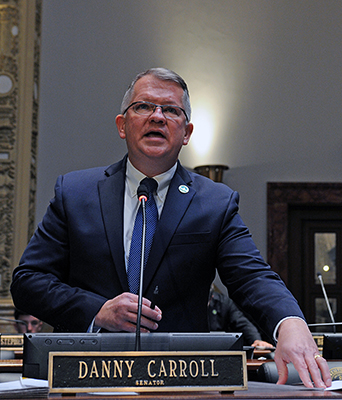 |
Sen. Danny Carroll, R-Paducah,
presents Senate Bill 128, an act he
sponsored related to assisted-living
communities.
(Click
here
for a high-res photo.)
|
FRANKFORT – Senate Sen. Danny
Carroll recounted a call he received last year from a person
concerned their relative was being financially exploited
while residing in an assisted-living community. The Paducah
Republican then received a second call about the safety of
other residents of that community and other affiliated
facilities.
The former police officer said his
inquiry uncovered that the assisted-living community was
manipulating the state’s oversight system to delay sanction
hearings against it indefinitely.
“There was no accountability
whatsoever for this particular organization,” Carroll said
from the Senate floor today.
To prevent similar abuses from
occurring in the future, Carroll said he introduced Senate
Bill 128. The measure would prohibit people convicted of
felonies related to theft, drug abuse, elder abuse, sex
abuse, child abuse and other crimes from owning, managing or
operating an assisted-living community.
Another provision would stop the
perpetual delays in sanction hearings that nearly render the
state’s oversight authority useless. The final part of the
bill would allow state inspectors to get a court order to
close any facility that flagrantly flaunts the state
oversight laws.
“This bill is something that will
help protect our seniors,” Carroll said.
Stressing that he didn’t think the
organization’s behavior was common across the state, Carroll
said, “This was the extreme exception rather than the rule.”
The Senate passed SB 128 by a 36-0
vote. The measure now goes to the House for its
consideration.
END
March 1, 2019
Permitless carry bill
advances
|
|
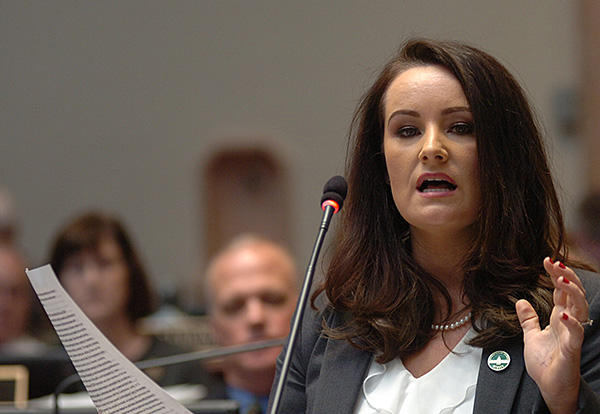 |
Rep. Savannah
Maddox, R-Dry Ridge, presents Senate
Bill 150 relating to the carrying of
concealed weapons.
(Click
here
for a high-res photo.)
|
FRANKFORT—Kentucky would become the 16th
state to allow permitless concealed carry of firearms under
a bill that moved a step closer to becoming law today.
Senate Bill 150, sponsored by Sen.
Brandon Smith, R-Hazard, advanced today on a 60-37 vote in
the House. Should it become law, SB 150 would allow
Kentuckians age 21 and older who are legally eligible
possess a firearm for permitless carry anywhere that those
with a concealed carry license are allowed to possess a
firearm. Permitless carry would not be allowed where
prohibited by federal law or otherwise prohibited.
Rep. Savannah Maddox, R-Dry Ridge,
presented SB 150 for a House vote.
She told her
House colleagues that SB 150 would create “parity” between
open carry and concealed carry for those who are legally
eligible to carry a firearm
“All persons who wish to carry firearms
should be knowledgeable of responsible handling practices
and the legal guidelines within KRS (Kentucky Revised
Statutes),” Maddox said. “But it is not the role of state
government to require training or collect recurrent fees in
order for a law abiding citizen to exercise his or her
Second Amendment right.”
While SB 150 would allow Kentuckians to
carry concealed firearms without a license, it would not
abolish concealed carry licensing in Kentucky for those who
wish to pursue it, Maddox said.
Among those voting against the bill was
House Minority Floor Leader Rocky Adkins, D-Sandy Hook, who
said the bill removes the training requirement for carrying
a concealed firearm by removing the licensing requirement.
Currently, persons applying for a concealed carry license in
Kentucky must successfully complete a firearms safety or
training course.
“We’re taking out a very, very
important part in my opinion, not only for gun owners but
the public and our law enforcement officers who have
dangerous jobs every day, who have expressed concern with
this bill,” said Adkins.
Among the supporters of SB 150 was Rep.
John Blanton, R-Salyersville. A retired Kentucky State
Police Major, Blanton challenged some lawmakers’ assertions
that permitless carry endangers the lives of law
enforcement.
SB 150 now returns to the Senate, where
it passed that chamber by a vote of 29-8 on Feb. 14.
END
March 1, 2019
Top priority: School safety bill gets final passage
|
|
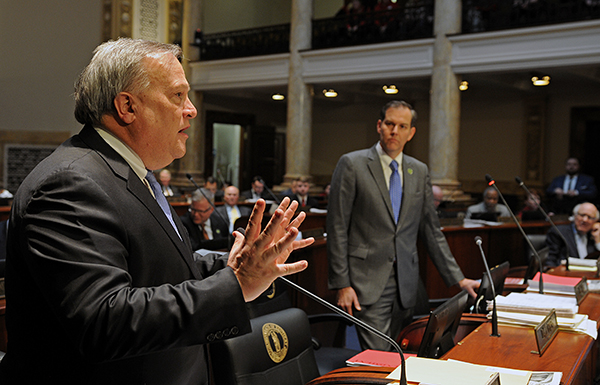 |
The photo shows Senate President Robert
Stivers II, R-Manchester, speaks in
support of Senate Bill 1, an act
relating to school safety. The bill’s
sponsor, Sen. Max Wise,
R-Campbellsville, stands in the
background.
(Click
here
here for a high-res photo.)
|
FRANKFORT – A sweeping measure to
enhance school safety across Kentucky is on its way to the
governor after receiving final passage on a 37-0 vote in the
state Senate yesterday.
“This is a good example of how we can
come together,” Senate President Robert Stivers II,
R-Manchester, said of Senate Bill 1, named the School Safety
and Resiliency Act. “Occasionally, we will have disputes and
philosophical differences ... but this is a prime example of
how people can come together on an issue.”
The House amended and passed SB 1 on a
vote of 96-3 yesterday.
Sen. Max Wise, R-Campbellsville, who
sponsored SB 1, said the amended legislation would allow a
newly created state security marshal to conduct onsite
visits to ensure schools were compliant with all provisions
of the omnibus bill. The changes would also give school
districts additional time for implementing those provisions.
Wise said SB 1 would also require
consultation and coordination with fire, police and
emergency medical services when schools formulate safety
plans. At the suggestion of Sen. Reginald Thomas,
D-Lexington, the amended bill would require schools to seek
the input of students when these plans are created.
In addition, the amended bill would
more clearly define the role of school resource officers
(SROs) with written agreements between schools and the law
enforcement agencies of which the SROs are affiliated. In
response to another concern about the original version of
the bill, those SROs would receive bias-awareness training.
Minority Caucus Chair Sen. Johnny Ray
Turner, D-Prestonsburg, spoke in support of SB 1. He was a
member of the legislative School Safety Working Group that
met throughout the state to develop a consensus on the type
of school safety legislation to advance during this session.
“I want to thank the working group for
coming to Prestonsburg in Floyd County,” Turner said. “This
allowed people in eastern Kentucky to participate and give
their views.”
Sen. C.B. Embry Jr., R-Morgantown, said
he was proud to be a cosponsor of SB 1, a No. 1 priority of
the General Assembly. Similar legislation was introduced in
the lower chamber as House Bill 1.
“This is a great example of us working
together,” Embry said. “What can be more important than the
safety of our school children, our greatest asset, and the
future of this commonwealth?”
He said everyone’s involvement in the
working group was deeply appreciated.
Sen. Danny Carroll, R-Paducah, said he
wanted to relay his constituents’ deep-felt thanks for SB 1.
His western Kentucky district includes Marshall County High
School, the site of a shooting last year that left two
students dead.
“We are very grateful,” he said.
Wise said SB 1 was “a step in the right
direction” but money would have to be appropriated for SB 1
during next year's regular session of the General Assembly.
That's when legislators are constitutionally tasked with
passing a biennium budget for the state.
Stivers said officials would spend the
upcoming interim assessing what it will cost to pay to
implement all the provisions of SB 1. He said some school
districts would need more financial help than others.
“There is a commitment, once the
analysis and assessment is done, to fund what is needed to
protect our schools, our teachers and our children,” he
said.
-- END--
Feb. 28, 2019
Early literacy and math
bill advances to Senate chamber
|
|
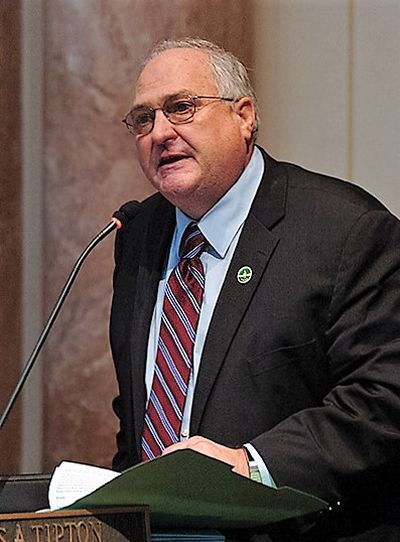 |
Rep. James
Tipton, R-Taylorsville, discusses
House Bill 272.
(Click
here
for a high-res photo.)
|
FRANKFORT— Elementary education courses
at Kentucky colleges and universities would require more
specific training in teaching early literacy and math skills
beginning next year under a bill passed today in the
Kentucky House.
“I think we all recognize that one of
the challenges that students face is, when they’re not
reading at grade level by the time they attend fourth grade,
they’re going to have more difficulties going forward,” said
House Bill 272 sponsor Rep. James Tipton, R-Taylorsville.
Tipton said he is hopeful HB 272 will
be “a first step in a much broader discussion on this
subject.”
Under HB 272, Kentucky colleges and
universities would teach their elementary education students
specific components of early reading and math instruction
beginning with the 2020-2021 school year. Reading components
would include instruction on phonics, vocabulary and other
areas. For math, instruction on concepts, procedural skills
and application would be required.
Tests used to gauge both the knowledge
and skill of math and reading teachers would be developed by
the state Education Professional Standards Board by 2021
under the bill. All new teachers seeking early childhood or
elementary education certification beginning with the
2022-2023 school year would have to pass those tests, per
the bill.
Voting against the bill was Rep. Patti
Minter, D-Bowling Green. She said the bill is on the “right
track,” but she feel the bill needs more input from
stakeholders.
“I firmly believe we have to involve
the stakeholders in the conversation – the people who will
develop the curriculum, the people who will deliver the
curriculum, and it is a troubling issue for me that so many
times we are not involving the stakeholders,” said Minter.
Tipton said Kentucky is one of only
three states in the Southeast U.S. that do not require
teacher
training on special components of early reading
and math instruction as outlined in the bill.
“We have a responsibility as
legislators to set the policy for what’s best for everybody
in the Commonwealth of Kentucky and especially our
students,” said Tipton.
HB 272 passed the House by a vote of
86-12. It now goes to the Senate for consideration.
END
Feb. 27, 2019
School safety bill moves toward final
passage
|
|
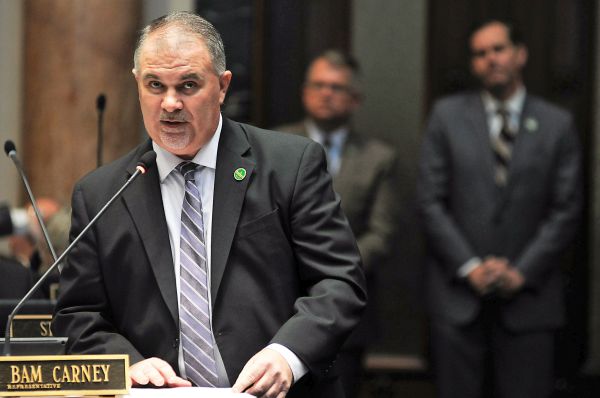 |
House Majority Floor Leader John Carney,
R-Campbellsville, explains Senate Bill 1 .
(Click
here for a
high-res photo.)
|
FRANKFORT—School safety improvements in Senate
Bill 1—the top legislative priority of 2019 Kentucky General Assembly
leaders—moved a step closer to becoming law today after being amended
and passed by the Kentucky House.
The House voted 96-3 to pass the School Safety
and Resiliency Act, or SB 1, sponsored by Sen. Max Wise,
R-Campbellsville, and approved by a 35-0 vote in the Senate on Feb. 8.
Similar legislation was introduced this session as House Bill 1, filed
by House Majority Floor Leader John “Bam” Carney, R-Campbellsville, and
Rep. Chris Freeland, R-Benton.
Carney, who presented SB 1 for a vote in the
House, said educators, law enforcement, students, parents and others had
input into the legislation.
“It’s been a very comprehensive process, and it
will be a continuing process for years to come,” said Carney. “But I
think this is a great step forward for the Commonwealth of Kentucky if
we’re able to move this piece of legislation forward.”
The legislation—the result of months of work by
a legislative School Safety Working Group formed after the 2018 shooting
deaths of two students at Marshall County High School—would boost school
safety by improving the type of personnel, systems and structures and
student culture in Kentucky’s schools. Included among the improvements
would be creation of the position of state school safety marshal, whose
role would be similar to that of a state fire marshal.
Expansion of the use of school resource
officers, or SROs, would also be part of the bill, as would enhanced
mental health services and a statewide school safety tip line, among
other provisions.
Rep. Cluster Howard, D-Jackson, voted in
support of the bill. A professor at Hazard Community and Technical
College, Howard said he was at work one day in 2013 when three people
were fatally shot outside his office window. He said better mental
health resources are needed to deal with violent school incidents.
“We must have access to mental health care if
we expect to deal with violence in schools,” said Howard.
Also speaking in support of the legislation was
House Speaker David Osborne, R-Prospect. Osborne said the working group
created last year “put together something that we can be proud of. And
they deserve the appreciation of this body, and they deserve the
appreciation of the entire Commonwealth.”
SB 1 does not include funding for its
provisions. The funding is expected to be approved during the General
Assembly’s 2020 budget session next winter, according to Wise, who told
the Senate that SB 1 is not intended to burden financially-strapped
schools.
SB 1 now returns to the Senate to see if its
members agree with the House changes to the measure.
END
Feb. 27, 2019
Regional university
retirement bill moves to Senate
FRANKFORT—Kentucky’s regional state
universities saw their employer contribution rate to the
Kentucky Employees Retirement System skyrocket in 2018.
Actuarial changes in late 2017
increased the total contribution rate for pension and
retiree health insurance for nonhazardous employees at
regional postsecondary institutions from 49.47 percent
to over 80 percent, said Rep. James Tipton,
R-Taylorsville. Knowing the cost was a hardship on the
universities, Tipton said the 2018 General Assembly
froze the contribution rate through fiscal year 2019
while recognizing more action would be needed.
“In that legislation was a charge
that we come up with some suggestions, some ideas on how
we can move forward out of this situation,” said Tipton.
“Well, our comprehensive universities took this to heart
and … I’m here today on behalf of our comprehensive
universities.”
The House responded today by voting
76-21 to pass House Bill 358. Sponsored by Tipton, the
bill would allow, not require, any of the state’s
regional postsecondary institutions—EKU, KSU, Morehead
State, Murray State, NKU, WKU and KCTCS—as well as the
Kentucky Higher Education Student Loan Corporation to
stop participating in KERS by June 30, 2020.
Institutions that choose to
leave KERS under HB 358 would have to pay the full
actuarial cost of their liability to KERS in a lump sum
or over 25 years, per the bill.
They would also be required to provide other
retirement options for their employees including a
defined contribution plan, such as a 401(k).
New hires of an institution that
has left KERS would not be allowed to participate in
that system.
Tipton said the estimated fiscal
impact of freezing the KERS employer contribution rates
for the institutions last year was around $132 million.
HB 358 would freeze those rates for one more fiscal
year, at an estimated fiscal impact of $121 million, he
said.
That does not mean, however, that
KERS would lose money under HB 358, he said.
“Our universities have shared with
me (that) they understand that they have an obligation
to pay the liability to their system on behalf of their
employees,” Tipton told the House. “Going forward they
want to have certainty on what that obligation will be,
and they feel like this legislation … will provide them
the opportunity to do that.”
House Minority Caucus Chair Derrick
Graham, R-Frankfort, said he feels more actuarial
information is needed before the legislation is passed.
He voted against the bill.
“HB 358 is a major piece of
legislation,” said Graham. “And at this time, there are
no definitive facts or figures that help us make an
informed decision on passage of this bill.
“We are rushing to pass legislation
without important facts and figures on the cost of this
transition.”
Rep. Jerry T. Miller, R-Louisville,
asked the House to pass the bill, telling his colleagues
that any necessary tweaks to HB 358 could be made in
agreement with the Senate in coming days. He said HB 358
will improve the affordability of a college education in
Kentucky.
“This bill is progress. I urge you
to vote yes,” he said.
HB 358 now
goes to the Senate for its consideration.
END
Feb. 27, 2019
Expungement bill clears Senate, heads to
House
|
|
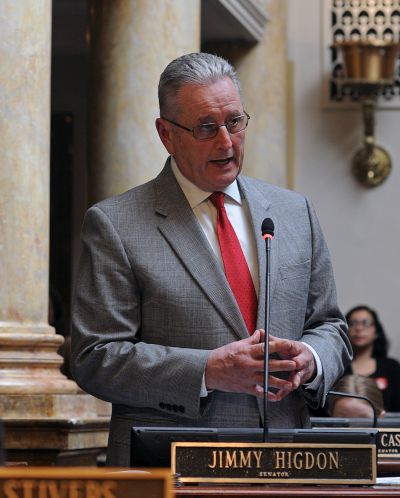 |
Sen. Jimmy Higdon,
R-Lebanon, presents Senate Bill 57, a
measure he sponsored relating to
expungements. (Click
here
for a high-res photo.)
|
FRANKFORT — Legislation to expand the
number of Kentuckians eligible to have low-level felonies
expunged from their criminal records passed the Senate today by
a 35-2 vote
The measure, known as Senate Bill 57,
would expand discretionary expungement to all Class D felonies,
except those that involve a breach of public trust, sex
offenses, crimes against children and violent crimes that may
cause serious bodily injury or even death. Another provision of
SB 57 outlines how the state would handle expungement requests
for crimes committed before 1975 when Kentucky changed its penal
code.
“This is not a soft on crime bill,”
said Sen. Jimmy Higdon, R-Lebanon, who sponsored the measure.
“This is a jobs bill.”
He said 35,000 people in Kentucky have
pleaded guilty to a Class D felony in exchange for not going to
trial and being sentenced to up to five years in prison in just
the last few years.
“It seemed like a pretty good deal (for
these people) until you discover a Class D felony is a life
sentence,” Higdon said. “It is a little cloud that follows you
around for the rest of your life.”
Higdon explained that SB 57 would build
on 2016’s House Bill 40. That measure made people convicted of
about 60 low-level, Class D felonies eligible for expungement.
Since the passage of HB 40, 3,000 expungements have been granted
and 300 denied.
Higdon said one of the biggest
complaints about HB 40 was it required a $500 application fee
for people seeking expungements. He said SB 57 would keep a fee
in place but establish a payment program to make it more
affordable to low-income citizens.
Minority Floor Leader Sen. Morgan
McGarvey, D-Louisville, stood in support of SB 57 but said he
would like future legislation granting judges the authority to
set the application fee.
“I would like the judges to have that
just to make sure there are no economic hurdles to one getting
justice,” he said.
Sen. Danny Carroll, R-Paducah,
explained his “yes” vote despite his skepticism of prior
expungement legislation. He thanked Higdon for compromising by
adding language to SB 57 that would require people to wait 10
years after their conviction before they are eligible for the
expungement program. Carroll also praised a provision that would
allow prosecutors to object to specific expungement requests.
SB 57 now goes to the House of
Representatives for its consideration.
-- END
--
Feb. 27, 2019
Bill to curb youth e-cigarette use
advances
|
|
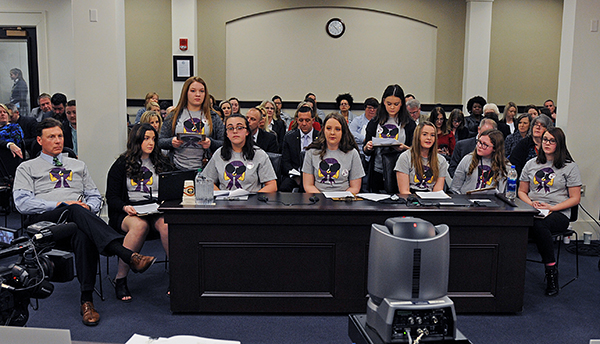 |
Sen. Brandon
Smith, R-Hazard, (at left) sits with eight
Johnson County Middle School students testifying
on Senate Bill 218, an act relating to the
prevention of smoking and vaping by students.
(Click
here for a
high-res photo.)
|
FRANKFORT — One middle schooler described a new
and growing locker room ritual before games. Another told of classmates
who went to the restroom every two hours just to get their “fix.” And a
third said she had already been bullied for speaking out against it.
What the eight Johnson County Middle School
students were talking about was the popularity of e-cigarette use, or "vaping,"
among teens and adolescents. The students testified alongside Sen.
Brandon Smith, R-Hazard, before today’s meeting of the Senate Health and
Welfare Committee in support of legislation designed to curb youth
vaping.
The measure, known as Senate Bill 218, would
establish an anonymous hotline for students to report vaping, require
that parents be notified if their child was caught vaping and encourage
youth vapors to enroll in local health department smoking and vaping
cessation programs. It would also encourage school districts to
establish awareness campaigns about health concerns surrounding vaping.
Student Emily Farler testified that her 13- and
14-year-old friends have an unhealthy addiction that makes them “edgy
and cool” among their peers.
“Look at me,” she said. “Imagine a whole
generation of us, but addicted to nicotine. That is what is happening
all across Kentucky right now.”
The students cited a Surgeon General’s report
from December that found youth use of e-cigarettes has risen
dramatically since the product first appeared on the market around 2007.
Last year, more than 3.6 million children were using e-cigarettes.
Though e-cigarettes often are viewed as safer than cigarettes, the
Surgeon General warned that nicotine exposure during adolescence could
harm brain development and affect learning, memory and attention.
Smith testified that SB 218 was a collaborative
effort between him and the students. Smith said while e-cigarettes come
in a variety of devices, a particularly popular one marketed by Juul is
designed to look like a USB flash drive. He said it even charges when
plugged into a laptop.
One student said their peers who sell the
devices are called “plugs,” in reference to how many plug into USB
ports. Another student said the devices are concealed in hidden,
watertight compartments inside water bottles.
“The problem with Juuls is one that needs
immediate attention,” Farler said. “We must change the culture in
schools to show that vaping ... isn’t acceptable. You cannot ignore the
fact that 25 to 30 percent of our student body is using electronic
cigarettes, and it now goes down all the way to grade five.
“Today’s kid who Juuls isn’t the same kid who
smoked cigarettes 30 years ago. It is the straight-A student and the
school athlete.”
When one student said SB 218 was just a start
in addressing the issue, Sen. Stephen Meredith, R-Leitchfield, said he
agreed. He suggested that SB 218 be amended on the Senate floor to raise
the age someone can buy vaping products to 21. It is currently 18 in
Kentucky.
Meredith had introduced another bill that would
have done that, but the Senate Agriculture Committee voted earlier this
week against advancing the measure. Smith said he was amenable to a
floor amendment to do just that.
Former schoolteacher Sen. Alice Forgy Kerr,
R-Lexington, said vaping was “the most horrific thing” she had ever
witnessed happening to Kentucky’s youth.
“I appreciate your courage for coming because
this is not an easy thing for you to do,” she said. “You are providing a
great service to your communities and to the commonwealth. What you are
doing here is one of the most important issues that we will take up this
session.”
Meredith said the students provided compelling
testimony that would make a difference.
“You have done something very special today,”
he said. “It is not often you ... you get to change the world for the
better so feel good about what you have done. Congratulations.”
-- END
--
Feb. 26, 2019
Kinship care bill moves to Senate
FRANKFORT—Kentucky would be required to beef up assistance
for relatives or family friends of children placed in their care
by the state under a bill that has cleared the Kentucky House.
House Bill 2, sponsored by Rep. Chris Fugate, R-Chavies,
and House Speaker Pro Tempore David Meade, R-Stanford, would
create a caregiver assistance program for relatives and “fictive
kin”—usually close family friends—of abused, neglected, or
dependent children. The program would offer different options to
the caregivers based on the level of care they provide.
Different kinds of support, including financial support,
could be made available to caregivers based on that level of
care, according the bill.
Fugate said HB 2 addresses a growth in
out-of-home placement of Kentucky children amid the state’s
current opioid crisis and other circumstances. Grandparents and
others, he said, often take the responsibility of raising these
children.
“(The bill) would allow the fictive kin or relative
caregivers to select the best option for the services that the
kids would need,” he told the House.
HB 2 was amended by the House to require better state
tracking of the number of relative and fictive kin caregivers in
Kentucky and the number of children in their care. Meade said
current data does not fully reflect the number of caregivers or
children now served.
He said the amendment will help lawmakers and other state
officials “make the absolute best decisions as we continue to
develop a kinship care program going forward.”
House Minority Whip Joni L. Jenkins, D-Shively, said HB 2
would do more to help relatives and friends “who want to help us
with the over 10,000 children in state custody.”
HB 2 passed the House on a vote of 97-0. It now
goes to the Senate for consideration
--END--
Feb. 26, 2019
Right of unborn legislation
advances to Senate
|
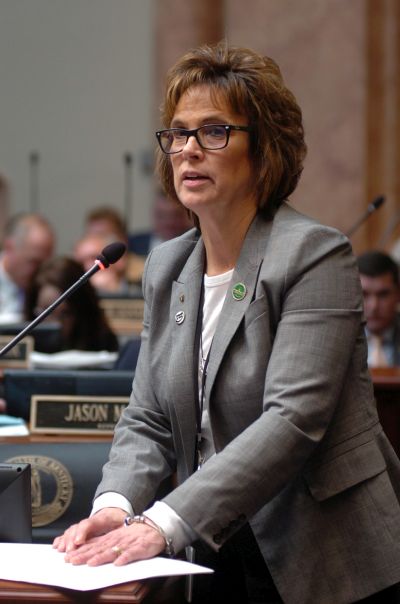 |
Rep.
Melinda Gibbons Prunty, R-Belton,
presents House
Bill 5 relating to the human rights of unborn
children.
(Click
here
for a high-res photo.)
|
FRANKFORT—Performing an abortion based on the unborn child’s
gender, race, color, national origin or disability would be a felony
offense under a bill that has passed the Kentucky House.
House Bill 5 sponsor Rep.
Melinda Gibbons Prunty, R-Belton, said the legislation would prohibit
the abortion of an unborn child based on characteristics that are
protected by law after a child is born.
“HB 5 would extend those
exact same rights to the unborn from the moment of conception,” said
Prunty, who is sponsoring the bill with Rep. Nancy Tate, R-Brandenburg.
Prunty said anyone who
performs or induces an abortion knowing that the mother wants the
abortion based, at least in part, on the sex, race, color, national
origin or disability of her unborn child would face a felony charge
carrying up to five years in prison and revocation of their license to
practice in Kentucky. Exceptions would only be made in a medical
emergency involving the mother.
“Personally I wouldn’t have the (emergency) clause, but I feel
like it’s necessary in case (the pregnant woman’s) life is in danger,”
Prunty said when asked by Rep. Kelly Flood, D-Lexington – who voted
against the bill—about the exception for a medical emergency.
“I know women who have
sacrificed their own life for the life of their baby,” said Prunty, “but
that’s in there for that purpose.”
Rep. Attica Scott,
D-Louisville, also voted against HB 5.
“This is wildly amazing to
think that we could actually know the color, or race, or national origin
of the unborn child when a woman could be pregnant by someone who is not
of the same national origin, or race, or color,” said Scott.
When asked by Scott how an
abortion provider would know if a mother wants to abort her baby based,
all or part, on the traits mentioned in the bill, Prunty said the mother
would share that information.
Ending the life of an
unborn child based on gender, race, color, national origin or a known or
potential disability is “reminiscent of the evil social philosophy
(called) eugenics,” said Prunty.
Eugenics is sometimes called “selective breeding.”
“HB 5 recognizes and affirms that all human
life has intrinsic value,” she said.
HB 5 contains an emergency
clause which would require the legislation to be enforced immediately
should it become law.
HB 5 passed the House on a
vote of 67-25. It now goes to the Senate for consideration.
--END--
Feb.
26, 2019
School resource officer
bill moves to House
|
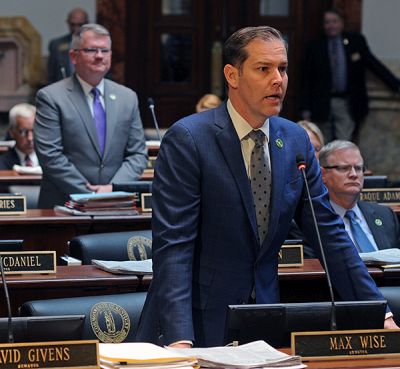 |
Sen.
Max Wise, R-Campbellsville, speaks
in support of Senate Bill 162, an
act relating to school safety. The
bill’s sponsor, Sen. Danny Carroll,
R-Paducah, stands in the background.
(Click
here
for a high-res photo.)
|
FRANKFORT – Legislation designed to increase the
pool of qualified applicants to be school resource officers passed the
state Senate today with no dissent.
The measure, known as Senate Bill 162, would
create the Kentucky State Police school resource officer designation
(SRO). It would do this, in part, by specifying the requirements of
employment of a state police SRO. Sponsor Sen. Danny Carroll, R-Paducah,
said another provision of SB 162 would exempt a school district from
paying retirement fund contributions on a retired state police SRO
employed as a school security officer.
“I think it is imperative as we move forward
with school safety that we make sure that we have enough officers to
fill the positions of school resource officers in our various school
districts across the state,” said Carroll in reference to another school
safety measure advancing this session. “This will simply create a larger
pool of officers ... that school districts can hire from to work in
their schools.”
The other school safety measure is Senate Bill
1, which passed the Senate earlier this month by a 35-0 vote and is now
under consideration in the House. Known as the School Safety and
Resiliency Act, SB 1 would create a state school safety marshal, similar
to the state fire marshal. SB 1 would also establish a framework for
schools to expand the use of school resource officers.
SB 1 was the product of testimony, research and
study over eight months by the nonpartisan School Safety Working Group.
Legislators formed the group in response to the western Kentucky
shooting at Marshall County High School last winter in Benton. The
community is located in Carroll’s district.
SB 1’s sponsor, Sen. Max Wise, R-Campbellsville,
praised Carroll’s SB 162.
“This is a complement to Senate Bill 1,” said
Wise, who is also chairman of the Senate Education Committee. “This will
... help our school resource officers and school districts across the
commonwealth.”
He added that there would be a third school
safety measure to include funding for some of SB 1’s provisions during
next year’s regular session. That’s when the General Assembly is tasked
with passing the state’s next biennium budget.
SB 162 passed the Senate by a 36-0 vote. The
measure now goes to the House of Representatives for its consideration.
-- END --
Feb.
26, 2019
Working student loan debtors bill
advances
|
|
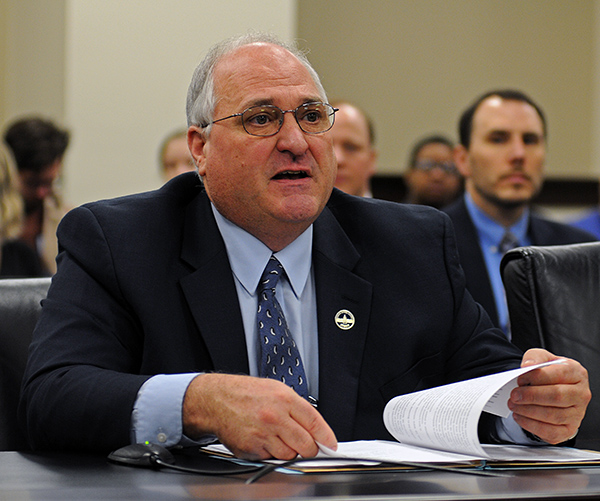 |
Rep. James Tipton, R-Taylorsville, explains
House Bill 118 .
(Click
here
for a high-res photo.) |
FRANKFORT – The Keep Americans Working Act of 2019 advanced out
of a Senate committee today.
The act, known as House Bill 118, would prohibit someone
from having their occupational license suspended or revoked because
they are delinquent on a student loan or work-conditional
scholarship. It would also encourage a person who is in default or
delinquent in the payment of a student loan to contact the
appropriate student loan servicer to establish a voluntary pay
agreement.
Sponsor Rep. James Tipton, R-Taylorsville,
told the Senate Licensing, Occupations and Administrative
Regulations Committee the Kentucky Higher Education Assistance
Authority (KHEAA) is actually required to report if the student is
in default to the licensing authority under existing statute. He
said that could result in the licensing authority revoking that
individuals’ license.
He cited some recent reports on student loan
debt. The latest student loan debt statistics for 2019 state there
are more than 44 million borrowers who collectively owe $1.5
trillion in student loan debt across the nation. Borrowers in the
Class of 2017, on average, owe $28,650, according to the Institute
for College Access and Success.
Majority Floor Leader Damon Thayer,
R-Georgetown, asked whether HB 118 would allow someone to get out of
their student loan obligation.
Erin Klarer of KHEAA testified that would
not be the case. She explained that KHEAA would retain other means
to collect on delinquent loans including seizing tax returns and
lottery winnings as well as garnishing wages. She added that there
are a number of different repayment plans for borrows so they never
reach default.
Thayer said he supported HB 118 before
reading this sentence taken from the bill language:
“The purpose of ... this act is to ensure
that hard-working Americans keep their occupational licenses while
struggling to pay off student loan debt, keeping them out of
welfare, out of poverty, and in the workforce.”
HB 118 was placed on the Senate consent
calendar, a list of bills having had one or two readings, and on
which members in attendance are presumed to vote yes unless they
indicate a negative vote prior to the call of the roll.
-- END --
Feb. 26, 2019
Teacher liability insurance funding bill advances
|
|
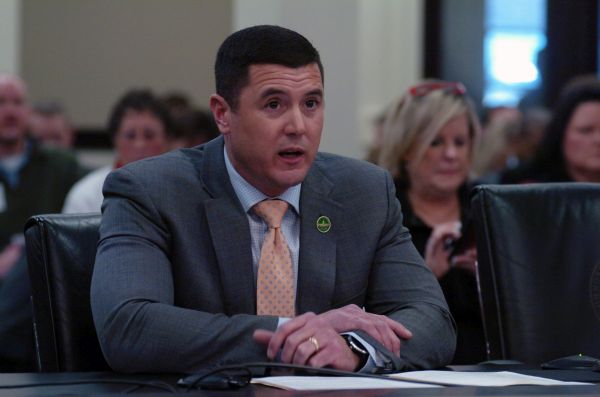 |
House Speaker Pro Tempore David Meade,
R-Stanford, presents House Bill 508.
(Click
here for a high-res photo.)
|
FRANKFORT—Kentucky public school teachers would
have employment liability coverage offered by the state under a bill
that passed the House budget committee today.
The Educators Employment Liability Insurance
Program that would be created by House Bill 508 would provide up to
$2 million in liability coverage for each certified public school
employee in the state as of this July, House Speaker Pro Tempore
David Meade told the House Appropriations and Revenue Committee.
Meade, R-Stanford, is jointly sponsoring the bill with House Speaker
David Osborne, R-Prospect.
“We have traveled the state the past year speaking
to various groups. As we spoke to educators across the state, the
two things that kept coming up the most were out-of-pocket expenses
for classroom materials and out-of-pocket expenses for liability
insurance,” Meade told the committee. “The one that came out (to be)
the easiest to do this session was the liability insurance part.”
HB 508 would appropriate $7 million in funding
from the state Budget Reserve Trust Fund for the program over the
next fiscal year, per the bill. Future funding could come from the
state General Fund, gifts and grants from public and private
sources, and federal funds.
“That is simply what it does – it provides
liability insurance for all educators across the state,” said Meade.
Rep. Kelly Flood, D-Lexington, asked why the
legislation is being introduced this session instead of during the
2020 Regular Session when the General Assembly will consider the
next two-year state budget.
The answer, according to Meade, is to “give those
teachers some peace of mind.”
While there are other sources of liability
insurance for teachers—including the Kentucky Education Association,
homeowner insurance policies, among other sources, said Meade— the
state fund will, he said, fix a gap in coverage.
“It’s kind of like anything else,” the Speaker Pro
Tem said. “None of us likes to pay for insurance, but we’re glad we
have it. It’s just to give (teachers) peace of mind.”
HB 508 now goes to the full House for its
consideration.
END
Feb. 25, 2019
Senate finance reporting measure going to governor
|
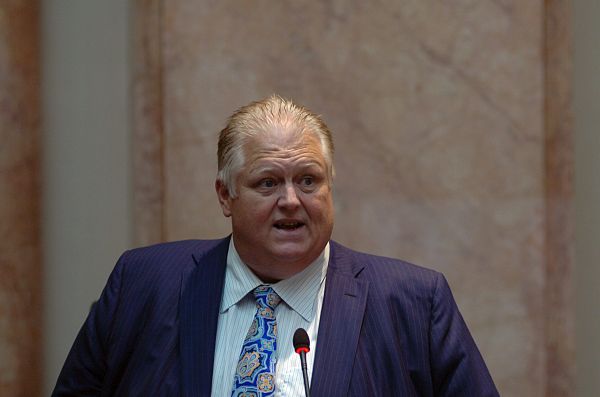 |
Rep. Kevin Bratcher,
R-Louisville, presents Senate Bill 4, a
bill relating to campaign finance
reports, on the floor of the
Kentucky House.
(Click
here
for a high-res photo.)
|
FRANKFORT— Legislation that would require all
candidates for public office in Kentucky to electronically file
their campaign finance reports starting in 2020 has passed the
Kentucky General Assembly.
Senate Bill 4, sponsored by Senate Majority Floor
Leader Damon Thayer, R-Georgetown, received final passage in the
House today by a vote of 68-26. The bill passed the Senate earlier
this session on a 34-2 vote.
Current law only requires that candidates for
statewide office electronically file – or e-file—their campaign
finance reports, according to Senate testimony last month. Those
include candidates for governor, lieutenant governor, treasurer,
state auditor, attorney general, secretary of state and agriculture
commissioner.
Candidates whose campaigns raise less than $3,000
during a reporting period would be exempt from the new e-filing
requirement under SB 4.
Rep. Mary Lou Marzian, D-Louisville, voted against
the measure. Marzian said SB 4 would remove language in current law
that gives candidates up to five days to file reports with the
Registry of Election Finance after the filing deadline.
“I think that is a concern,” said Marzian. “A lot
of us use that five-day grace period to make sure that we get our
financial statements in, especially if it’s 15-day, 30-day, 60-day
(reporting),”
Rep. Kevin Bratcher, R-Louisville, who presented
the bill to the House for a vote, said the change is intended “to
give a more accurate reading of the disclosures of the financial
reports.”
SB 4 will soon go to the governor for his
signature or to otherwise become law.
END
Feb. 25, 2019
Executive branch ethics bill moves to Senate
|
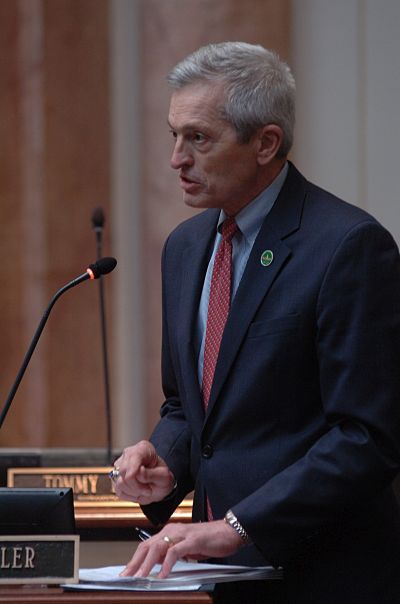 |
Rep. Jerry T. Miller, R-Louisville,
presents House Bill 81 relating to the
Executive Branch ethics code on the
House floor.
(Click
here
for a high-res photo.)
|
FRANKFORT— A bill that would put the Kentucky
Board of Elections and certain Executive Branch contract employees
under the governance of the state Executive Branch ethics code has
received House approval.
House Bill 81 sponsor Rep. Jerry T. Miller,
R-Louisville, said the Board of Elections is the only full-time,
salaried Executive Branch board or commission in Kentucky that does
not fall under the Executive Branch ethics code statute. The
remaining four full-time salaried state boards or commissions— the
state Parole Board, Occupational Safety and Health Review
Commission, Worker’s Compensation Board, and the Kentucky Claims
Commission—are covered, he said.
“It is apparently a relic of past times that the
state Board of Elections, perhaps the most important board on this
list that has full-time employees, is not covered,” Miller told his
colleagues on the House floor. “This bill rectifies that.”
HB 81 would also put full-time, non-seasonal
Executive Branch contract employees and management under the code,
said Miller.
“Of all the good government bills we have a chance
to pass today, I think –in terms of the integrity of our
elections—this is one of the most important,” he added.
Similar legislation was sponsored by Miller and
passed by the House as HB 300 last year.
HB 81 passed the House by a vote of 89-5. The bill
now goes to the Senate for its consideration.
END
Feb. 25, 2019
House receives bill that would expand use of KEES money
FRANKFORT—Kentucky students could use their KEES
merit scholarships for qualified workforce training programs under a
bill that today cleared the House Education Committee.
House Bill 61, sponsored by Rep. Kimberly Poore
Moser, R-Taylor Mill, would add these training programs—which the
bill states would have to be “in one of Kentucky’s top five
high-demand work sectors—to the list of eligible uses for KEES, or
Kentucky Educational Excellence Scholarship, awards earned by
Kentucky high school graduates.
Students enrolled in a qualified workforce
training program that allows them to earn postsecondary credit hours
at a participating schools would be eligible for reimbursement of
training costs based on their KEES award beginning with the 2019
school year, per the bill.
“We just want to allow this for any student
regardless of whether they feel ready for a four-year degree or if
they simply would prefer to go into a trade program,” said Moser.
Similar legislation was considered by the 2018
Kentucky General Assembly in both the House and the Senate.
KEES money is now awarded to recent Kentucky high
school graduates and other eligible students enrolled in college or
university or a registered apprenticeship program, according to
Kentucky law.
Students earn KEES money for each year of high
school in which they maintain a GPA of at least 2.5, per state law.
Additional KEES awards are earned based on ACT/SAT and other test
scores.
HB 61 now moves to the full House for its
consideration.
--END-
Feb.
22, 2019
This Week at the State Capitol
FRANKFORT – Peek into one of the journals that
have rested for more than a century on the shelves of the State
Capitol’s law library and you’ll see the issues that captured lawmakers’
attention on March 15, 1908 -- the day the Kentucky General Assembly
completed its last legislative session in the Old State Capitol.
Matters under discussion included improving coal
mine safety, allowing vacation time for prison guards, keeping kids in
school, and restoring a Henry Clay monument.
Some of those issues were still around when
lawmakers next convened two years later. But their meeting location was
brand new. The Old Capitol was left behind as lawmakers began the 1910
session in a magnificent new Capitol building that remains the center of
state government to this day.
Still, the Old Capitol has its historic charm.
That’s why every decade or so, state lawmakers decide to return to the
Old Capitol for a day to celebrate Kentucky history in an architectural
treasure that still looks much like it did during the 1800s. That
happened again this month as the General Assembly held Feb. 21
proceedings in the Old Capitol’s storied Senate and House chambers.
Coming one day after Presidents Day, the Old
Capitol activities gave lawmakers a chance to be addressed by an Abe
Lincoln impersonator who joked that he was surprised to be invited to
the proceedings since Kentucky heavily voted against him in the 1860
presidential race. “Well, ladies and gentleman, all is forgiven,” he
said, “We come together now as one nation, united, indivisible, with
liberty and justice for all.”
While most of the Old Capitol activities
were ceremonial in nature, lawmakers moved a number of possible new
laws further along in the legislative process during the rest of the
week. Bills that advanced between Feb. 19 and Feb.
22 include measures on a range of
topics:
Foster children.
Children in foster care and other out-of-home care placements
would have their own statutory “bill of rights” under a bill that
cleared the Kentucky House 99-0. The rights include adequate food,
clothing, and shelter, as well as a safe, secure and stable family.
The bill has been delivered to the Senate.
Felony expungement.
Legislation to extend Kentucky’s expungement program to
additional people convicted of low-level felonies advanced out of
the Senate Judiciary Committee. Senate Bill 57 would allow
discretionary expungement of additional Class D felonies not
involving sex abuse, breach of public office or crimes against
children. The bill now goes to the Senate chamber.
Crime victims.
Senate Bill 97, which passed the Senate 35-0, would make it
possible for sexual assault victims to go online to check the
progress of forensic testing in their cases. The bill now goes to
the House for consideration.
Sports wagering.
The House Licensing, Occupations and Administrative Regulations
Committee approved a bill that would legalize and regulate sports
wagering, fantasy sports contests and online poker. Bill 175 would
allow licensed wagering on sanctioned professional and college
sporting events at Kentucky horse tracks, Kentucky Speedway, or
through an app downloaded at one of those locations. Online poker
would be regulated by the Kentucky Lottery under the bill. Sports
wagering alone would generate an estimated $20 million in annual tax
revenue for the state. House Bill 175 now goes to the House chamber.
Golden alerts.
A House committee approved legislation to change how the state
issues Golden Alert notifications when an impaired person is
missing. It would be up to the Kentucky State Police to initiate a
Golden Alert under House Bill 150 if the agency decides an alert is
necessary for the safety of someone with a physical, mental or
cognitive impairment, such as Alzheimer’s disease. The State Police
would work with both state and local agencies to issue an alert
using existing resources such as electronic highway signs, the Amber
Alert broadcast emergency response system, and electronic media. The
bill now goes to the House for consideration.
Citizens who want to weigh in on the issues
under consideration can share their thoughts with Kentucky lawmakers by
calling the General Assembly’s toll-free message line at 1-800-372-7181.
--END--
Feb. 22, 2019
Bill addressing pregnancy discrimination
advances
|
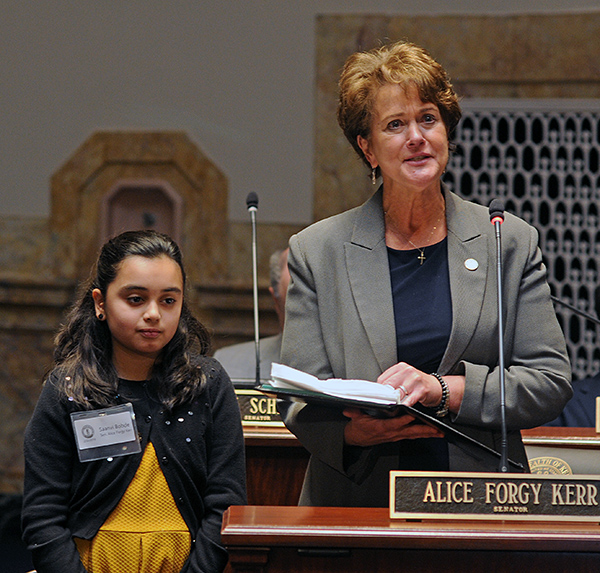 |
Sen. Alice Forgy Kerr, R-Lexington, asks
that her page, Rosa Parks Elementary
fifth-grader Saanvi Bobde, stand at her side
today on the Senate floor as she explains Senate
Bill 18, a measure addressing pregnancy-related
discrimination. Kerr says she sponsored SB 18,
in part, to help future women of Kentucky, like
Saanvi. (Click
here
for a high-res
photo.)
|
FRANKFORT – Sen. Alice Forgy Kerr made sure her page, Rosa Parks
Elementary fifth-grader Saanvi Bobde, stood at her side on the state
Senate floor today when she explained
Senate Bill 18, a
measure addressing pregnancy-related discrimination.
Kerr, R-Lexington, said she introduced SB 18 to
help future women of Kentucky – like Saanvi.
“Kentucky ranks 48th in the country for female
labor participation,” Kerr said. “To build a stronger economy, we need
to make it easier for pregnant women to hold jobs.”
The bill would clarify employers’
responsibilities when it comes to making reasonable accommodations for
pregnant employees. Another provision states SB 18 would apply only to
businesses of 15 employees or more.
Calling it a “pro-business piece of
legislation,” Kerr cited prior committee testimony by Greater
Louisville, Inc., the city’s chamber of commerce. She said the group
made SB 18 one of its top legislative priorities for the session.
“Providing clarity on this issue is badly needed
in Kentucky,” Kerr said. “As things stand right now, the employer and
employees are forced to navigate a complex web of federal law and case
law which leads to confusion and frustration. It discourages workforce
participation among our women.”
Sen. Stephen Meredith, R-Leitchfield, said he
supported the bill, in part, because of his strong belief in protecting
the unborn.
“If any woman ... is considering an abortion
because of the hardship of the workplace, we have to address that – we
truly do,” he said.
An amendment to SB 18 changed a list of
pregnancy-related accommodations to optional from prescriptive. It also
removed a 10-day notice period for employers to alert pregnant employees
of their rights.
Minority Floor Leader Sen. Morgan McGarvey,
D-Louisville, voted for SB 18 despite expressing concern the amendment
water-downed the legislation.
“However, the bill still does offer
protections,” he said of the accommodations the bill would require for
pregnant employees. “Some protection is better than what we currently
have.”
Sen. Stephen West, R-Paris, said he couldn’t
support SB 18 out of concerns the measure might have unintended
consequences. He wondered if SB 18 would discourage the hiring of women.
SB 18 had the support of Majority Floor Leader
Damon Thayer, R-Georgetown.
“I think it is important to remember there are
four members of this body who have experienced something that 33 of us
never have and never will,” Thayer said. “For those four ladies and the
lives they have given birth to I think this vote today is a testament to
them.”
SB 18 passed by a 25-7 vote. The measure now
goes to the House of Representatives for its consideration.
--END--
For Immediate Release
Feb. 22, 2019
Insurance surcharge bill advances to Senate
|
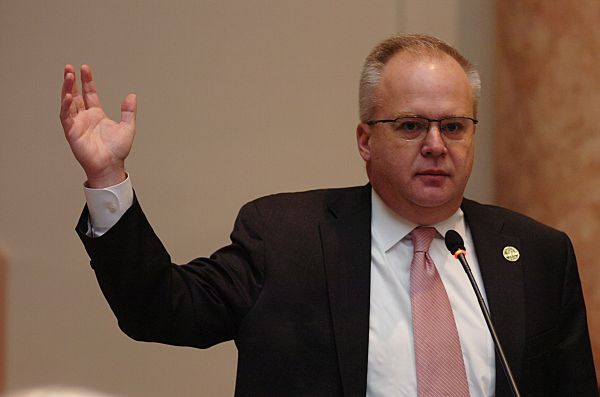 |
Rep. Adam Koenig,
R-Erlanger, presents House Bill 176 relating
to insurance premium surcharge rates. (Click
here
for a high-res photo.)
|
FRANKFORT—State lawmakers—not the head of the
Department of Revenue—would adjust insurance surcharge rates for
Kentucky’s law enforcement and firefighter training incentive funds
under a bill that today cleared the state House.
House Bill 176, sponsored by Rep. Adam Koenig,
would remove the state Commissioner of Revenue’s authority to set
premium surcharge rates for funding of training stipends offered
through the Kentucky Law Enforcement Foundation Program Fund
(KLEFPF) and the Kentucky Firefighters Foundation Program Fund
(KFFPF) and give that power to the General Assembly.
“I believe that tax rate should be set by us, the
elected representatives of Kentucky, rather than the commissioner of
revenue,” Koenig, R-Erlanger, told his colleagues in the House.
Koenig said the Commissioner of Revenue has had
statutory authority to adjust the premium surcharge rates since
1992. The current rate of 1.8 percent was set by the Commissioner of
Revenue in 2010, he said.
An amendment to HB 176 approved by the House would
keep the rate at 1.8 percent “so that the fund doesn’t lose any
money if this passes,” said Koenig.
Rep. Steven Rudy, R-Paducah, voted for the bill.
“I applaud you for bringing this legislation,” he
told Koenig. “This is truly our job to do this and not the
bureaucracy’s.”
HB 176 passed the House on a vote of 84-11. It now
goes to the Senate for its consideration.
--END--
Feb. 21,
2019
Bill to expand powers of conservation officers clears
House
FRANKFORT—Kentucky Fish and Wildlife
conservation officers would have the same statutory powers as
other law enforcement officers in the state under a bill that
has passed the state House.
Current state law prohibits
conservation officers from acting outside of the scope of the
work of the Department of Fish and Wildlife Resources unless
called upon by the Kentucky State Police, says House Bill 274
sponsor Rep. Chris Fugate, R-Chavies. Under HB 274, which is
also sponsored by Rep. David Hale, R-Wellington, conservation
officers would have the authority to enforce all state laws
whenever necessary.
Fugate, a retired Kentucky state trooper,
said conservation officers helped him in one of the biggest drug and
gun cases of his career.
“Their canine units came to a scene where we
had looked for guns for a week and, in 30 minutes, their canine unit
found 15 or 20 illegal guns that had been stolen. So this just gives
them the authority in law to do what they’ve been doing instead of
acting upon a letter from the State Police,” said Fugate.
Additionally, the bill would allow
conservation officers to be compensated if they are required to pay
damages or other costs as a result of a job-related lawsuit.
Rep. Wilson Stone, D-Scottsville, asked Fugate if the
liability of conservation officers would change under HB 274. Fugate
said it would.
“(It) would be just like a Kentucky State
Police trooper who is sued in the line of duty. It would be the
same,” said Fugate.
HB 274 passed the House by a vote of 97-1. It now goes to
the Senate for consideration.
--END--
Feb. 21, 2019
House approves proposed tax changes and parks funding
| |
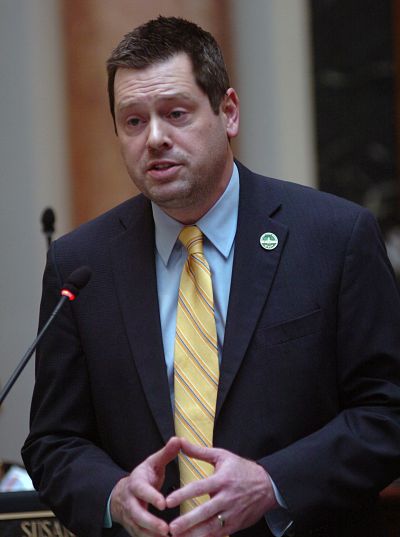 |
Rep.
Steven Rudy, R-Paducah, speaks on
appropriations proposed in HB 268. (Click
here
for a high-res photo.)
|
FRANKFORT—
Admission fees charged by nonprofit civic, governmental and
all other nonprofit organizations would be exempt from state sales
tax under legislation that today cleared the Kentucky House.
House Bill 354, sponsored by House Appropriations and
Revenue Committee Chair Rep. Steven Rudy, R-Paducah, passed the
House 96-4. It now goes to the Senate for consideration.
Besides the exemption on admissions sales, Rudy said his
bill would raise the threshold for collection of tax on most
types of sales by nonprofit civic, governmental and other
nonprofits to $10,000. “So that first $10,000 they will not have
to collect sales tax on,” he specified.
HB 354 would also create a resale certificate for certain
services – such as landscaping, industrial laundry service and
pet care—that were added to the state’s sales and use tax rolls
last year. Additionally, the bill would change how certain heavy
equipment rental property is taxed, and amend tax law impacting
Kentucky’s small farm wineries plus make some corporate tax
changes.
The House also voted 93-6 in favor of HB 268, also sponsored
by Rudy, which would authorize $50 million in bond funds for
improvements at Kentucky’s state parks while stating the General
Assembly’s “intent” to an additional $50 million for state park
improvements in future years.
Funding provided by HB 268—which also would fund several
higher education needs in the state—would come from General Fund
surplus funds or the state’s “rainy day” fund, officially known
as the Budget Reserve Trust Fund, said Rudy.
He added that the bill clearly specifies how the funds it
would appropriate can be spent.
“We thought that it would be very, very important to specify
where this money would be spent and not give a true blank
check,” said Rudy.
HB 268 includes an emergency clause,
which would allow it to take effect immediately upon becoming
law.
It
also now goes to the Senate for consideration.
--END--
Feb. 21, 2019
Senate advances midwifery
regulatory bill
| |
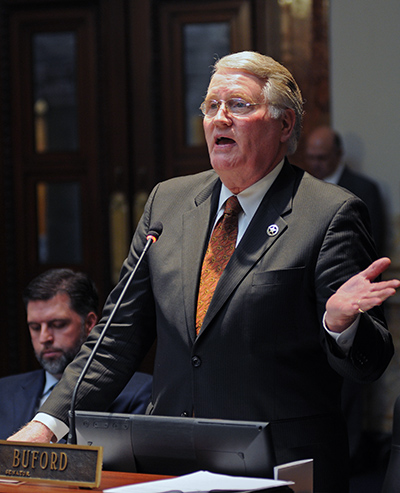 |
A photo from today’s
Senate proceedings is available
here. The photo
shows Sen. Tom Buford, R-Nicholasville,
explaining Senate Bill 84 in the Senate.
|
FRANKFORT –
Legislation that would recognize, certify and regulate home-birth
midwives in Kentucky passed the state Senate today by a 32-4 vote.
The measure, known as
Senate Bill 84,
would create a council to advise the state Board of Nursing on the
creation of regulations regarding qualifications, standards for
training, competency, any necessary statutory changes and all other
matters relating to certified professional midwives.
Sen. Tom Buford, R-Nicholasville, a primary
sponsor of SB 84, said birth certificates show that about 700 babies
are born at home in Kentucky every year. That's despite the fact the
state stopped issuing permits to home-birth midwives in 1975. He
said SB 84 wasn’t whether to allow home-birth midwives but whether
to regulate a practice and discourage charlatans from preying on
expecting mothers.
“This is a personal choice made by these
families for various reasons,” Buford said. “We must ensure the
families who choose this option have access to quality care through
... the licensing of midwives.”
He said home-birth midwives were also eager
to legitimize their already robust industry.
Sen. Ralph Alvarado, R-Winchester, spoke
against SB 84. The pediatrician by training expressed concern that
women seeking to give birth at home during high-risk pregnancies
would endanger the baby’s life.
“Therefore, in that theme, I cannot support
a measure that does not protect these children in that setting,” he
said, adding that he would have liked the bill to prohibit home
births in a high-risk situation. Alvarado cited midwifery
legislation from Georgia that does just that.
Buford said the advisory council to the
nursing board would consider high-risk births when establishing the
licensure process. He added that the council would include
obstetricians.
SB 84 now goes to the House of
Representatives for its consideration.
-- END --
Feb. 21, 2019
Expungement bill advances in Senate
| |
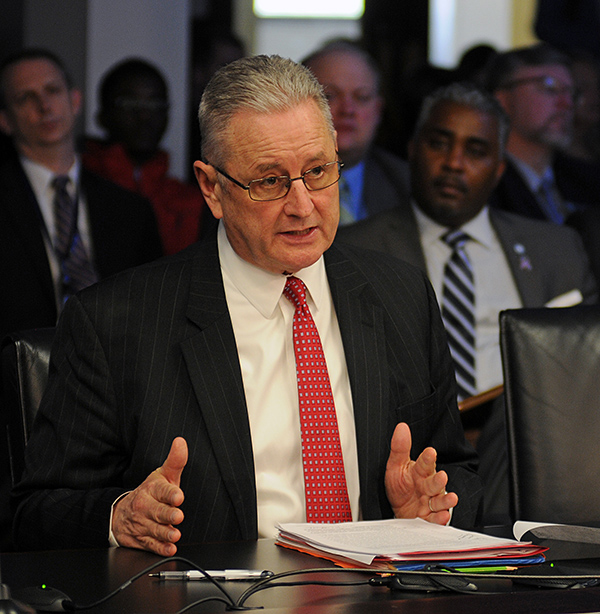 |
Sen. Jimmy
Higdon, R-Lebanon, explains Senate Bill
57 during a Senate Judiciary Committee
hearing today in Frankfort. (Click
here for a
high-res photo.)
|
FRANKFORT –
Legislation to extend Kentucky’s expungement program to additional
people convicted of low-level felonies advanced out of a state
Senate committee today.
“This is not a soft on crime issue,” said Sen.
Jimmy Higdon, R-Lebanon, while testifying before the Senate Judiciary
Committee. “This is a jobs issue. That’s what brought me to work on
expungements.”
The measure, known as
Senate Bill 57, would
allow discretionary expungement of additional Class D felonies not
involving sex abuse, breach of public office or crimes against children.
Higdon, who sponsored SB 57, said it would also include a 10-year
waiting period. Another provision of SB 57 outlines how the state would
handle expungement requests for crimes committed before 1975 when
Kentucky changed it penal code.
“A lot of times when you plead guilty to a
felony you don’t realize it is a little cloud that follows you around
for life,” Higdon said, adding that many people were once “young and
dumb.”
Higdon said one of the biggest complaints about
the current expungement program is the $500 fee to apply for the
program. SB 57 would keep the fee but establish a payment program to
make it more affordable to low-income citizens.
Senate President Robert Stivers II,
R-Manchester, explained that SB 57 would expand who would be eligible
for expungements under House Bill 40, passed during the 2016 Regular
Session. He said HB 40 already allows for the restoration of voting
rights and gun rights to people who have successfully had their records
expunged.
Higdon said there have been about 2,000
expungements granted and 300 denied since the enactment of HB 40.
SB 57 now goes to the full Senate for further
consideration.
-- END --
Feb. 21,
2019
Bill seeks online tracking of
rape testing kit
FRANKFORT -- Sexual assault victims would
be able to go online and check the progress of forensic testing in
their cases under legislation passed by the state Senate passed
yesterday.
“Kentucky has made great strides in the last
few years regarding sexual assault forensic evidence,” Sen. Denise
Harper Angel, D-Louisville, said in reference to the SAFE Act of
2016. “We found over 4,000 untested kits that have been tested. We
passed comprehensive legislation that established policies,
procedures, timelines and trainings.”
Harper said it is now time to communicate with the victims.
She said the measure, known as
Senate Bill 97,
would create an online tracking process for victims of sexual
assault.
“We live in a time with the capabilities to
track online purchases; certainly we can do the same for the victims
of these crimes,” said Harper, who sponsored the measure with Sen.
Whitney Westerfield, R-Crofton.
“The SAFE Act has done a tremendous amount
of good,” said Westerfield, a former prosecutor. “This is a simple
addition to that bill that is going to help victims, survivors,
their family, law enforcement and every other interested party in
these cases.”
The SAFE Act was introduced after a 2015
report by the state auditor found more than 3,000 untested sexual
assault kits in Kentucky. An acronym for “sexual assaults forensic
evidence,” the 2016 legislation sought to prevent a backlog of
untested kits from ever happening again.
After SB 97 passed by a 35-0 vote, Majority
Floor Leader Sen. Damon Thayer, R-Georgetown, said Harper should be
thanked. He said SB 97 was one of several bills she had carried in
recent years concerning sexual assault forensic evidence.
“I think it is a tribute to her tenacity and
the righteousness of this cause that this bill and others like it …
passed with such a bipartisan overwhelming majority,” Thayer said.
“I think we should congratulate her.”
SB 97 now goes to the House of
Representatives for its consideration.
-- END --
Feb. 20, 2019
Foster child ‘bill of rights’ moves to Senate
FRANKFORT—Kentucky children in foster care and other
out-of-home care placements would have their own statutory “bill
of rights” under a bill that today cleared the Kentucky House.
House Bill 158 sponsor and House Speaker Pro Tempore David
Meade, R-Stanford, told the House that the foster child “bill of
rights”—a list of 16 rights including the right to “adequate
food, clothing, and shelter” and “a safe, secure and stable
family”— found in HB 158 matches a foster parent “bill of
rights” already in statute.
Meade said the bill would “give (foster children) the rights
they deserve, to feel loved, protected and safe in their foster
homes and adoptive homes and to help them with their transitions
as they move forward.”
HB 158 would also require national and state background checks
on child residential home and placement agency staff as required
under a 2018 federal law, said Meade. The cost of the background
checks would be covered by the home or agency, not the employee,
he said.
Meade and Rep. Joni Jenkins, D-Shively, were the primary
sponsors of HB 1 that became law last year. That legislation
includes broad adoption and foster care reforms intended to
reduce the waiting time for children needing permanent homes and
improve the overall foster care and adoption process in
Kentucky.
Rep. Wilson Stone, D-Scottsville, spoke in support of HB 158
before the House passed the measure on a vote of 99-0.
“We have such an increasing problem,” said Stone. “Hopefully
this is the place—right here—to make that better over time.”
Other provisions in HB 158 address timeframes for searches of
Kentucky’s “putative father” registry—a state registry created
under HB 1 for men who want parental rights to a child they
claim to have fathered—as well as clarify some legal definitions
involving abuse and neglect of a child. The bill would also
update the definition of “voluntary and informed consent”
regarding adoption.
HB 158 now goes to the Senate for its consideration.
--END--
Feb. 20, 2019
KY House passes “A Day of
Prayer” measure
FRANKFORT—The Kentucky House voted 79-18
today to set aside one day each year for Kentuckians to pray
or reflect on the state’s public schools and their students.
House Bill 166 would designate “A Day
of Prayer for Kentucky’s Students” on the last Wednesday of each
September to coincide with the global See You at the Pole™
student-led school prayer event held on that day for nearly
30 years. HB 166 sponsor Rep. Regina Huff said the bill supports
a time of student-led prayer or contemplation one day a year on
school campuses statewide.
Student participation in the event would be
voluntary and open to all faiths and religious traditions, said
Huff, R-Williamsburg.
“This bill clearly states that it is all in
accordance to their own faith and conscience to pray, meditate or
otherwise reflect. There (are) not any particular religions … mapped
out in this bill,” said Huff.
“It is for whomever. This is an event where
all are welcome and united in a positive manner,” she said.
Similar legislation found in 2018 HB 40
passed the House 83-5 last year.
Voting against the bill was Rep. Jeffery
Donohue, D-Fairdale. Donohue said he represents a district where
public schools serve students from diverse faiths and cultural
backgrounds. He questioned whether the legislation would work for
school districts like his.
“I think there’s going to be undue burden
at some of the schools and especially in Jefferson County, because
we have such a large population that they will not be able to
accommodate everyone who wants to do that,” said Donohue. “And I’m
just one of those individuals, I don’t like to dictate to schools
what their agendas are.”
Supporting the bill was Rep. John Blanton,
R-Salyersville, who questioned why the House is debating the right
to pray.
“Have you not read our preamble to our
Constitution? Have you not read our Constitution? Our Bill of
Rights—do they not talk about God?” asked Blanton. “All we’re asking
for is that our children have the opportunity, if they choose, to
express their God-given rights.”
HB 166 now goes to the Senate for
consideration.
--END--
Feb. 20,
2019
Bill strengthening state DUI laws heads to House
FRANKFORT – Legislation designed to reduce
drunken driving across Kentucky passed the state Senate today by a
34-0 vote.
The measure, known as
Senate Bill 85,
would strengthen legislation from 2015 that created Kentucky’s
ignition interlock device (IID) program. It required repeat
driving under the influence (DUI) offenders and first-time
offenders with a 0.15 blood alcohol concentration or higher to
install IIDs, Breathalyzer-type devices on any vehicle they
operate.
“It was a good first step, but it didn’t go
nearly as far as we needed it to go,” Sen. Whitney Westerfield,
R-Crofton, said of the prior legislation. “In 2017, Kentucky saw
24,576 DUIs. Some of those resulted in crashes. Some of those
resulted in fatalities.
“We know that if we had equipped more
drivers with ignition interlock devices we wouldn’t have nearly as
many DUIs. We wouldn’t have nearly as many crashes – or fatalities.
We have seen those devices work in other states.”
Westerfield, a former prosecutor who
sponsored SB 85, said officials from both the Kentucky Distillers’
Association and Mothers Against Drunk Driving support SB 85. Those
associations have cited an Insurance Institute of Highway Safety
study from last year when explaining their support. That study found
the number of impaired drivers in fatal crashes fell 16 percent when
states required IIDs for all DUI offenders.
Westerfield said SB 85 would strengthen the
IID program by adding a compliance-based component. SB 85 would also
move the administration of the IID program to the Transportation
Cabinet. He added that the cabinet has agreed to assign five staff
members to assist in administering the program.
In addition, SB 85 would make the IID device
available to all DUI offenders. And SB 85 would incentivize the use
of IID by mandating stiffer penalties for DUI offenders who choose
not to use the devices.
Sen. Robin L. Webb, D-Grayson, called IIDs a
valuable deterrent to drunken driving that legislators have
struggled to harness into law. She said this is the third IID bill
she has voted on, and one problem with the current IID program is
that it isn’t available in many rural areas.
SB 85 now goes to the House of
Representatives for its consideration.
-- END --
Feb.
20, 2019
Bill protecting kids’
interests in court advances
FRANKFORT – A Senate panel moved legislation
today that would reform Kentucky’s system of guardians ad litem,
lawyers appointed by the court to represent the best interests of
children involved in the judicial process.
The measure, known as
Senate Bill 205,
would create the Department of Child and Family Advocacy,
modeled after Kentucky’s Department of Public Advocacy, said
Sen. Christian McDaniel, R-Taylor Mill, who sponsored SB 205.
“The intent is to have an agency with a
clearly defined mission, set of standards and operating principles
that can effectively, efficiently and uniformly provide
representation to the commonwealth’s most vulnerable citizens,”
McDaniel said while testifying before the Senate Health & Welfare
Committee.
SB 205, as amended by the committee today,
would be paid for by more efficiently using the $15 million
currently spent on guardians ad litem in addition to federal tax
dollars. McDaniel said Kentucky is not currently eligible for those
federal funds because it does not have the required guardian ad
litem structure.
McDaniel outlined the troubled history of
the guardian ad litem system in Kentucky. In September 1998, the
state auditor found Kentucky could be more effective in the
monitoring of, duties of and payments to guardians ad litem.
Further, the 1998 report found that guardians ad litem, judges and
family service workers all have different perceptions of the actual
duties performed by the guardians ad litem. Key participants in
juvenile proceedings also questioned whether all the guardians ad
litem performed the required independent research or adequately
investigated their cases.
Last month, a finance cabinet audit found
that no single agency is responsible for ensuring consistency
relating to the appointment of private attorneys as guardians ad
litem. Depending on which court they are before, guardians ad litem
can be paid $250 or $500 for the same caseload.
“The fact is it has been established for 20
years that what we are doing is not best serving children and the
vulnerable,” McDaniel said. “Those are the people that as members of
government we are most charged to help.”
He stressed that he thought Kentucky’s
judges and current guardians ad litem do the best they can in “what
is frankly a flawed system.”
SB 205 would create a commission made up of
two members appointed by the governor, one by the attorney general,
one by the House speaker and one by the Senate president. The
committee would be responsible for recommending three names to the
governor to become Kentucky’s first child and family advocate. That
person would be charged with operating a completely independent
agency with regional offices.
“There are a lot of technicalities inside of
the bill ... but that is the essence of Senate Bill 205,” McDaniel
said.
Cabinet for Health and Family Services
Secretary Adam Meier also testified on SB 205.
“We are just here to express our support for
this direction,” he said of SB 205’s intent. “I think it helps with
creating more uniformity and consistency across the state with how
the children are served and represented by guardians ad litem.”
SB 205 now goes to the full Senate for
further consideration.
-- END --
Feb.
20, 2019
Sports wagering bill advances to House
| |
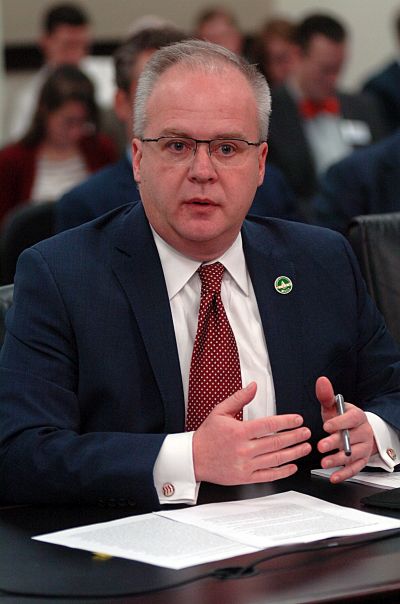 |
Rep. Adam Koenig. R-Erlanger, discusses
House Bill 175.
Click
here
for a high-res photo.
|
FRANKFORT—
A bill that would
legalize and regulate sports wagering, fantasy sports contests
and online poker in Kentucky advanced to the full House today
after being approved in committee.
House Licensing, Occupations and
Administrative Regulations Chair Rep. Adam Koenig said House
Bill 175 would allow licensed wagering on sanctioned
professional and college sporting events at Kentucky horse
tracks, Kentucky Speedway, or through an app downloaded at one
of those locations. Online poker would be regulated by the
Kentucky Lottery under the bill, which also sets out a
regulatory framework for operation of fantasy sports contests
that are already popular in the state.
HB 175 is sponsored by Koenig,
R-Erlanger, and Rep. Al Gentry, D-Louisville.
Sports wagering alone would generate at
least $20 million in annual tax revenue for the state under HB
175, according to committee testimony on the bill last week from
the firm Commonwealth Economics. All of that revenue—minus
administrative costs and five percent set aside for the state’s
problem gambling assistance fund—would go to pay down Kentucky’s
public pension debt, said Koenig.
Kentucky is one of several states to
consider legalizing sports wagering after the U.S. Supreme Court
last year overturned a federal law that prevented states from
allowing sports wagering. Koenig said Indiana and Tennessee are
considering sports wagering legislation this year while some
states including West Virginia and New Jersey—the state that
filed the lawsuit that led to last year’s Supreme Court
reversal—have already made sports wagering legal.
Many sports wagering websites operating
illegally in the U.S. today are run by offshore companies that
skim over $107 billion annually from the U.S. economy, according
to Commonwealth Economics’ testimony last week. HB 175, said
Koenig, will take the activity “out of the shadows” and ensure
sports, online poker and fantasy sports contest wagering is both
off limits to minors and safely regulated for use by adults.
“We have an opportunity now to make sure
this is done legally, safely, and in a regulated fashion where
people can be protected when they wish to engage in this
activity,” Koenig told the committee last week, with emphasis on
the bill’s benefit to the state pension system.
“It’s not going to fix the pension system but every bit
we can find to go to it helps,” he added.
Rep. Tom Burch, D-Louisville, spoke in
support of HB 175. Burch said he sponsored similar legislation
in 1978 when illegal wagering in Jefferson County alone totaled
$350 million a year.
“So we’re not talking about
peanuts—we’re talking about a lot of money,” Burch said.
Koenig said the issue needs to be
addressed so that the public is protected and “so that we know
that everything’s being done on the up-and-up. It’s only been
happening since they invented sports.”
The bill now goes to the full House for
its consideration.
--END--
Feb.
20, 2019
Senate approves
voter registration roster bill
| |
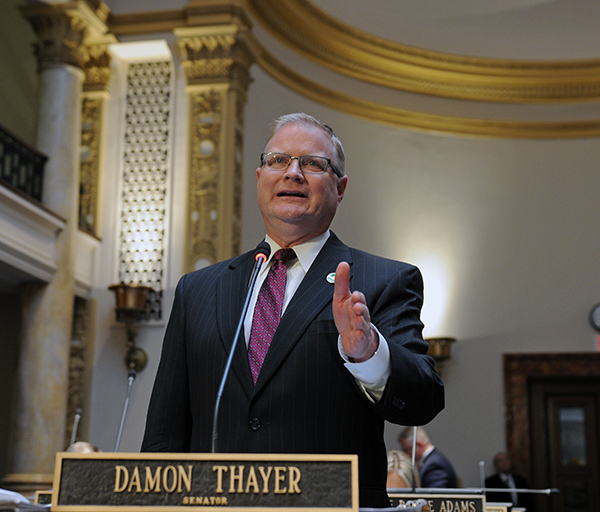 |
Senate Majority Floor Leader
Damon Thayer, R-Georgetown, discusses
Senate Bill 34 on the Senate floor
yesterday.
(Click
here
for a high-res photo.)
|
FRANKFORT – Legislation that would require
the Kentucky Board of Elections to institute measures to help
prevent inappropriate use of the voter registration roster has
advanced to the state House for its consideration.
The measure, known as
Senate Bill 34,
“would draw a bright line between the Secretary of
State’s office and the state Board of Elections,” said Senate
Majority Floor Leader Damon Thayer, R-Georgetown, who sponsored
the bill. It would do this by granting county clerks, assistant
county clerks and the Board of Election staff the sole authority
to access, correct or alter the voter registration roster.
“We need to send a strong message to the voters of
this commonwealth before the next election that takes place in
May … that the integrity of the ballot box and voter
registration rolls has been protected by the legislative branch
of the commonwealth of Kentucky,” Thayer said. SB 34 passed the
Senate yesterday by a 27-8 vote.
Sen. Reginald Thomas, D-Lexington, spoke against SB
34. He said legislators should wait for the outcomes of three
separate inquiries into the interplay between the Secretary of
State and Board of Elections, as it concerns the voter
registration roster.
“Once again … here we are throwing the baby out with
the bathwater,” Thomas said of SB 34’s provisions. “The
Secretary of State having access to our voter registration files
should remain intact. We want to keep our Secretary of State
strong and in charge of our election process.”
Thayer said SB 34 couldn’t wait because “the very
integrity to the Office of Secretary of State has been brought
into question.”
Sen. Christian McDaniel, R-Taylor Mill, explained
why he voted for SB 34.
“It is the prerogative of this body to make
adjustments in a timely matter," he said. "This is timely. This
is obvious, and I appreciate it being brought before us today.”
SB 34 was amended to include an emergency clause, a
provision in a bill that it become effective immediately upon
approval by the governor rather than 90 days after adjournment.
-- END --
Feb. 19, 2019
Golden Alert bill advances to
full House
| |
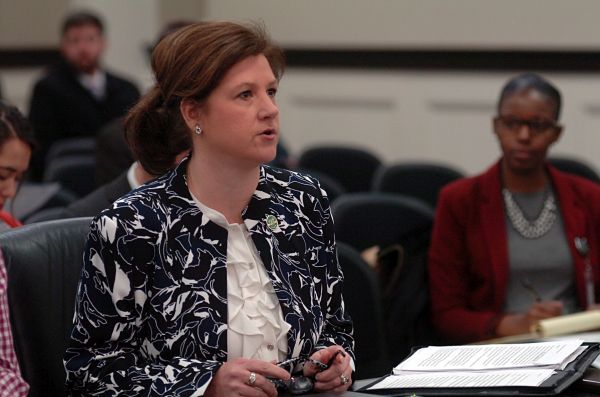 |
Rep. Deanna Frazier, R-Richmond,
discusses HB 150.
(Click
here
for a high-res photo.)
|
FRANKFORT— A House committee today approved
a bill that would change how the state issues Golden Alert
notifications when an impaired person goes missing.
It would be up to the Kentucky State Police
to initiate a Golden Alert under House Bill 150 should the agency
decide an alert is necessary for the safety of someone with a
physical, mental or cognitive impairment, such as Alzheimer’s
disease. The State Police would work with both state and local
agencies to issue an alert using “existing resources” such as
electronic highway signs, the Amber Alert broadcast emergency
response system, and electronic media, the bill states.
Golden Alerts in Kentucky are handled
currently by the Kentucky Division of Emergency Management in
cooperation with local search and rescue coordinators.
HB 150, which now goes to the full House
after passing the House Transportation Committee this afternoon, is
sponsored by Rep. Deanna Frazier, R-Richmond and House
Transportation Committee Chair Rep. Ken Upchurch, R-Monticello.
“This (bill) would … create more of a
coordinated effort for those who are impaired,” said Frazier.
Frazier told the committee that she filed
the legislation at the request of the family of Fred D. Warner, a
78-year-old Richmond man diagnosed with dementia who went missing in
late 2016. A Golden Alert was issued for Warner two days after he
disappeared, according to news reports. His body was found over a
month later inside his car, which was submerged in a local creek.
“When we filed the missing person’s report
with local authorities, they reassured us ‘This situation often
occurs and they eventually turn up days later after they run out of
gas money,’” Rick Warner, one of Fred Warner’s sons, told the panel.
Meanwhile, Warner said family and friends continued searching for
his father, posting fliers along the entire length of Kentucky’s
I-75 corridor.
“This only reached a very small fraction of
the total travelers that the overhead electric signs over I-75 would
have reached, and it took days to complete,” Warner told the
committee. Other resources already in place—such as electronic signs
over or alongside Kentucky highways—could have reached thousands
more people, he explained.
Supporting the bill was Rep. Al Gentry,
D-Louisville, who said HB 150 could improve the safety of persons
with autism. He told the committee of an autistic young man living
in his district who he described as “kind of a wanderer”—a trait
that he said concerns the young man’s mother.
“This would be another bill that is perfect
for that kind of a situation,” said Gentry.
--END--
Feb. 14,
2019
This Week at the State Capitol
FRANKFORT -- It’s easy to tell when a
Big-Issue Day arrives at the State Capitol.
You’ll hardly find an empty parking space on
any of the parking garage’s six levels. Elevators run nonstop to
shuttle people from the lower floors of the Capitol Annex to
lawmakers’ offices on the upper floors. Lines snake through the
annex cafeteria and spill into the hallway as hungry people wait
their turns for plates of meatloaf, pulled pork, or Salisbury steak.
Capitol observers are seeing more days like
this as lawmakers close out the third week of the General Assembly’s
2019 session. This week, issues including hemp, solar power, gun
rights, abortion, and foster care drew people from across the state
to the Capitol campus.
Legislation that moved closer to becoming
law this week included measures on the following topics.
Elections.
The House Elections, Constitutional Amendments and
Intergovernmental Affairs Committee advanced legislation on Feb.
11 that would require candidates for state offices and most
local offices to officially declare their candidacy via a
“statement-of-candidacy” form no later than the last Tuesday in
January preceding the general election. The current deadline is
April 1. House Bill 114 now goes to the full House for
consideration.
Wine.
Direct shipment of wine to Kentucky consumers would be legal
under a bill that was approved by the Senate Licensing,
Occupations and Administrative Regulations Committee on Feb. 12.
Senate Bill 99 now goes to the full Senate for consideration.
Hemp.
Two measures concerning the hemp industry were advanced by
the House Agriculture Committee on Feb. 13.
The committee approved House Bill
197, which
would expand the legal definition of hemp to include the
seeds of industrial hemp, derivatives, extracts, cannabinoids
and isomers, among other components. That is the same definition
found in the new U.S. Farm Bill, signed into law late last year,
which removed hemp from the federal Controlled Substances Act.
The committee also approved House Concurrent Resolution 43,
which asks social media sites Facebook and YouTube and web
marketplaces eBay and Amazon to revisit policies that interfere
with social media marketing of hemp-based products.
Both pieces of legislation now go to the full House.
Alzheimer’s disease.
On Feb. 13, the Senate
Health & Welfare Committee approved a measure that would create
an Alzheimer's and Dementia Workforce Assessment Task Force. The
task force would be responsible for studying the state’s
healthcare workforce needs and long-term care services,
including long-term care facilities that provide care to
individuals with Alzheimer’s or dementia. Senate Concurrent
Resolution 46 now goes to the full Senate for consideration.
Crime.
Senate Bill 70, which would increase penalties against
strangulation by making it a felony, was approved by the Senate
31-4 on Feb. 13. The measure now goes to the House. If it
becomes law, Kentucky would join 47 other states that already
have such laws.
Abortion.
On Feb. 14, the Senate gave its approval to a bill that
would prohibit an abortion if a fetal heartbeat was detected.
The legislation, Senate Bill 9, would allow exceptions for
medical emergencies. The bill passed the Senate 31-6 and has
been sent to the House, where a similar “fetal heartbeat” bill
has also been filed.
Another abortion measure, known as the
“Human Life Protection Act” advanced in a House this week. House
Bill 148 would outlaw abortion in Kentucky in most cases if the
landmark U.S. Supreme Court ruling in Roe v. Wade is reversed. The
bill would allow exceptions if an abortion is required to save the
mother’s life. House bill 148 now goes to the Senate for
consideration.
Solar energy.
Legislation that would change the way owners of solar power
systems are credited for electricity they add to the power grid
was approved by both the Senate and House this week. Under the
bill, the Public Service Commission would set the compensation
rate. Because the House amended Senate Bill 100 after receiving
it from the Senate, the bill now returns to the Senate to see
whether its members agree with the House changes. The original
version of the bill passed the Senate 23-12 on Feb. 13. The
amended version of the bill was approved by the House on Feb.
15.
Foster care.
Legislation that would establish a “bill of rights” for
foster children passed the House Health and Family Services
Committee on Feb. 14. House Bill 158 would add language to the
law books that declares foster children have 16 basic rights,
including the right to adequate food, clothing and shelter as
well as a safe, secure and stable families. The legislation also
would require background checks on child residential home and
placement agency staff. The bill now goes to the full House for
consideration.
Gun rights.
Legislation approved by the Senate 29-8 on Feb. 14 would allow a
person to carry a concealed firearm without a license in
Kentucky. Senate Bill 150 now goes to the House for
consideration.
Government contracts.
Legislation that would prohibit public agencies from
requiring that its contractors have agreements with labor
organizations was approved by the House on a 50-44 vote on Feb.
14. House Bill 135 now goes to the Senate for consideration.
Citizens who want to weigh in on the issues
under consideration can share their thoughts with Kentucky lawmakers
by calling the General Assembly’s toll-free message line at
1-800-372-7181.
--END--
Feb. 15,
2019
Abortion measure advances to Senate
| |
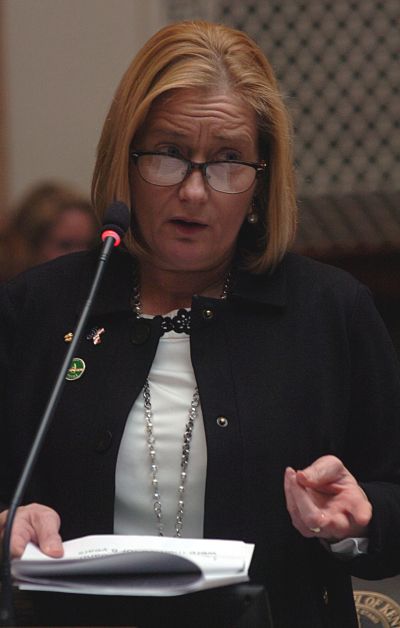 |
Rep. Nancy Tate, R-Brandenburg,
discusses House Bill 148 in the House.
(Click
here
for a high-res photo.)
|
FRANKFORT—A bill that would outlaw
abortion from the moment of fertilization for most women in
Kentucky if the U.S. Supreme Court overturns
Roe v. Wade
has cleared the state House.
The “Human Life Protection Act”
or House Bill 148, sponsored by Rep. Joseph M. Fischer, R-Ft.
Thomas and Rep. Nancy Tate, R-Brandenburg, passed the House on a
vote of 69-20. Should it become law, it would take effect
immediately if
Roe v. Wade—a
landmark 1973 case that legalized abortion nationwide—be
overturned, said Fischer.
“HB 148 (will) provide full legal
protection to every unborn child in Kentucky from the moment of
fertilization to childbirth only if the Supreme Court reverses
Roe v. Wade
or the Constitution is amended to restore authority to
any state to prohibit abortion,” said Fischer.
Fischer said HB 148 would ban abortion
procedures in Kentucky from the earliest stage of pregnancy through
childbirth except when required to save the mother’s life. An
abortion provider who violates the bill, if it becomes law, could
face felony charges.
HB 148 would not allow prosecution for an
unintentional abortion that occurs in the course of medical
treatment of the mother, and would not allow prosecution of a woman
who has agreed to abortion, said Fischer. And it would allow
prescribing of the so-called “morning after pill” for emergency
contraception since, Fischer said, that medication would be taken
“before there is knowledge of any pregnancy.”
Speaking against the bill was Rep. Patti
Minter, D-Bowling Green, who said HB 148 is designed to trigger
state legislative action should action be taken at the federal
constitutional level.
“It does nothing to advance any policy
objectives,” said Minter. “We should not be in the business of
passing a bill now that may or may not be valid, depending on what
might or might not get handed down by the Supreme Court.”
Rep. Tate advocated for the bill by telling her colleagues
of her childhood when her parents struggled to raise a growing
family on as little as $230 per month. “Challenges,” she said,
should not be seen as “hardships.”
“I look at (challenges) as opportunities to
grow as a person, to aspire to greatness, and to use our God-given
talent—and my God-given talent—as a woman,” said Tate.
Four states including North Dakota, South Dakota,
Mississippi and Louisiana have passed laws similar to HB 148,
Fischer said.
HB 148 now goes to the Senate for its
consideration.
--END--
Feb.
15, 2019
Net metering bill clears
House, returns to Senate
| |
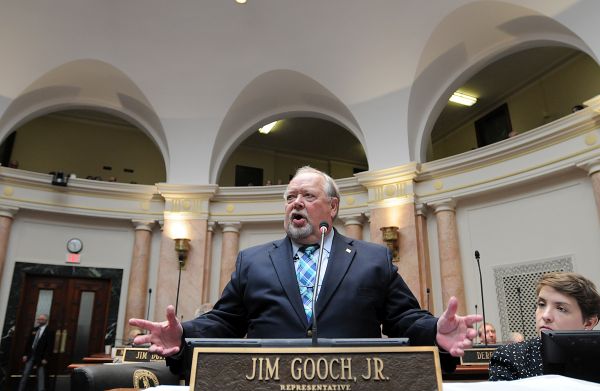 |
Rep. Jim Gooch,
R-Providence, discusses net metering
legislation in the House.
(Click
here
for a high-res photo.)
|
FRANKFORT—The House today amended and passed
legislation that would change how power companies credit customers with
solar panels who add power to the grid.
Senate Bill 100, also known as the net metering
bill, cleared the House on a vote of 71-24 after it was amended to
clarify that the Kentucky Public Service Commission (PSC) will determine
when and how net metering rates are set. Additionally, the House changes
would allow the solar industry to intervene in rate cases and allow
leasing of solar electricity generating systems, among other provisions.
SB 100, sponsored by Sen. Brandon Smith,
R-Hazard, was sent to the House after passing the Senate by a 23-12 vote
on Wednesday.
Rep. Jim DuPlessis, R-Elizabethtown, who
proposed the House changes said his amendment addresses “legitimate
concerns” that utilities and small businesses have with SB 100.
“Can we protect the non-solar customers, the
regular rate payers, those who can’t afford solar – can we protect those
– (and) can we help the utilities with the infrastructure costs that
they need without pulling the rug out from a fledgling, yet growing,
solar industry. The answer is yes we can,” DuPlessis told the House.
The House did not change provisions in SB 100
that would provide dollar-value credits for solar or eligible energy
sources fed into the power grid, a process known as “net metering.” Some
other Senate provisions were also retained, including a 1-percent cap on
the amount of power that utilities must accept from net metering
customers.
Rep. Jim Gooch, R-Providence, who presented SB
100 on the House floor for a vote was opposed to the amendment which he
said makes the bill “complicated.” Gooch said leasing of solar systems
could be especially problematic.
“Some of these solar installers will come around
to some older person or somebody (else) … and they will tell them ‘I can
save you 30 percent on your utility bill,’” said Gooch. If the rooftop
solar installation causes damage to the roof, Gooch said that damage may
not be easily fixed.
Although he opposed the amendment, Gooch did
vote in support of the bill.
Rep. Josie Raymond, D-Louisville, said she
specifically opposes the 1-percent cap in the bill. She said the cap
could remove incentives for customers to buy and install solar
electricity generating systems.
“When we need one another to address a real,
urgent, irreversible climate crisis, I encourage interdependence—not
isolation—and that’s why I’m against this bill,” said Raymond, who voted
against the bill.
Rep. Joni Jenkins, D-Shively, supported the bill as amended. Jenkins
said she decided to support SB 100 after learning that those on both
sides of the issue feel the bill is, she said, a “good step.”
“It’s not everything that many of us want, but
you know what? It’s a whole lot better than it was this morning. So I
will be voting yes to keep the conversation going,” she said.
SB 100 now returns to the Senate for its
consideration of the House changes.
--END--
Feb. 15,
2019
Direct wine shipments could
flow to commonwealth
| |
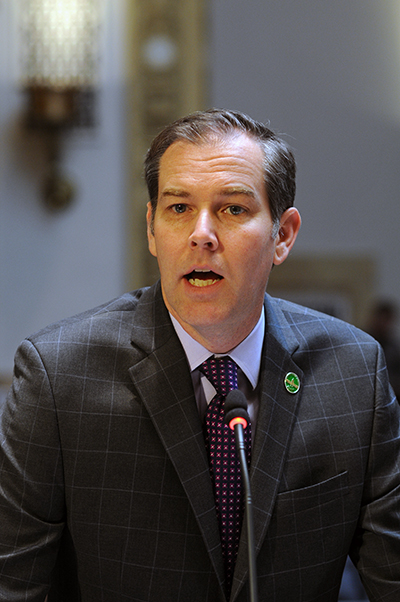 |
Sen. Max Wise, R-Campbellsville,
presents legislation to allow
direct wine shipment to
consumers.
Click
here
for a high-res photo.
|
FRANKFORT – Direct shipment of wine to consumers
would become legal under a bill that passed the state Senate today by a
29-5 vote with one legislator abstaining.
The measure, known as
Senate Bill 99, would make Kentucky the 46th state to
legalize direct wine shipments.
Sponsor Sen. Max Wise, R-Campbellsville, said SB
99 was amended to address concerns from the Wine & Spirits Wholesalers
of Kentucky. Representatives of the group testified earlier in the week
that the original version of SB 99 might allow unscrupulous wineries to
gain an economic advantage by dodging state taxes on the libations they
direct ship.
Wise said the amended SB 99 was, in part, an
economic development bill.
“Wine is booming in the United States,” Wise
said. “It is also booming in the commonwealth of Kentucky. Forty years
ago, Kentucky only had 40 acres of wine grapes in commercial vineyards.
Now, 600 acres, over 70 licensed wineries and 150 growers make up the
state’s wine industry. It has become a very significant ‘Kentucky Proud’
product that our commonwealth should be very proud of.”
Wise said a second benefit would be to
Kentuckians who might be yearning for the bouquet of their favorite wine
from California, Oregon, Washington or other wine-growing states. He
said SB 99 would allow these oenophiles to become members of wine clubs
or have wine shipped back from out-of-state wine vacations.
Direct shipment of wine now makes up 80 percent
of all red wine shipped in the United States, Wise said. He added that
the 45 states allowing direct wine shipments represent 94 percent of the
total U.S. population.
“I have heard from many constituents from across
the commonwealth who would like Kentucky to join those other states,”
Wise said.
-- END --
Feb. 15, 2019
Kentucky General Assembly to convene in historic Old
State Capitol
| |
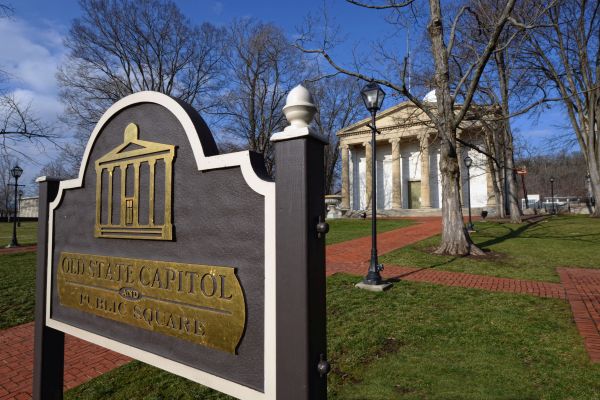 |
Ken tucky lawmakers will convene in
the Old State Capitol on Feb. 19.
(Click
here
for a high-res photo. The photo is provided courtesy of
the Kentucky Historical Society.) |
FRANKFORT -- Kentucky lawmakers will meet in
historic surroundings next week when the General Assembly convenes in
the Old State Capitol Building, a National Historic Landmark that was
the center of Kentucky government from 1830 to 1910.
The Kentucky Senate and House of
Representatives will go into session in the Old State Capitol’s historic
chambers at 2 p.m. on Tuesday, Feb. 19. The building is located at 300
W. Broadway St. in Frankfort.
“We’re fortunate that Kentucky has been so
diligent about preserving a historical treasure that played a key role
in our state’s history,” said Senate President Robert Stivers II,
R-Manchester. “The Old State Capitol is where many decisions made over a
century ago set a course that affects Kentuckians to this day.”
House Speaker David Osborne, R-Prospect,
credits the Kentucky Historical Society for inviting lawmakers to meet
in the Old State Capitol.
“Kentucky has a rich history and it comes to life at the Old State
Capitol,” Osborne said. “The House Chamber saw more than eight
decades of political debate on its floor and countless pieces of
public policy enacted within its walls. The Old Capitol’s historic
halls have witnessed some of the worst times in our country’s
history, but like our Commonwealth they have stood the test of time.
Citizens can
view the Feb. 19 proceedings from the Old State Capitol on a livestream
on Kentucky Educational Television’s website at
www.ket.org/legislature/.
Proceedings will also be broadcast on KET KY, the Kentucky Channel.
(Journalists who have badges to cover the General Assembly will be
admitted to the Old State Capitol’s chambers as space permits.)
The Old State Capitol is a Greek Revival structure, designed by
Kentucky native Gideon Shryock, and is widely regarded as a
masterpiece of 19th Century architecture. It was the third State
Capitol built on Frankfort’s old public square and served as the
center of Kentucky government until the current State Capitol
building opened a little over one mile away in 1910.
Upon
completion of the Old Capitol proceedings on Tuesday, the Senate and
House will reconvene in the current State Capitol’s legislative
chambers to handle procedural matters, such as the introduction of
bills, before officially adjourning for the day.
--END--
Feb. 14,
2019
Public works contract bill advances to
Senate
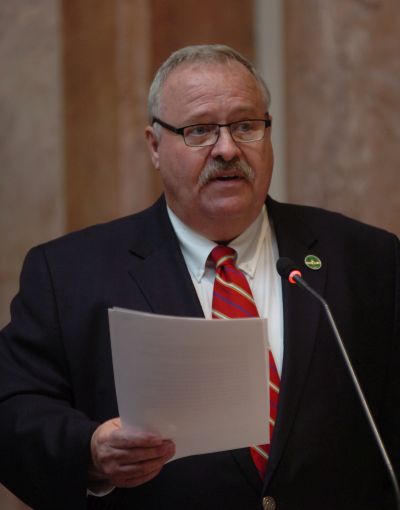
Rep. Phillip Pratt, R-Georgetown,
discusses House Bill 135.
Click
here for high-res photo.
FRANKFORT—A bill that would prohibit public
agencies from mandating agreements between labor unions and
contractors vying for public works projects has passed the Kentucky
House.
HB 135 was amended by the House and sent to
the Senate on a vote of 50-44 following floor debate on whether
public agencies should be allowed to require contractors on public
works projects to enter into “project labor agreements,” or PLAs,
with organized labor. HB 135 Rep. Phillip Pratt, R-Georgetown, said
the bill would make taxpayer-funded contracts more competitive and
fair.
HB 135 “will create conditions for all of
Kentucky’s skilled labor and qualified contractors to compete on a
level playing field,” said Pratt.
Only public works projects that present
“special circumstances (requiring) an exemption to avert an imminent
threat to public health or safety” would be exempt from the
requirements of HB 135, the bill states.
Twenty four other states have passed
legislation similar to HB 135, according to testimony on the bill
before the House Local Government Committee last week.
Voting against the bill was Rep. Jeffery
Donohue, D-Fairdale, who told the House that Kentucky has never
mandated a project labor agreement on public works projects. He
called HB 135 “a solution searching for a problem.”
“The reason we’re having this discussion is
because this legislation is trying to put labor in what is
considered ‘their place,’” said Donohue. He said PLAs are an option
available to the public and private sectors, but are mainly a
private sector tool. Toyota, he said, has used PLAs on their major
construction projects for over three decades.
Voting in favor of the bill was Rep. Michael Meredith,
R-Oakland, who said HB 135 will make sure any qualified contractor
in Kentucky can bid on a public works contract, whether they are
a union shop or not.
“Passing this bill will allow us to open up
the process so we truly can see in every situation—whether it’s
Louisville, Lexington, Paducah, Bowling Green, our school districts
across the Commonwealth—we can make sure they get the lowest and the
best bid so that our taxpayers get the best bang for their buck,”
said Meredith.
HB 135 now goes to the Senate for
consideration.
--END--
Feb. 14, 2019
Abortion-related measure advances to House
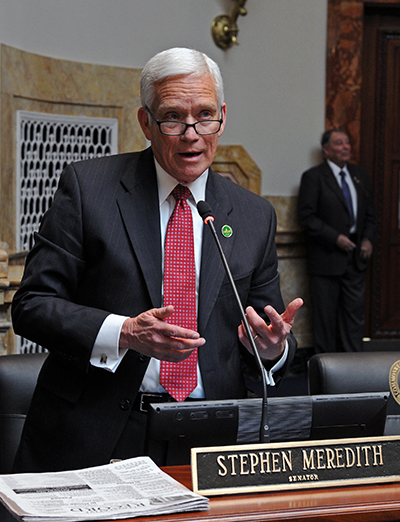
Sen. Stephen Meredith,
R-Leitchfield, explains his vote for Senate Bill 9.
Click
here for high-res photo.
Frankfort – A bill that would prohibit an
abortion if a fetal heartbeat was detected advanced out of the state
Senate today by a 31-6 vote.
Senate Bill 9
sponsor, Sen. Matt Castlen, asked everyone in the chamber to
place two fingers on their wrist.
“What do you feel?” said Castlen,
R-Owensboro. “You feel your pulse. That’s a sign your heart is
beating. It is undeniable that a heartbeat stirs life.”
He said another provision of SB 9 would
provide exceptions for medical emergencies. Language in SB 9 also
specifically states the measure would not restrict access to
contraceptives.
Sen. Denise Harper Angel, D-Louisville,
explained why she voted against SB 9.
“This bill has been declared
unconstitutional and it is going to cost Kentucky hundreds of
thousands of dollars,” she said in reference to anticipated court
challenges. “Each year we cut education. We have our opioid crisis.
We have our pension crisis. We have 10,000 children in foster care
... so I’m wondering why we are spending scarce resources defending
a clearly unconstitutional bill?”
Senate President Robert Stivers II,
R-Manchester, voted for SB 9 before addressing some of the criticism
of the measure. He said the Supreme Court could reverse precedence,
and it’s well beyond the chamber’s ability to try to prognosticate.
Sen. Stephen Meredith, R-Leitchfield, also
explained his “yes” vote.
“A lot of people say men shouldn’t make
these decisions,” he said. “I represent women in my district. I ran
as a pro-life candidate. I speak for them, just like I speak for my
wife today.”
SB 9 now goes to the House of
Representatives for consideration.
-- END –
Feb. 14, 2019
Senate approves concealed
carry legislation
FRANKFORT – The state Senate passed a
measure today that would allow someone to carry a concealed firearm
without a license by a 29-8 vote.
Senate Bill 150,
dubbed the permitless carry bill, states that people 21 or older
who are able to lawfully possess a firearm may carry a concealed
weapon without a license in the same locations as people with
valid state-issued licenses. Another provision states no one
would be allowed to carry or possess any deadly weapon where it
is already prohibited by federal law.
Sponsor Sen. Brandon Smith, R-Hazard, said
he wanted to stop making criminals out of individuals who happen to
slip a gun in their pocket.
Sen. Danny Carroll, R-Paducah, said he
opposed SB 150 because it doesn’t require gun training and safety
classes.
“Most people in this body know my career was
in law enforcement,” he said. “For 24 years, I depended on firearms
to protect me and to allow me to protect my community. However, as
part of that responsibility, I had to receive training at least once
a year.”
He said that training not only included how
to shoot a gun, but also how to clean it, store it and – most
importantly – when it was legally justified to use it.
Sen. Wil Schroder, R-Wilder, spoke in
support of SB 150. He noted that the Kentucky Constitution already
guarantees the right to open carry, or carry a firearm that is not
concealed.
“You are going to have bad actors out
there,” said Schroder, a former prosecutor. “You can walk up on
someone today and not know if they have a concealed weapon on them.”
SB 150 now goes to the House of
Representatives for consideration.
-- END --
Feb.
14, 2019
Foster child ‘bill of rights’ measure advances
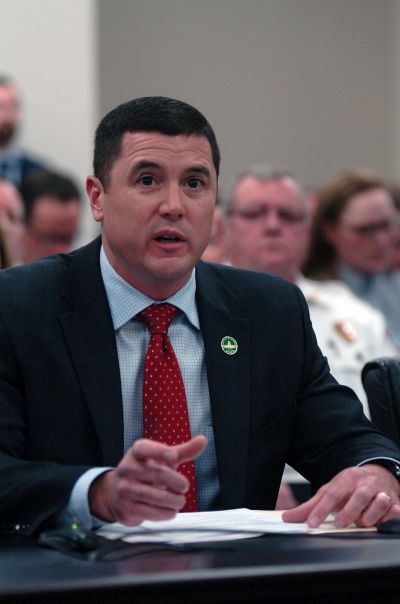
House Speaker Pro Tempore David Meade explains House
Bill 158.
Click
here for high-res photo.
FRANKFORT—A bill that would give
statutory rights to Kentucky foster children and require
background checks on those who work with children in out-of-home
care today passed a House committee.
House Bill 158 sponsor and House Speaker Pro Tempore David
Meade, R-Stanford, told the House Health and Family Services
Committee that the foster child “bill of rights”—a list of 16
rights including the right to “adequate food, clothing, and
shelter” and “a safe, secure and stable family”—was included in
HB 158 to match a foster parent “bill of rights” already in
statute.
“We’re adding a foster child ‘bill of rights’ to show the rights
that a child has as they are in foster care,” said Meade, adding
that the proposed rights for foster children is the part of the
bill of which he’s most proud.
College student Cameron Galloway spoke in favor of the proposed
rights. Galloway, who told the committee that he himself was
once in foster care, said having statutory rights will encourage
foster children to “stand up for themselves in a respectful way.
“Giving youth and kids their own rights by law will impact them
tremendously. Why? Because most don’t even know they have
rights,” Galloway told the panel.
HB 158 would also require national and state background checks
on child residential home and placement agency staff as required
by a 2018 federal law, according to Meade. The cost of the
background checks would be covered by the home or agency, not
the employee, he said.
Meade and Rep. Joni Jenkins, D-Shively, were the primary
sponsors of HB 1 that became law last year. That legislation
includes broad adoption and foster care reforms intended to
reduce the waiting time for children needing permanent homes and
improve the overall foster care and adoption process in
Kentucky.
Other provisions in HB 158 address timeframes for searches of
Kentucky’s “putative father” registry—a state registry created
under HB 1 for men who want parental rights to a child they
claim to have fathered—as well as clarify some legal definitions
involving abuse and neglect of a child. The bill would also
update the definition of “voluntary and informed consent”
regarding adoption.
“I think we’ve done some great things over the past couple of
years in this state for foster youth and the adoption process as
well,” Meade told the committee. “Kentucky is able to be a
leader in the nation on this.”
HB 158 now goes to the full House for consideration.
--END--
Feb. 14, 2019
Concealed carry legislation advances in Senate
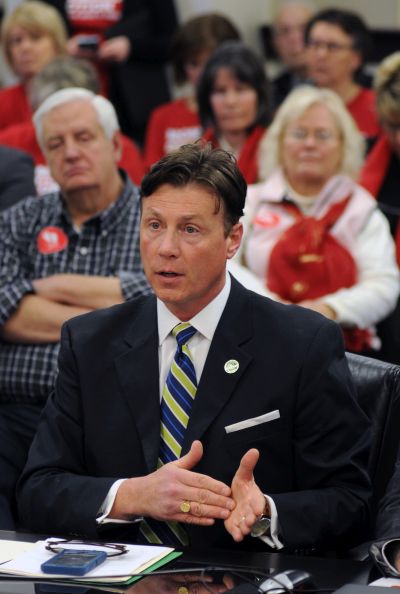
Sen. Brandon Smith, R-Hazard,
outlines House Bill 150.
Click
here for a high-res photo.
FRANKFORT – Legislation that would allow
someone to carry a concealed firearm without a license cleared a
state Senate panel today.
Senate Bill 150,
dubbed the permitless carry bill, states that people 21 or older
who are able to lawfully possess a firearm may carry a concealed
weapon without a license in the same locations as people with
valid state-issued licenses. Another provision states no one
would be allowed to carry or possess any deadly weapon where it
is already prohibited by federal law.
While testifying before the Senate Veterans,
Military Affairs and Public Protection Committee, sponsor Sen.
Brandon Smith, R-Hazard, said SB 150 would decriminalize carrying a
deadly weapon without a license for those who meet the requirements.
Carrying a concealed weapon without a license is currently a
misdemeanor unless the defendant has been previously convicted of a
felony involving a deadly weapon, in which case it is a felony.
Smith said SB 150 would provide relief to
people, such as domestic violence victims, who might carry a
concealed firearm but do not have the time or cannot afford the
training and licensing fees for a concealed carry license. He said
SB 150 would also give law-abiding gun owners the ability to better
protect themselves and their loved ones.
Sen. Denise Harper Angel, D-Louisville, said
she has had a concealed carry license for more than 20 years but
couldn’t support SB 150 because it doesn’t require gun training and
safety classes.
“The basic fundamental instruction I
underwent to receive that (license) gave me the confidence I could
handle that weapon,” she said. “I think taking away that training is
certainly going in the wrong direction.”
There was also a concern about the loss of
revenue from licenses. Currently, sheriffs’ offices retain $20 of
each $60 application and renewal fee, according to a Local
Government Mandate Statement prepared by the Legislative Research
Commission.
Art Thomm of the National Rifle Association
testified in support of SB 150. He said people could still get
concealed carry licenses so, among other things, they could carry
concealed firearms in states with reciprocity agreements with
Kentucky.
Stephen McBride of the Kentucky Concealed
Carry Coalition, commonly referred to as KC3, also testified in
support of waiving the concealed carry permit system.
“Open carry of handguns has been legal in
Kentucky for over 200 years,” McBride said. “There has never been a
permit required to do that.”
SB 150 now goes before the full Senate for
consideration.
-- END --
Feb. 14,
2019
| |
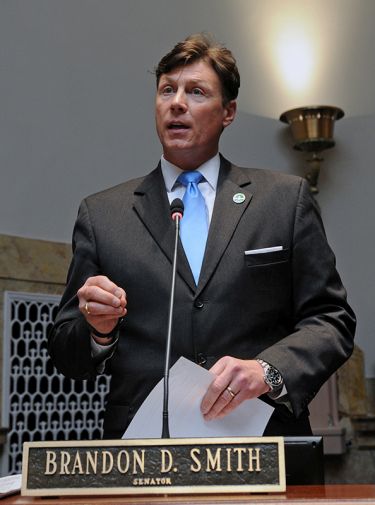 |
Sen. Brandon Smith, R-Hazard, discusses Senate
Bill 100.
|
Solar bill approved by Senate
FRANKFORT – A bill that would change how
much owners of solar power systems are reimbursed for electricity
they add to the power grid passed the state Senate yesterday by a
23-12 vote.
The legislation, known as
Senate Bill 100,
is often referred to as the net metering bill, a reference to the
type of billing structure applied to owners who have installed solar
power panels, often on top of their homes or small businesses.
The bill is scheduled to be considered by a
House committee this morning.
Sponsor Sen. Brandon Smith, R-Hazard, said
when these rooftop solar and other on-site distributed generation
(DG) systems first came to market, 43 states – including Kentucky –
approved net metering billing to encourage the use of renewable
energy.
While net metering policies vary, electric
customers of DG systems generally are credited for any electricity
they sell via the electric power grid. Smith explained that law
requires electric utilities to purchase this excess power at full
retail electricity rate, calculated to include the fixed costs of
polls, wires, meters and advanced technology that make the electric
grid service reliable.
Smith said the problems is that when net
metering electric customers are credited at the full retail rate,
they effectively avoid paying to maintain the grid. That cost is
left to everyone else.
Sen. Robby Mills, R-Henderson, stood in
support for SB 100.
“We took this piece of legislation, met with
both sides, worked on it through the interim and came to what I
consider a very good solution for both sides,” he said. “It is a
compromise. It is what government should be.”
Mills praised the fact that SB 100 would
grandfather in those participating in the current net metering
structure for 25 years. In addition, those who install solar panels
within the next year would be covered by the grandfather clause.
Those installing solar panels after that, however, would have the
value of the extra electricity set by the Kentucky Public Service
Commission (PSC).
“The PSC isn’t always the most accommodating
organization for power companies,” Mills said. “They are a fair,
non-partisan organization that will set ... a fair price.”
Senate Minority Floor Leader Morgan
McGarvey, D-Louisville, stood in opposition of SB 100. He questioned
whether SB 100 would give authority to the PSC to adequately assess
the value of the extra electricity.
“The PSC didn’t write this bill,” he said.
“The utility companies did.”
Smith defended SB 100.
“This is not a utility bill,” said Smith,
who stressed he wasn’t anti-solar. “It is not even a solar bill.
This is a customer bill. This is a Kentucky rate-payer bill because
they are the ones caught in the middle of the seesaw.”
-- End --
Feb. 13, 2019
House panel approves “Human Life
Protection Act”
| |
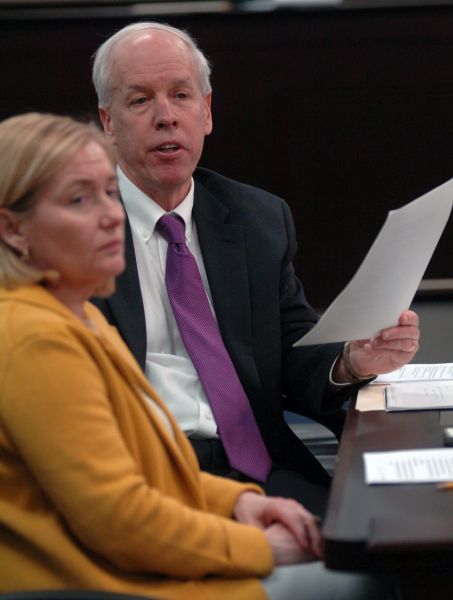 |
Rep. Joseph M. Fischer, R-Ft. Thomas, and Rep.
Nancy Tate, R-Brandenburg, present House
Bill 148.
Click
here
for a high-res photo.
|
FRANKFORT—A bill that would
outlaw abortion in Kentucky in most cases if the landmark
U.S. Supreme Court ruling in
Roe v. Wade is reversed is on its way to the floor of
the Kentucky House.
The “Human Life Protection Act”
or House Bill 148, sponsored by Rep. Joseph M. Fischer,
R-Ft. Thomas, and Rep. Nancy Tate, R-Brandenburg, would take
effect automatically should the U.S. Supreme Court overturn
Roe v. Wade—a landmark 1973 case that legalized
abortion nationwide—said Fischer.
“HB 148 would essentially
restore the right to life in Kentucky as it existed before
Jan. 22, 1973 (the date of the
Roe v. Wade
ruling),” said Fischer. “(It will) provide full legal
protection to every unborn child in Kentucky from the moment
of fertilization to childbirth only if the Supreme Court
reverses
Roe v. Wade or
the Constitution is amended to restore authority to any
state to prohibit abortion.”
Reversal of
Roe v. Wade
would trigger the bill, which Fischer said would ban
abortion from the earliest stage of pregnancy except when
required to save the mother’s life or at times where
abortion occurs unintentionally during medical treatment of
the mother.
Four states including North
Dakota, South Dakota, Mississippi and Louisiana have passed
laws similar to HB 148, Fischer added.
While Fischer said he is not
aware of any pending U.S. Supreme Court cases that could
lead to an overturn of
Roe v. Wade,
he said having the provisions in HB 148 in place will put
Kentucky on “the standby list.”
Rep. McKenzie Cantrell,
D-Louisville, said not all of
Roe v. Wade
may be overturned in any possible reversal by the Supreme
Court. She suggested that more oversight be built into HB
148 before it could be triggered.
“(It might be appropriate) to
take a look at the opinion to see whether indeed—if the
Supreme Court decides to overturn
Roe v. Wade—whether
indeed it actually did before this law goes into effect,”
said Cantrell.
Fischer said hopefully the Supreme
Court’s opinion will be clear. “The burden of this bill is on
the Supreme Court,” he said.
Opponents to HB 148 testifying before
the committee included ACLU Advocacy Director Kate Miller, who
said that HB 148 makes no exceptions for victims of rape, incest
or domestic violence, no exceptions for in utero birth defects,
and would disproportionately affect single mothers and women
living in poverty.
Women in poverty are more likely to be
victims of domestic violence, which Miller said leads to higher
rates of “unintended pregnancy.” Pregnancy, she said, then puts
those women “at a higher risk of experiencing violence while
they’re pregnant.”
Rep. Stan Lee, R-Lexington, spoke in
favor of the legislation and said it will save lives. Lee spoke
of the “unalienable rights” outlined in the Declaration of
Independence.
“Mr. Chairman, ladies and gentlemen,
members of the committee, do you know what the first right
listed is? It’s the right to life,” said Lee. He said support is
needed for the “unborn life.”
Fischer said some states
including New York have passed laws or are considering laws
expanding abortion rights in advance of any possible
reversal of
Roe v. Wade. HB 148, he said, would take Kentucky “the other way.”
“Kentucky has a long and storied history
of protecting human life at all stages of development, at least
until the (U.S.) Supreme Court removed that authority,” he told
the committee.
HB 148 now goes to the full House for
consideration.
--END--
Feb. 13, 2019
Senate shines light on non-fatal
strangulations
| |
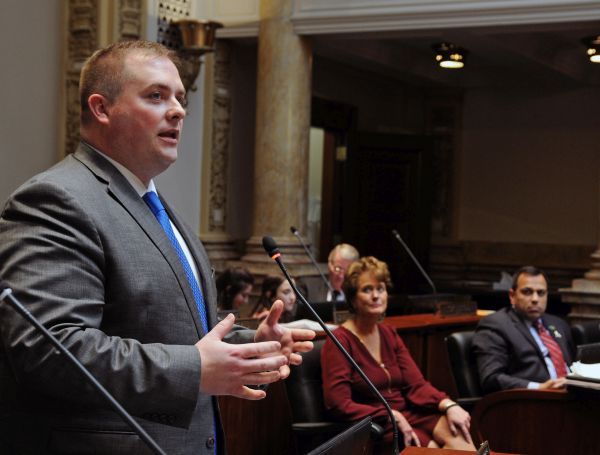 |
Sen. Whitney Westerfield,
R-Crofton, discusses Senate Bill 70
shortly before the measure was
approved by the Senate.
(Click
here
for a high-res photo.)
|
FRANKFORT – The state Senate passed
legislation today that specifically addresses non-fatal
strangulation.
The measure, known as
Senate Bill 70,
would create the crime of non-fatal strangulation as a felony.
“The crime does not require a particular
level of injury, but the person who commits the crime does so by
impeding and restriction the breathing or blood flow of another
person through applying pressure to their throat, neck or torso
and blocking the nose or mouth,” said sponsor Sen. Alice Forgy
Kerr, R-Lexington. “If the act of strangulation results in an
injury which meets the elements of another crime, the crime with
the highest penalty would apply.”
SB 70 would also amend the legal
definitions of domestic violence and abuse, and dating violence
and abuse, to include strangulation.
“This would mean that people seeking
protective orders, who have been strangled, could more
effectively prove the need for this protective order,” Kerr
said.
She said 38 states already have laws
specifically criminalizing strangulation.
Sen. Robin L. Webb, D-Grayson, explained
why she voted against SB 70. She said the bill would define
strangulation so broadly that it could be applied to situations
other than domestic violence.
“It is going to have a lot of unintended
consequences in the field,” said Webb, a lawyer by trade. “The
language is such that if I slap you on the torso ... impeding
your breathing, I can be charged with a felony.”
After SB 70 passed by a 31-4 vote, Kerr
acknowledged strangulation survivor Nancy Ross-Stallings who was
sitting in the gallery. The Danville woman testified about her
attack last week before the Senate Judiciary Committee.
Kerr said Ross-Stallings went public
about her attack because she wanted to give other victims of
this type of violence chances she wasn’t afforded.
“Senate Bill 70 ... will give law
enforcement and the victims additional tools to deal with their
assailants,” Kerr said.
SB 70 passed by a 31-4 vote. It now goes
to the House of Representatives for consideration.
-- END --
Feb. 13,
2019
Lawmakers consider Alzheimer’s task force
|
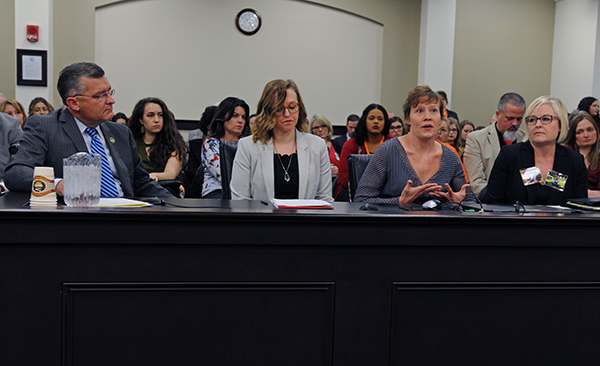 |
Pictured, from left:
Resolution 46 sponsor Sen. Robby
Mills, R-Henderson; Mackenzie
Longoria, director of public policy
at Alzheimer’s Association; Sara
Donkin, a former caregiver; and
Andrea Whelan, Alzheimer’s
Association board member.
Click
here
for a high-res photo.
|
FRANKFORT – State Sen. Robby Mills
started noticing some changes in his father’s mannerisms and
communication skills in 2011. Three years later, Mills’
father was finally diagnosed with a disease called
supranuclear palsy.
“Our family went through many trying circumstances
... none of which I would wish on anybody,” said Mills,
R-Henderson, while testifying before today’s meeting of the
Senate Health & Welfare Committee in favor of
Senate Concurrent Resolution 46.
SCR 46 would create the Alzheimer's
and Dementia Workforce Assessment Task Force to study the
state's healthcare workforce needs as well as the state's
long-term care services and supports infrastructure. The
task force would be required to meet monthly during the
upcoming legislative interim and to submit findings and
recommendations to the Legislative Research Commission by
December.
“This is a terrible disease,” Mills
said of supranuclear palsy, known as PSP. “It is a mixture
of Parkinson’s and dementia. This disease ultimately claimed
my father’s life on Nov. 9, 2018. Our family went through
many trying circumstances during the seven-year period….”
Mills said the number of Kentuckians
living with Alzheimer’s or other forms of dementia is
expected to grow to more than 85,000 by 2025.
Mackenzie Longoria, of the
Alzheimer’s Association, added that there are currently
71,000 Alzheimer’s patients in Kentucky. She said 250,000
Kentuckians provide more than 20 hours per week of unpaid
care to those individuals.
“Alzheimer’s is the most expensive
disease in America,” Longoria said. “In addition to the
costs, it is also the sixth leading cause of death in the
United States, killing more seniors than prostate cancer and
breast cancer combined.”
In 2018 alone, the medical costs
associated with this disease reached $277 million, she said.
“It is our hope to shed light on
something that for too long had been considered an aging
issue, but it is not a normal part of the aging process,”
Longoria said. “It is actually an economic and public health
crisis.”
Sen. Ralph Alvarado, R-Winchester,
said SCR 46 would create a task force similar to what
Wisconsin did a few years ago that led to the development of
what is now considered the “gold standard” in
dementia-related public policy.
Sen. Julian M. Carroll, D-Frankfort,
recounted his wife’s Alzheimer’s before she passed away.
“I just want people to understand
... what these patients undergo,” he said, adding that
Kentucky’s top doctors could do little for his wife in the
end.
“It is a major, major matter we need
to address,” Carroll said.
SCR 46 now goes to the full Senate
for consideration.
-- END --
Feb.
13,
2019
Hemp legislation passes House Agriculture panel
|
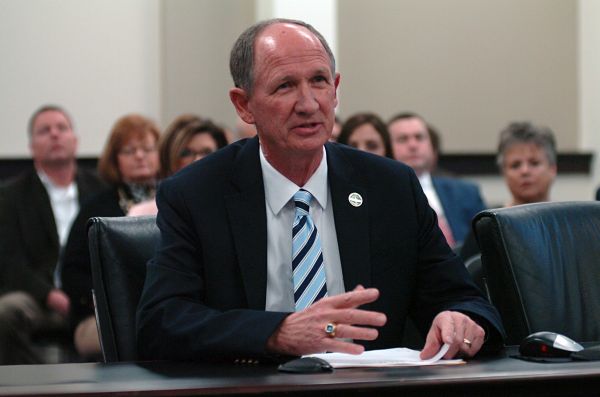 |
Rep. Richard Health, R-Mayfield, testifies
on hemp legislation.
(Click
here
for a high-res photo.)
|
FRANKFORT—Kentucky would expand its
definition of industrial hemp to match language in the
recently signed 2018 Farm Bill under legislation that today
cleared the House Agriculture Committee.
House Bill 197, sponsored by House
Agriculture Chair Rep. Richard Heath, R-Mayfield, would
expand the definition to include the seeds of industrial
hemp—formally called Cannabis sativa L.—derivatives,
extracts, cannabinoids and isomers, among other components.
That is the same definition found in the new U.S. Farm Bill,
signed into law late last year, which removed hemp from the
federal Controlled Substances Act.
Until last year hemp was outlawed
nationwide since 1970 under the federal Controlled
Substances Act. The 2014 federal Farm Bill, however, allowed
states to engage in hemp research pilot programs under
certain conditions. Industrial hemp has been grown in
Kentucky since 2014 under a state-regulated research pilot
program.
The committee today also approved
House Concurrent Resolution 43, also sponsored by Rep.
Heath, which asks social media sites Facebook and YouTube
and web marketplaces eBay and Amazon to revisit policies
that some users say interfere with marketing of hemp-based
products.
“Multiple industrial hemp business
owners across the Commonwealth encountered an unnecessary
obstruction in marketing efforts when their key marketing
platforms, such as Facebook, unpublished their web pages”
even through production and marketing of industrial hemp and
hemp products are legal, the resolution states.
If passed by both chambers and
signed by the governor, HCR 43 would formally request that
the four internet companies “quickly reexamine their
policies relating to industrial hemp businesses.”
Both pieces of legislation now go
to the full House for consideration.
--END--
Feb. 12,
2019
E-scooter bill rolls out of House committee
FRANKFORT—Shareable electric
scooters like the Bird-brand scooters now rolling down
Louisville’s streets, would be defined under Kentucky law
via a bill that today cleared the House Transportation
Committee.
House Bill 258, sponsored by House
Transportation Committee Chair Rep. Ken Upchurch,
R-Monticello, would both define and set operating standards
for “electric low-speed scooters”—or e-scooters—like Bird
scooters that have been available for rent via a phone app
in Louisville since last year. The scooters are growing in
popularity, with Bird rentals now available in over 100
cities worldwide.
Sam Reed with Bird told the
committee that HB 258 would allow e-scooters to legally
operate much like bicycles on public streets and bicycle
paths. It would also limit scooter speeds to 20 mph and set
a minimum e-scooter rider age of 16.
“The equipment that we use, the
e-scooters, are not currently defined in state law in
Kentucky,” said Reed. “What this bill does is it essentially
will follow the national regulatory consensus of other
companies that are doing the same things were are—Uber,
Lyft, Spin, dozens of others—by updating the vehicle code in
Kentucky to treat e-scooters similar to bicycles.”
The bill would not prevent local
governments from further regulating e-scooters, said Reed.
Reed described Bird scooters as a
low-cost way to move people short distances. The average
ride on a Bird scooter is 1.5 miles, he said, with each ride
costing 15 cents per mile plus a $1 initial rental fee.
Riders of Bird scooters must be at
least 18 years of age and upload an image of their driver’s
license to operate one of the scooters, said Reed. They are
also encouraged to wear a helmet, he said.
Rep. Russ Meyer, D-Nicholasville,
asked Reed how similar Bird scooters are to bicycles that
can be rented by app. They are similar, said Reed, although
he said Bird scooters are “dockless” – meaning they don’t
have to be returned to specific locations after a ride.
“(Bird) opens up these vehicles to
be real, true last-mile transportation for folks,” said
Reed.
HB 258 now goes to the full House for consideration.
--END--
Feb. 12,
2019
Legislature could
uncork direct wine shipments
|
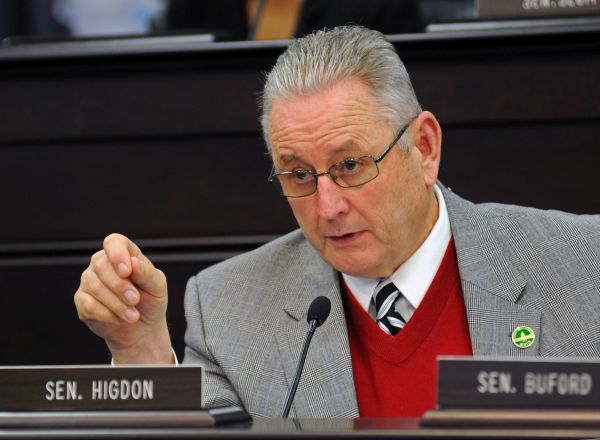 |
Sen. Jimmy
Higdon, R-Lebanon, asks a question about SB 99.
(Click
here
for a high-res photo.) |
FRANKFORT – Direct shipment
of wine to consumers would become legal under a bill that
advanced in the state Senate today.
“This is something we have
been talking about a long time,” said Sen. John Schickel,
R-Union, chairman of the Senate Licensing, Occupations and
Administrative Regulations Committee, the legislative panel
that advanced the measure, known as Senate Bill 99.
He said he has received more
phone calls from Kentucky citizens in favor of direct
shipment of wine than any other issue that has come before
the committee in the eight years he has chaired it.
Sen. Max Wise,
R-Campbellsville, a sponsor of the bill, testified that 45
states allow direct shipment of wine to consumers. He said
it has been reported that a record $3 billion of wine was
shipped directly to consumers last year.
Senate Majority Floor Leader
Damon Thayer, R-Georgetown, said he supported SB 99. He said
Kentuckians visiting California want the ability to ship
wine back home that isn’t sold at their local retail
establishments.
Sen. Jimmy Higdon,
R-Lebanon, asked for clarification on how much wine could be
shipped to an individual. Hunter Limbaugh of the Wine
Institute testified that a winery in another state could
ship up to 24 cases per year to an individual.
Charles George of Wine &
Spirits Wholesalers of Kentucky asked that tighter oversight
and accountability measures be written into SB 99.
“This bill is kind of like
spilling red wine on white carpet,” he said. “It is going to
take a lot of scrubbing to clean it up.”
George said his association
would like, among other things, for SB 99 to include what’s
known in shipping circles as “common carrier reporting.”
That’s when shippers, such as UPS and FedEx, are required to
report the amount of alcohol being shipped through their
systems into Kentucky by out-of-state suppliers. George
added that it is required in 15 states, including four
neighboring states.
He also objected to language
in SB 99 that would reduce the penalty for illegally
shipping wine into the state to a misdemeanor from a felony.
George said there was a lot
of money at stake. He said when Oklahoma, a state with a
similar population to Kentucky, opened up direct shipment of
wine to consumers last year that $4.3 million worth of wine
flowed into that state in just the first three months.
George said he would like SB
99 to include enforcement provisions to ensure Kentucky
collects the taxes it is owed and that wineries are not
given an economic advantage by not having to pay Kentucky
taxes.
Higden voted for it but said
he would like SB 99 to be amended to include common-carrier
reporting requirements when it is considered by the full
Senate.
-- END --
Feb.
11,
2019
Candidacy bill sails through House elections
committee
|
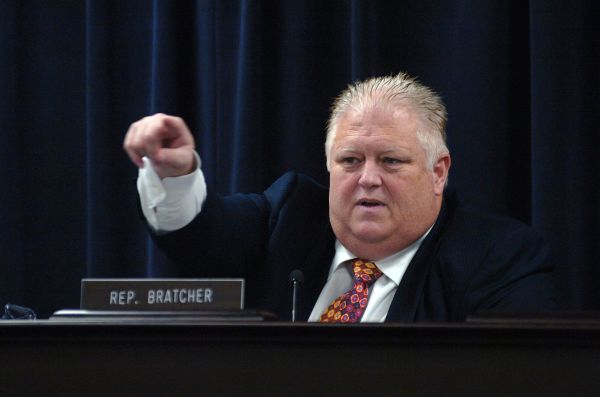 |
Rep. Kevin Bratcher, R-Louisville, comments
on HB 114. He is the chair of the House
Elections, Constitutional Amendments and
Intergovernmental Affairs Committee.
(Click
here
for a high-res photo.)
|
FRANKFORT—A scaled-down
version of an elections bill that passed the 2018 General
Assembly today cleared the House Elections, Constitutional
Amendments and Intergovernmental Affairs Committee.
House Bill 114, sponsored by
Rep. Myron Dossett, R-Pembroke, would require state and most
local candidates for public office to officially declare
their candidacy via a “statement-of-candidacy” form no later
than the last Tuesday in January preceding the general
election. The current deadline to file the form is April 1.
“There’s no cost involved in
this, and they will still have to file their official
paperwork the first Tuesday following the first Monday in
June,” said Dossett.
Similar language—although
with a different deadline proposed—was found in 2018 HB 97,
a much broader measure sponsored by former Rep. Kenny Imes,
R-Murray, that proposed new deadlines for candidates to file
nomination papers in addition to a proposed deadline change
for declaring one’s candidacy. That bill was vetoed by Gov.
Matt Bevin, who stated in his veto message that HB 97 would
create “a different standard” for local candidates.
HB 114 now goes to the full
House for consideration.
--END--
Feb. 8,
2019
This Week at the State Capitol
Feb. 5-8
Frankfort -- Family members
of the two students killed in last year’s shooting at
Marshall County High School held hands, shed tears, and
spoke bravely about their grief during this week’s Senate
Education meeting.
They came to Frankfort on
Thursday to call for safety improvements in Kentucky schools
and to deliver a simple message directly to state lawmakers:
We’re counting on you.
“We can’t protect
(children) from the world,” said Brian Cope, whose
15-year-old son, Preston, was killed in the school
shooting along with 15-year-old Bailey Holt. “But for
eight hours a day, we should be able to let our children
go to school and learn and not be looking over their
shoulders and worrying ‘Is something going to happen? Is
someone going to shoot me? Stab me?’”
“…If we can protect
government buildings, our airports, our sports stadiums, why
are we not protecting our kids?” Cope asked. “They are more
important than anything.”
Lawmakers embraced the
message. For part of last year, a specially-formed committee
travelled the state to discuss school safety and collect
feedback. Their efforts resulted in omnibus school safety
proposals filed last month in both the House and Senate. On
Thursday, the Senate proposal, known as Senate Bill 1, was
passed by the Senate Education Committee and forwarded to
the full chamber, where it was approved the next day.
The bill now goes to the
House, which itself has introduced a school safety measure,
known as House Bill 1. Giving both the Senate and House
legislation the “Bill 1” designations are clear indications
that the matter is a top priority of legislative leaders.
In sum, both the Senate and
House bills call for improving student safety on a variety
of fronts. The bills propose establishing a state school
safety marshal, conducting risk assessments, boosting safety
and prevention training, requiring superintendents to
appoint a school safety coordinator, promoting the
assignment of a school resource officer to each school,
increasing awareness of suicide prevention efforts,
encouraging collaboration with law enforcement, and, as
funds become available, hiring more counselors in school
districts. The proposals call upon the state to make an
anonymous reporting tool available to each school district.
Another legislative
highlight of the week occurred Thursday night as the Senate
and House gathered in a joint session to hear Gov. Matt
Bevin’s State of the Commonwealth Address. In a 45-minute
speech, the governor declared that Kentucky is in strong
shape as he touted accomplishments and job creation that
have occurred in recent years.
In other legislative action
this week:
-
A bill that would
ensure children in out-of-home care have visitation
opportunities with siblings who have been placed in
different homes was approved by the Senate. Senate Bill
31 now goes to the House for consideration.
-
The House Health and
Family Services Committee voted in favor of House
Concurrent Resolution 5, which calls on federal
regulators to research the benefits and risks of medical
marijuana so that state policymakers can develop
scientifically sound policies.
-
Senate Bill 70, which
would make strangulation a felony crime, was approved by
the Senate Judiciary Committee. The measure now goes to
the full Senate. If the measure becomes law, Kentucky
would join 47 other states that already have such laws.
-
The House and Family
Services Committee approved a measure that would
prohibit the use of vaping and tobacco products at
Kentucky schools. The measure now goes to the full House
for consideration.
-
The Senate approved
legislation aimed at promoting organ donation. Senate
Bill 77 would allow citizens to join Kentucky’s organ
donor registry when they log into a state website for
governmental services offered online. The bill now goes
to the House.
Citizens who would like to
offer feedback to state lawmakers on the issues under
consideration can do so by calling the General Assembly’s
toll-free message line at 1-800-372-7181.
--END--
Feb. 8,
2019
School safety measure gains Senate approval
|
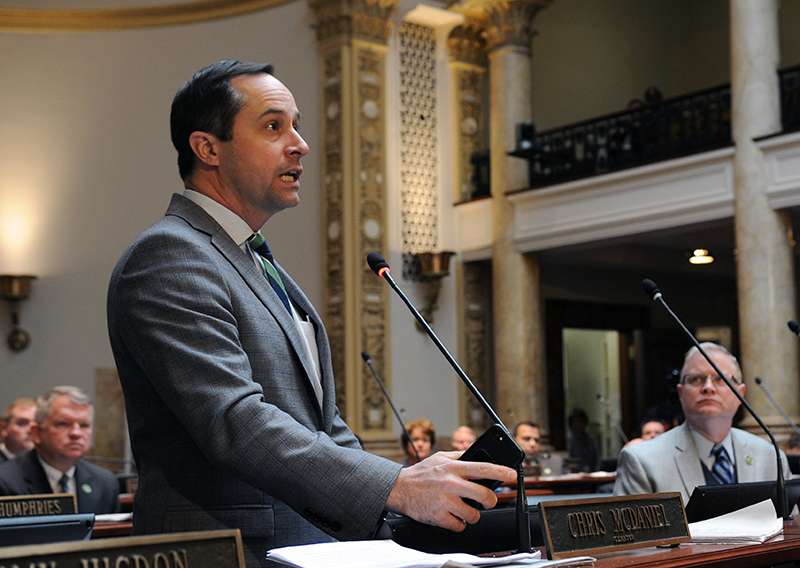 |
|
Sen Christian
McDaniel speaks about SB 1, the School
Safety and Resiliency Act, in the
Senate. |
FRANKFORT – The School
Safety and Resiliency Act – the No. 1 priority of the
General Assembly’s leadership – passed out of the Kentucky
Senate today without dissent.
The act, known as
Senate Bill 1,
is a comprehensive measure that focuses on personnel;
systems and structures; accountability; and a culture of
student connectivity, said sponsor Sen. Max Wise,
R-Campbellsville. SB 1 would create a state school safety
marshal, similar to the state fire marshal. SB 1 would also
establish the framework for schools to expand the use of
school resource officers.
“I can’t say this bill will be preventive –
that it will stop acts of evil from occurring,” Wise said,
adding that a similar bill has been introduced in the House
of Representatives. That measure, known as
House Bill 1,
has been assigned to the lower chamber’s Education
Committee.
One provision of SB 1 would
require one guidance counselor with mental health training
for every 250 students in a school, contingent on funding.
And the guidance counselors would be required to spend at
least 60 percent of their workday on counseling-related
tasks.
A second provision would
expand an anonymous school safety tip line statewide, while
a fourth would encourage districts to seek charitable
donations to pay for security-related expenses.
A fifth provision would
specify who could serve on the board for the Center for
School Safety and clarify members’ duties. The nationally
recognized center was created by the passage of House Bill
330 in 1998. That measure was in response to the Heath High
School shooting on Dec. 1, 1997, in West Paducah. Three
girls died and five other students were injured.
Wise said SB 1 was the
product of testimony, research and study over eight months
by the nonpartisan School Safety Working Group and others
who were asked to assist. Legislators formed the group in
response to the western Kentucky shooting at Marshall County
High School last winter in Benton. Earlier in the week, the
parents of the two slain students from the shooting gave
emotional testimony in support of SB 1 before the Senate
Education Committee.
“No one was shut out from
providing input,” said Wise, chairman of the education
committee. “No one was shut out from my office. No one was
shut out from having comments and feedback.”
Wise said SB 1 was just the
first step in the legislature’s efforts to improve school
safety. He said the second step would be to fund SB 1’s
various provisions during next year’s regular session of the
General Assembly. That’s when legislators are
constitutionally tasked with passing a biennium budget for
the state. Wise stressed that the bill tried to avoid
unfunded mandates that cash-strapped rural schools may not
be able to afford.
Sen. Christian McDaniel,
R-Taylor Mill, said as chairman of the Senate Appropriations
& Revenue Committee he would work to make sure provisions of
SB 1 are funded in the next biennium budget.
“We will find a way to make
the funding for this to work,” he said.
Sen. Danny Carroll,
R-Paducah, recounted his reaction after hearing of the
Marshall County High School shooting while he was in
Frankfort for legislative duties. The school is in his
district.
“I remember the feelings of
helplessness and the desire to do something immediately,” he
said. “I think we all felt those feelings that day, however,
we realized the best thing we could do was to take a step
back and to think through the decisions we were making.”
He said that “pause” has
resulted in superior legislation.
Sen. Julian M. Carroll,
D-Frankfort, voted for SB 1 but said the legislation failed
to address one underlying problem: The easy access to
unsecured guns.
“We don’t want to deal with
what to do about guns in the hands of students,” he said.
“That is one small, but absolutely critical issue. I
understand why it was not discussed because we do not like
to even use the word ‘gun’ in many of our discussions.”
C.B. Embry Jr.,
R-Morgantown, commended the bipartisan effort.
“We were working together,
and that is great,” said Embry, a co-sponsor of SB 1. “Our
children are our most precious and valuable asset that we
have in the commonwealth of Kentucky. This bill is a step in
the right direction to give them safety.”
SB 1 passed out of the
chamber by a 35-0 vote. The measure now goes to the House of
Representatives for their consideration.
-- END --
Feb. 7,
2019
Senate approves siblings’ rights bill
FRANKFORT – Children in
out-of-home care would be ensured visitation with their
siblings under a bill that was approved today in the
Kentucky Senate.
The
measure, known as
Senate Bill 31,
would do this by requiring the Cabinet for Health and Family
Services, in the case of siblings removed from their home
who are not jointly placed, to provide for frequent
visitation or other ongoing interaction between the
siblings. It passed by a 36-0 vote.
Sponsor Sen. Ralph Alvarado,
R-Winchester, said he introduced the bill after being
approached by the grandparents of a brother and sister who
said they were separated from their stepsiblings when social
workers removed all of them from their mother’s home.
Sen. Christian McDaniel,
R-Taylor Mill, stood in support of SB 31.
“As someone whose family has
lived through the pain of having to have a sibling unit
separated while they are in foster care, I can tell you that
ongoing bond between siblings is critical beyond what you
can describe,” he said. “Every adult associated with their
care should try to maintain those bonds in these worst of
situations.”
SB 31 now advances to the
House of Representatives for consideration.
-- END –
Feb. 7, 2019
Medical marijuana research resolution clears
first hurdle
FRANKFORT—A resolution
that calls on the federal government to expedite
research on the safety and effectiveness of medical
marijuana is on its way to full House for a vote.
House Concurrent Resolution
5, sponsored by Rep. Danny Bentley, R-Russell, and House
Health and Family Services Committee Chair Rep. Kimberly
Poore Moser, R-Taylor Mill, calls on federal regulators to
move forward with research into the benefits and risks of
the drug “so that, as policymakers, the General Assembly may
develop evidence-based and scientifically sound medical
marijuana policies.”
According to the
resolution, marijuana “impairs short-term memory and
judgement.” The resolution also cites evidence that suggests
“the risks of marijuana use include poorer educational
performance, adverse consequences in the workplace” and
other conditions.
Bentley, who has been a
practicing pharmacist for over four decades, told the
committee that HCR 5 is a call for safe medication
management.
“As an advanced society, we
must be have well-considered laws and regulations to move
forward,” said Bentley. Evidence-based science, he said, is
“the only safe and effective and responsible way forward.”
Thirty one states have
legalized medical marijuana in some form, according to the
resolution.
Should HCR 5 become law, it
will be forwarded to the Federal Drug Administration (FDA),
National Institute on Drug Abuse and the Drug Enforcement
Administration (DEA) for consideration.
--END--
Feb. 7,
2019
Strangulation
bill advances in Senate
|
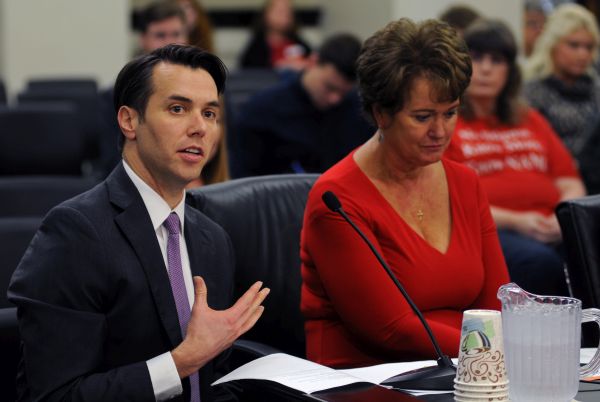 |
Sen. Morgan
McGarvey, D-Louisville, and Sen.
Alice Forgy Kerr, R-Lexington,
testify in favor
of Senate Bill 70, a
proposal to make strangulation a
felony. (Click
here
for high-res photo.) |
FRANKFORT – A Danville
woman, who survived an assault when she was a 30-year-old
graduate student in Texas, testified today in support of a
measure to make strangulation its own felony crime under
Kentucky’s criminal code.
“Seventy-two hours out from
my attack my throat swelled so much I could barely breathe,”
Nancy Ross-Stallings said while testifying before the Senate
Judiciary Committee about the assault. “I had to sit up to
sleep. I lost my voice for a number of weeks from this. I
have a permanent numb spot on the left side of my throat.”
She said if the measure, known as
Senate Bill 70,
would become law, Kentucky would join 47 other states with
similar laws. New Mexico was the most recent state to pass
such a measure. The only other states without it are Ohio
and South Carolina.
Ross-Stallings stressed that
she wasn’t talking about choking.
“Many domestic violence
victims say they have been choked,” she said. “What they
actually mean is that they have been strangled. Choking is
something that occurs when you have food, or another object,
caught in your trachea.”
Sponsor Sen. Alice Forgy
Kerr, R-Lexington, said SB 70 would also allow for the
offense of strangulation as one of the acts considered
domestic violence and abuse – a designation that can
increase prison time for perpetrators.
Fayette County
Commonwealth’s Attorney Lou Anna Red Corn said it was such a
problem that her county formed a task force to study it.
“I know many of you are
thinking ... don’t we already have laws on the books that
could cover this? The simple answer is no, we don’t,” Corn
said, adding that perpetrators are sometimes charged with
misdemeanors. “None of us would equate a slap on the face to
having someone’s hand around another person’s neck. The risk
of harm is so great when you talk about strangling another
person. It is potentially lethal and should not be treated
as a misdemeanor.”
She said it’s hard as a
prosecutor to get felony assault charges to stick in
nonlethal strangulation cases.
“The bottom line is just
this: It is currently too difficult to prosecute these cases
under Kentucky law as the law currently exists,” Corn said.
“A stand-alone statute does not create a new crime. All it
does is set clear elements for prosecutors to be able to
prosecute something that is already occurring throughout the
commonwealth.”
Kentucky Public Advocate
Damon Preston spoke in opposition to SB 70. He said if a new
law is needed the change should be part of an overall,
comprehensive criminal justice reform package. Preston said
legislators needed to stop creating new felonies at the same
time they are trying to reduce prison populations in an
overcrowded correctional system.
Rebecca DiLoreto of the
Kentucky Association of Criminal Defense Lawyers also spoke
in opposition. She said SB 70 was so broadly written that it
could be applied to situations other than domestic violence.
Sen. Morgan McGarvey,
D-Louisville, who co-sponsored SB 70, said the legislation
focuses on a major issue that needs addressing.
“This law is needed,” he
said. “We are behind as a state. It is a bill which Kentucky
can be proud of.”
The committee ultimately
approved SB 70. It now advances to the full Senate for
consideration.
-- END --
Feb. 7,
2019
House panel clears bill to
outlaw vaping, tobacco use at schools
|
|
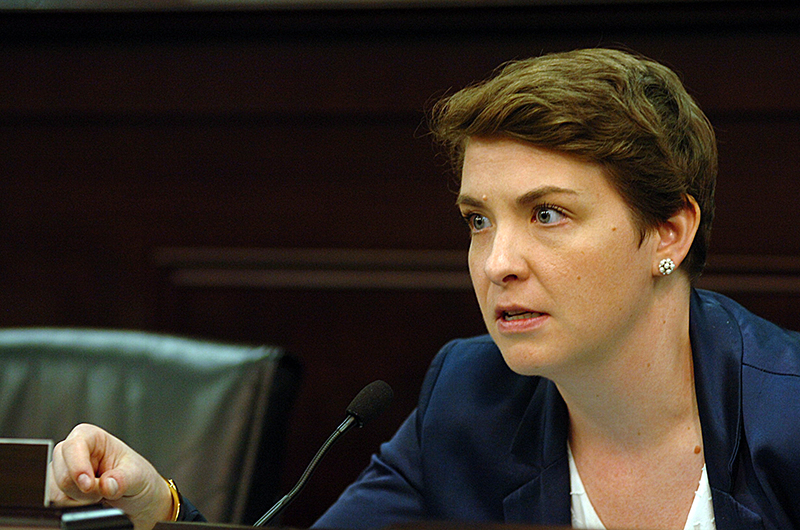 |
|
Rep.
Josie Raymond, D-Louisville, comments on student
health legislation found in House Bill 11.
(Click
here
for high-res photo.)
|
FRANKFORT—The use of
vaping and tobacco products would be outlawed at
Kentucky public schools under a bill that cleared the
House Health and Family Services committee today.
House Bill 11, sponsored by
House Health and Family Services Committee Chair Rep.
Kimberly Poore Moser, R-Taylor Mill, would prohibit
students, school personnel and visitors from vaping, smoking
or using any tobacco product on public school campuses, in
school vehicles or at school activities starting with the
2020-21 school year.
Forty-two percent of
Kentucky schools already prohibit use of tobacco and
e-cigarette products on their campuses and that policy
“should now be extended statewide,” said Moser.
“I do think that it’s very
important that we set certain expectations and set an
example for our students, as you stated, and stop
normalizing tobacco use,” Moser told a panel of health
advocates testifying in favor of HB 11.
The bill, which would only
outlaw use—not possession—of such products on school
campuses and at school events has the support of the
Kentucky School Boards Association and the Kentucky
Association of School Superintendents, said Moser.
Enforcement of the law will be up to local school boards,
per the bill.
Also supporting the bill,
Moser said, is the tobacco industry and e-cigarette company
JUUL.
“They are both behind this
bill in eliminating tobacco use on school campuses,” Moser
added.
Research shows that
e-cigarettes and vaping products are addictive and encourage
young people to become smokers later on, Foundation for a
Healthy Kentucky Vice President for External Affairs Bonnie
Hackbarth told the committee. “Remember, they’re addicted,”
Hackbarth said.
Her comments were backed up
by Paducah cardiologist Dr. Pat Withrow, who told the panel
that e-cigarettes and vaping devices like JUUL pod mods are
“full of nicotine.”
“The cool factor gets them
to pay attention to it; the smooth flavor gets them to try
it,” he said.
One in five high school
students currently use e-cigarettes in the U.S., according
to Moser. In 2018, the U.S. Federal Drug Administration
released a statement that called youth e-cigarette use an
“epidemic.”
HB 11 now goes to the full
House for its consideration.
--END--
Feb. 6,
2019
Organ donor registration expansion bill advances
FRANKFORT – A Senate panel
advanced a bill today that would allow citizens to join
Kentucky’s organ donor registry when they log into a
state website for governmental services offered online.
Senate Majority Caucus
Chair Julie Raque Adams, R-Louisville, testified that
she introduced the measure, known as
Senate Bill 77,
out of concern that Kentucky’s compliance with the
federal Real ID Act of 2005 would have the unintended
consequences of reducing the number of people placing
their name on the registry. That’s because Kentuckians
have traditionally signed up when they renew their
driver’s licenses every four years. Under the Real ID
Act, however, driver’s licenses will only have to be
renewed every eight years.
Right now, circuit court
clerks ask about one million people a year if they’d
like to register to be an organ donor, but that number
could be “sliced in half” because people won’t need to
renew their licenses so often, said Kentucky Circuit
Court Clerks’ Trust for Life Executive Director Shelley
Snyder.
Adams added that
registering is completely voluntary. More than 1.8
million Kentuckians, or about 60 percent of adults in
the state, are now registered.
“Senate Bill 77 would allow
Kentucky to lead the nation in organ donor registration
opportunities,” she said. “Would it not be nice for us
to lead in something positive and uplifting?”
The measure now advances to
the full Senate for consideration.
-- END --
Feb. 6,
2019
Public works contract bill advances to full
House
FRANKFORT—A bill that would bar public agencies
from requiring agreements between labor organizations and
public works contractors today passed the House Local
Government Committee.
Supporters of House Bill
135 say the bill would lower the cost of public works
projects and save Kentucky taxpayers money.
“As public servants, I
think it’s our duty to make sure (agencies) get the best
bids at the best price and do quality work at the same
time,” HB 135 sponsor Rep. Phillip Pratt, R-Georgetown,
told the committee. He said mandatory “project labor
agreements,” or PLAs, with labor groups limit
competition.
Pratt’s bill is supported
by Ben Brubek, a representative from Associated Builders
and Contractors, Inc. – a national association that
supports “merit” contractors who are mostly non-union.
Brubek told the committee that PLAs typically increase
construction costs by as much as 18 percent.
Opponents to HB 135 say the
bill, if passed, could affect the quality of future
large-scale, high-skill projects. Larry Roberts, a
former director for the Kentucky State Building and
Construction Trades Council, told the panel that PLAs
benefit construction projects by ensuring local, trained
workers including minorities and women—who Roberts said
are often sought by public sector projects —are included
in those projects.
“That’s a type of benefit
that you derive out of having a project labor agreement
because … apprenticeship and training in the
construction industry is very critical,” said Roberts.
Building trades groups in Kentucky, he said, invest over
$10 million per year in apprenticeship and other
training programs.
Roberts went on to say that
there are no mandatory PLAs in existence in Kentucky. Of
the public works-related PLAs that have been signed,
Roberts said “100 percent of those contractors were not
union contractors nor were they required to join and
sign a contract with a union.”
Committee Chair Rep.
Michael Meredith, R-Oakland, asked if anything in HB 135
would prevent contractors from entering into voluntary
PLAs. Roberts said there is not.
Rep. Stan Lee, R-Lexington,
said he thinks the bill sounds like wise policy.
“I’m here trying to serve
the members of my district and the taxpayers, quite
frankly, all over the state. And it’s my understanding
based on my reading of this legislation that it would
save the taxpayers’ money … whenever we have the
opportunity to do that, I think it’s wise to move
forward in that regard,” said Lee.
Twenty four other states
have passed legislation similar to HB 135, which now
goes to the full House for its consideration.
--END--
Feb. 6,
2019
Senate panel advances siblings’ rights bill
FRANKFORT – A bill, which
would ensure children in out-of-home care have
visitation with their siblings, passed out of the Senate
Health & Welfare Committee today.
Patricia Fitzgerald of
Winchester testified that the measure, known as
Senate Bill 31,
would have allowed her two grandchildren, whom are in
her and her husband’s care, to see their stepsiblings on
a regular basis. The stepsiblings have been placed in
another home by the state.
Committee Chairman Sen.
Ralph Alvarado, R-Winchester, said he introduced SB 31
after being contacted by the Fitzgeralds. Alvarado
explained that it would allow siblings under state
custody, who were removed from their home, and, who are
not jointly placed, to have visitation rights unless the
cabinet determines there is a safety concern.
Health and Family Services
Cabinet Secretary Adam Meier testified that his agency
supported the bill.
Senate Majority Caucus
Chair Julie Raque Adams, R-Louisville, said SB 31 was an
excellent bill she would support.
“It is such a common-sense
approach,” she said. “It is almost sad we have to have a
law to allow siblings to visit each other.”
Sen. Alice Forgy Kerr,
R-Lexington, thanked Fitzgerald for putting a face to
the problem when explaining why she supported SB 31.
“We get it when we see
you,” Kerr said to Fitzgerald. “Not only are you helping
your family, but you are also going to be helping a lot
of families and a lot of kids in Kentucky. Thank you for
coming. You are very courageous.”
Committee Vice Chairman
Sen. Stephen Meredith, R-Leitchfield, alluded to the
growing ranks of Kentucky grandparents caring for
children whose own parents can’t, most often because of
drugs, alcohol or mental illness, when voting for SB 31.
“A lot of people in this
commonwealth are blessed because grandparents are
stepping up to fill the rolls that parents have
traditionally done,” Meredith said. “Anything we can do
to help grandparents during these turbulent times ... we
are interested in doing.”
SB 31 now advances to the
full Senate for consideration.
-- END --
Jan. 11,
2019
Citizens invited to share comments with Public
Pensions Working Group
FRANKFORT -- Kentuckians
can share their comments about the state’s public
pension systems with state lawmakers serving on a newly
formed Public Pensions Working Group by emailing
messages to PublicPensions@lrc.ky.gov.
The working group, which
was created by co-chairs of the Legislative Research
Commission (LRC), pending ratification of the full LRC,
will conduct a review of the systems' structure, costs,
benefits, and funding.
The group's first meeting
will be held on Tuesday, Jan. 15, at 9:30 a.m. in Rm.
154 of the Capitol Annex.
Information about the
working group, including its membership, is available
here.
--END--
Jan. 11, 2019
Legislative leaders create Public Pensions
Working Group
FRANKFORT – The Kentucky
General Assembly has formed a Public Pensions Working
Group to review and analyze the state’s public pension
systems.
The working group, which
was created by co-chairs of the Legislative Research
Commission (LRC), pending ratification of the full LRC,
will conduct a review of the systems’ structure, costs,
benefits, and funding.
The group’s first meeting
will be held on Tuesday, Jan. 15, at 9:30 a.m. in Rm.
154 of the Capitol Annex.
The panel will be
co-chaired by Sen. Wil Schroder, R-Wilder, and Rep.
Jerry Miller, R-Louisville.
Other members are: Senate
President Robert Stivers, R-Manchester; Senate Majority
Floor Leader Damon Thayer, R-Georgetown; Sen. Jimmy
Higdon, R-Lebanon; Sen. Christian McDaniel, R-Taylor
Mill; Senate Minority Floor Leader Morgan McGarvey,
D-Louisville; Senate Minority Caucus Chair Johnny Ray
Turner, D-Prestonsburg; House Minority Caucus Chair
Derrick Graham, D-Frankfort; Rep. R. Travis Brenda,
R-Crab Orchard; Rep. Jim DuPlessis, R-Elizabethtown;
Rep. Scott Lewis, R-Hartford; Rep. Diane St. Onge,
R-Fort Wright; and Rep. Buddy Wheatley, D-Covington.
The working group is
authorized to meet as often as necessary at the
discretion of the co-chairs during the current General
Assembly session, up to March 30, and, if necessary, can
meet monthly during the 2019 legislative interim through
Dec. 30.
The group is charged with
making recommendations for General Assembly action by
Feb. 15, although the group’s co-chairs can request an
extension until March 1, if needed. If even more time is
needed to gather information before making
recommendations, the co-chairs can submit an additional
request for an extension to Dec. 1.
--END--
Jan. 11, 2019
This Week at the State Capitol
Kentucky General Assembly wraps up first week of
2019 session
FRANKFORT -- As usual, the
excitement of the opening day of a Kentucky General
Assembly session was evident on Tuesday amid the packed
crowds, broad smiles, and welcoming handshakes
throughout the State Capitol.
But the spirit of the day
might have been most clearly revealed in the trembling
voices of some new lawmakers the first time they offered
public comments in legislative chambers. The mix of
nerves, emotion, and deep gratitude they expressed while
welcoming family and friends to their swearing-in day
showed how humbling it is to be entrusted with a chance
to help write a new chapter in Kentucky history.
Besides swearing in new
members, the first week of the session gave lawmakers a
chance to handle organizational matters such as adopting
rules of procedure, organizing committees, and electing
legislative leaders.
A top leadership change
took place in the House, where Speaker David Osborne,
R-Prospect, was elected to his first term in the
chamber’s top job. Though officially new to the
position, the role is a familiar one to Osborne since he
presided over the House chamber while serving as Speaker
Pro Tempore last year while the Speaker’s position was
vacant.
Rep. David Meade,
R-Stanford, was chosen as the House Speaker Pro Tempore.
Republicans and Democrats
also announced their caucus leaders. Rep. John Bam
Carney, R-Campbellsville, is the new House Majority
Floor Leader. Rep. Suzanne Miles, R-Owensboro, was
selected as the House Majority Caucus Chair and Rep.
Chad McCoy, R-Bardstown, is the House Majority Whip.
House Minority Floor Leader
Rocky Adkins, D-Sandy Hook, will continue serving in his
position. Rep. Derrick Graham, D-Frankfort, is the new
House Minority Caucus Chair and Rep. Joni Jenkins,
D-Shively, is the new House Minority Whip.
In the Senate, President
Robert Stivers, R-Manchester, was reelected as President
and Sen. David Givens, R-Greensburg, was selected as the
chamber’s President Pro Tempore.
Senate Majority Floor
Leader Damon Thayer, R-Georgetown, returns to his
position, as does Senate Majority Whip Mike Wilson,
R-Bowling Green. Sen. Julie Raque Adams, R-Louisville,
was announced as the new Senate Majority Caucus Chair.
Sen. Morgan McGarvey,
D-Louisville, was announced as the new Senate Minority
Floor Leader. Sen. Johnny Ray Turner, D-Prestonsburg,
serves as Senate Minority Caucus Chair and Sen. Dennis
Parrett, D-Elizabethtown, serves as Senate Minority
Whip.
Besides handling leader
elections and other organizational matters, lawmakers
have also started introducing bills. More than 200 of
them have been filed so far to begin their journeys
through the process.
One piece of legislation
off to a quick start, Senate Bill 5, has already become
the first bill this year to gain approval from a
chamber. The legislation, which was passed on Thursday
on a 31-4 vote in the Senate, proposes a constitutional
amendment that would move the elections for Kentucky
governor and lieutenant governor to even-numbered years
every four years. The elections for state auditor,
attorney general, secretary of state, and commissioner
of agriculture would also move to the same schedule.
SB 5 now goes to the House
for consideration. If approved there, Kentucky voters
will vote on the matter, as is the case for all proposed
constitutional amendments.
In addition to elections,
other topics that might receive attention in this year’s
session include school safety, sports betting, public
pension reform, bail reform, medical marijuana, charter
school funding, and many other matters.
Lawmakers are now returning
to their home districts. As outlined by the
constitution, the Senate and House adjourn after
completing the first part of the session and enter a
recess period until lawmakers return to the State
Capitol on the first Tuesday in February for the rest of
this year’s 30-day session.
There are many ways to keep
in touch with the legislative process. All the bills
lawmakers are voting on can be reviewed in the online
Legislative Record at
http://www.lrc.ky.gov/record/19RS/record.html.
You can share your views on
the issues with lawmakers by calling the General
Assembly’s toll-free message line at 1-800-372-7181.
--END--
Jan. 11,
2019
Campaign finance reporting bill moves to House
FRANKFORT – The state
Senate passed legislation today that supporters said
would bring additional transparency, accountability and
integrity to Kentucky’s electoral process.
Known as Senate Bill 4, the
measure passed by a 34-2 vote. It would require
mandatory electronic filing of all candidates’ campaign
finance reports by the May 2020 primaries, a process
often referred to as e-filing. Currently, the only
candidates that have to e-file are those who are running
for statewide constitutional offices. Those offices are
for governor, lieutenant governor, treasurer, auditor of
public accounts, attorney general, secretary of state
and commissioner of agriculture.
“Here we are 19 years into
the 21st century,” said Senate Majority Floor Leader
Damon Thayer, R-Georgetown. “It is time we use the
technology available to update our reporting mechanism
so the public can see where candidates raise money and
how they spend it.”
He said SB 4 is aligned
with the legislative intent of a $1.8 million
appropriation to the Kentucky Registry of Election
Finance to replace its two-decade-old e-filing software.
Thayer said the new software would allow for real-time
filing via an application on smartphones and other
devices.
Thayer, who sponsored SB 4,
said the need for the law was illustrated during the
last general election. That was when only 106 of the
1,559 candidates running for various offices across
Kentucky e-filed.
Thayer added that the
deluge of paper filings overwhelmed the registry’s 12
employees. He said that caused delays in the information
being entered into the registry’s public database. As
the paperwork piled up, Thayer said it went unnoticed
that some candidates were not even filing the required
finance reports.
In voting against SB 4,
Sen. Robin L. Webb, D-Grayson, expressed concern that
candidates in rural mountainous areas of Kentucky do not
always have access to dependable internet and mobile
phone service necessary for e-filing.
Thayer said he has tried to
eliminate Webb’s concerns through a provision in SB 4
that would allow candidates to manually enter the
information into computers at the registry’s office. The
information could also be provided on an
electronic-storage device such as a thumb drive.
Thayer added that SB 4
contains an exemption for candidates who raise less than
$3,000.
SB 4 now goes to the state
House of Representatives for consideration.
-- END --
Jan. 10,
2019
Proposed election date change heads to House
FRANKFORT – A bill that would move
the governor’s race to even-numbered years passed out of
the state Senate today, making it the first measure to
clear the chamber this session.
The measure, known as Senate Bill
5, is a proposed state constitutional amendment to move
to even-numbered years the elections of statewide
constitutional offices. In addition to the governor,
those would include the campaigns for treasurer, auditor
of public accounts, attorney general, secretary of state
and commissioner of agriculture. SB 5 passed by a 31-4
vote.
Sen. Christian McDaniel, R-Taylor
Mill, said he sponsored SB 5 because, in part, it would
save about $15 million in taxpayer money by
consolidating the dates elections are held. As it stands
now, Kentucky has three statewide elections each
four-year cycle. Two of those elections follow the
national cycle of congressional and presidential races
in even years. Tucked between those are the races for
statewide constitutional offices.
“It’s a good bill financially,”
McDaniel said, adding similar measures had passed out of
the chamber five prior times in the past decade. “Senate
Bill 5 is certainly no stranger to this body.”
When voting for SB 5, Sen. Wil
Schroder, D-Wilder, predicted the change could almost
double voter participation in down-ballot races by
aligning Kentucky’s election cycle with presidential
elections. He noted that only 31 percent of Kentucky
voters cast ballots in the last gubernatorial election
compared to 60 percent the following year in the
presidential election.
Sen. Robin L. Webb, D-Grayson,
explained her vote against SB 5. She said she feared
aligning Kentucky’s election cycle with presidential
elections would cause voters to attribute national
issues to the state race.
“Kentucky needs to be allowed to
focus on Kentucky issues and set aside the national fray
... that sometimes are not as relatable to the
Commonwealth and its issues and its people,” she said.
Senate Minority Floor Leader Morgan
McGarvey, D-Louisville, applauded the stated goals of SB
5 when voting for the bill. He added that if the
constitution is ultimately amended, he hopes the savings
would go toward expanding early voting or extending
voting hours across the state.
“Kentucky is one of the three
states in the country whose polls close at 6 p.m.,”
McGarvey said.
The bill now goes to the House of
Representatives for consideration. Even if the General
Assembly passed SB 5 this session, the proposed
constitutional amendment would not be placed on the
ballot to be decided upon by the people until 2020.
-- END --
Top
|